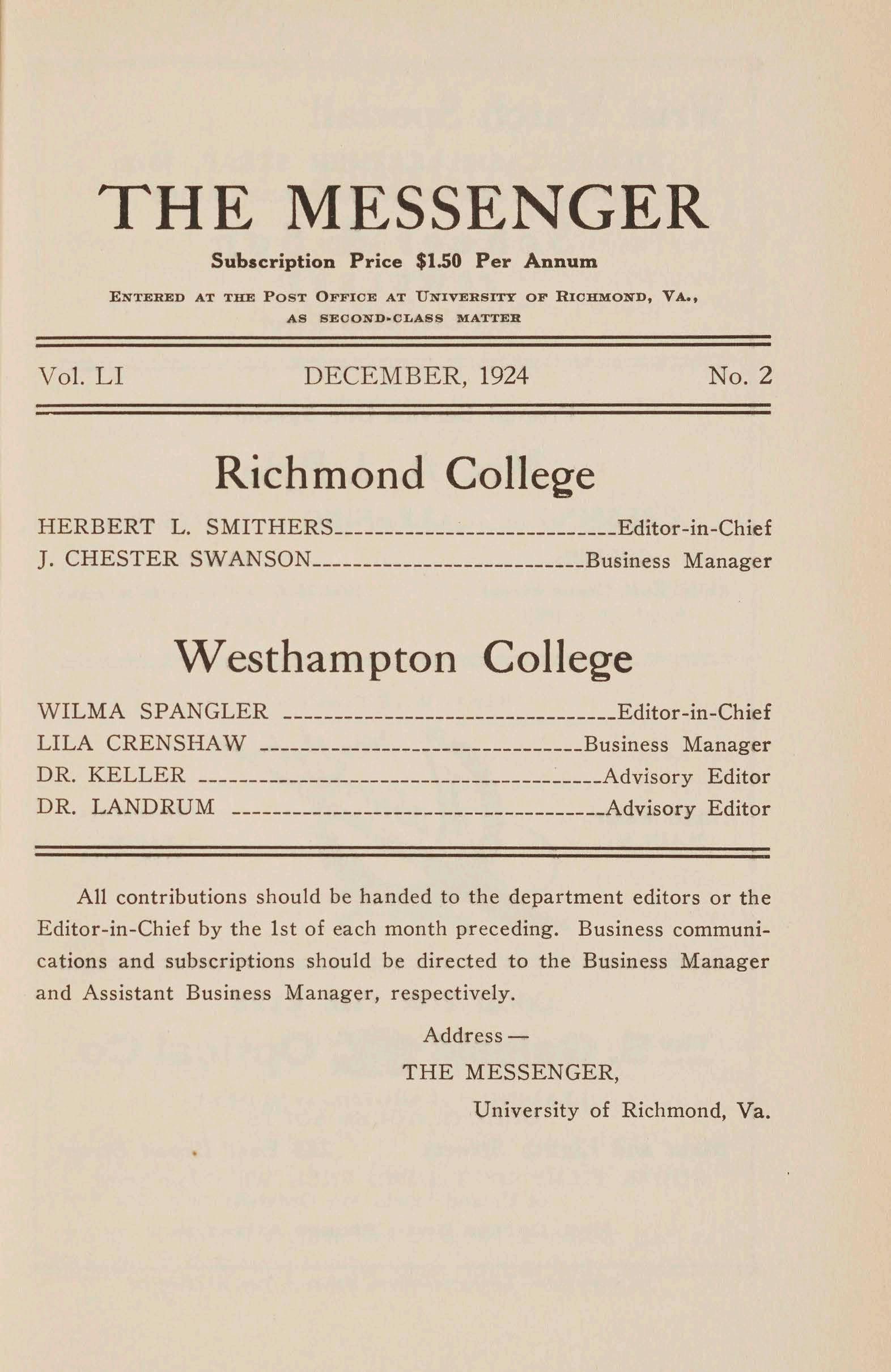

THE MESSENGER
Richmond Colleee No. 2
HERBERT L. SMITHERS ____________________________ Editor-in-Chief
J. CHESTER SWANSON ___________________________Business Manager
Westhampton College
WILMA SPANGLER _________________________________ Editor-in-Chief
LILA CRENSHAW ________________________________Business Manager
DR. KELLER ________________________________________Advisory Editor
DR. LANDRUM -------------------------------------Advisory Editor
All contributions should be handed to the department editors or the Editor-in-Chief by the 1st of each month preceding. Business communications and subscriptions should be directed to the Business Manager and Assistant Business Manager, respectively. Address-
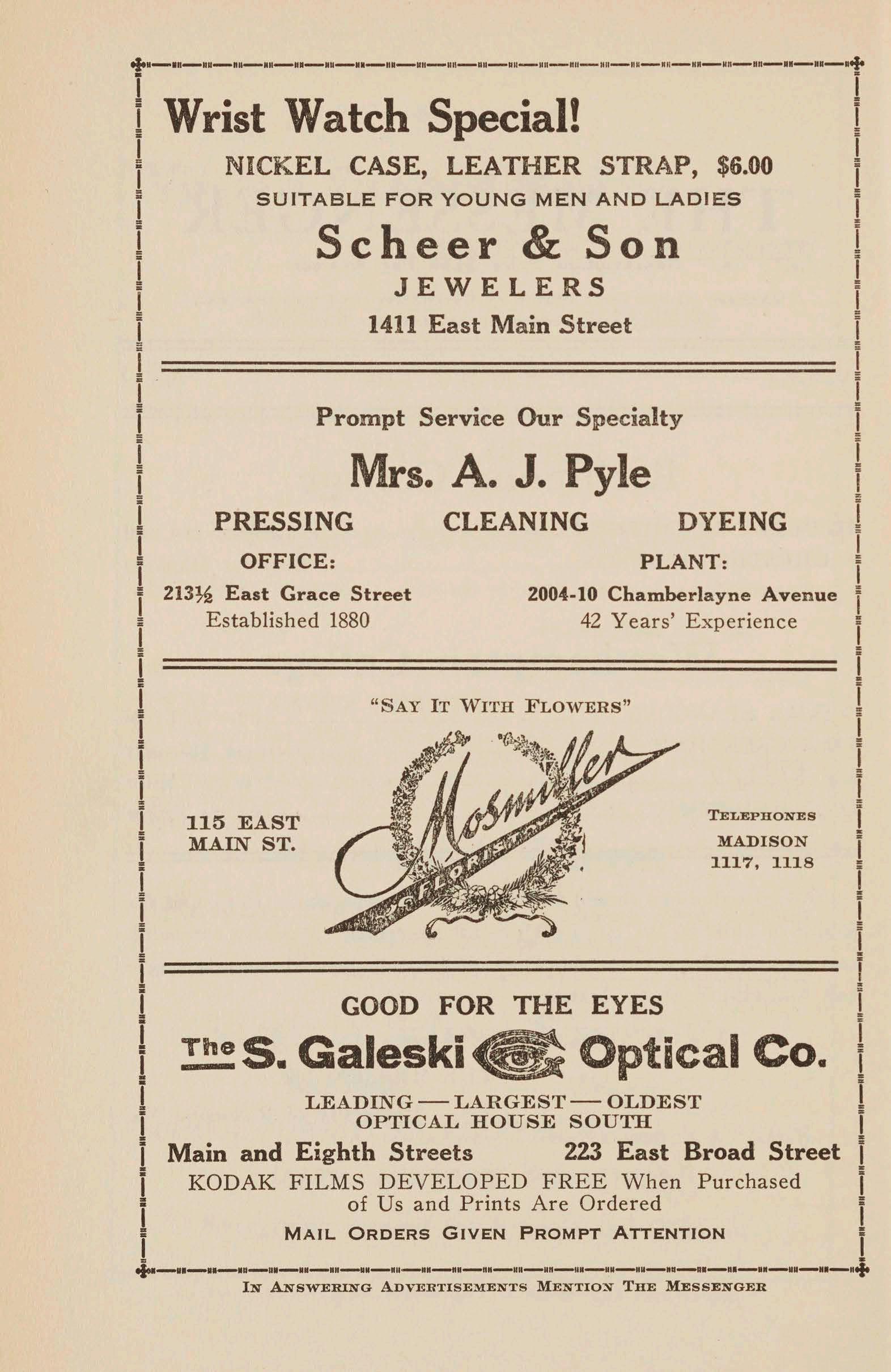
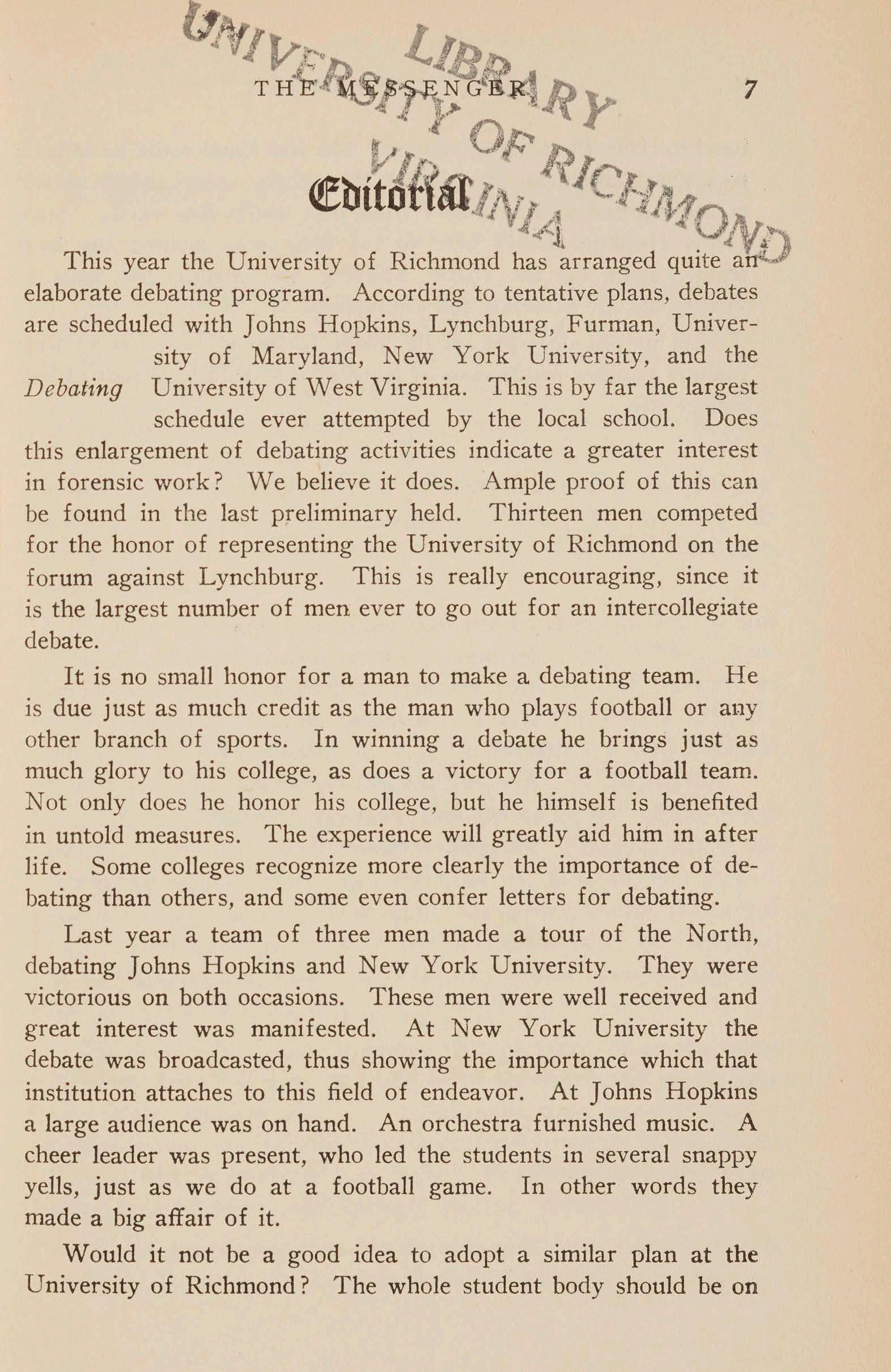
This year the University of Richmond has arranged quite an 4 elaborate debating program. According to tentative plans, debates are scheduled with Johns Hopkins, Lynchburg, Furman, University of Maryland, New York University, and the Debating University of West Virginia. This is by far the largest schedule ever attempted by the local school. Does this enlargement of debating activities indicate a greater interest in forensic work? We believe it does. Ample proof of this can be found in the last preliminary held. Thirteen men competed for the honor of representing the University of Richmond on the forum against Lynchburg. This is really encouraging, since it is the largest number of men ever to go out for an intercollegiate debate.
It is no small honor for a man to make a debating team. He is due just as much credit as the man who plays football or any other branch of sports. In winning a debate he brings just as much glory to his college, as does a victory for a football team. Not only does he honor his college, but he himself is benefited in untold measures. The experience will greatly aid him in after life. Some colleges recognize more clearly the importance of debating than others, and some even confer letters for debating.
Last year a team of three men made a tour of the North, debating Johns Hopkins and New York University. They were victorious on both occasions. These men were well received and great interest was manifested. At New York University the debate was broadcasted, thus showing the importance which that institution attaches to this field of endeavor. At Johns Hopkins a large audience was on hand. An orchestra furnished music. A cheer leader was present, who led the students in several snappy yells, just as we do at a football game. In other words they made a big affair of it.
Would it not be a good idea to adopt a similar plan at the University of Richmond? The whole student body should be on
hand to cheer the team to victory. The Rat Band could be utilized to a great advantage by playing the college songs, which would create a different atmosphere from that which now exists. Soon Johns Hopkins comes here to pit their wits against the local team. Let's fill the chapel building and inspire the team to victory by our presence and enthusiasm.
Let us put debating on the plane it should Le. Let us look upon it as other institutions of learning do-as a vital part of our college life.
-H. L. S.
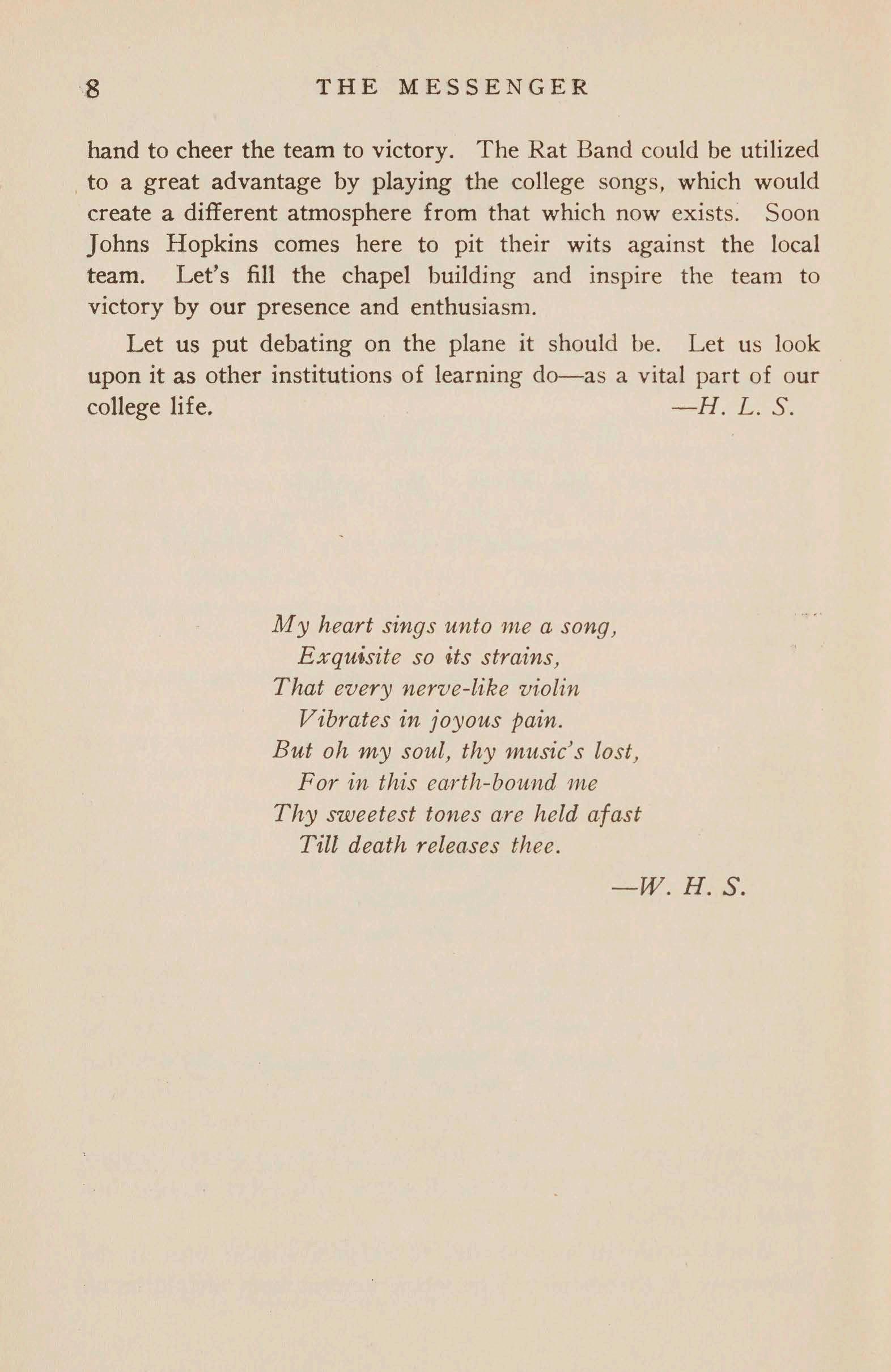
My heart sings unto me a song , Exquisite so its strains, That every nerve-like violin Vibrates in joyous pain.
But oh my soul, thy music's lost , For in this earth-bound 11-ie Thy sweetest tones are held afast Till death releases thee.
-W.H.S.
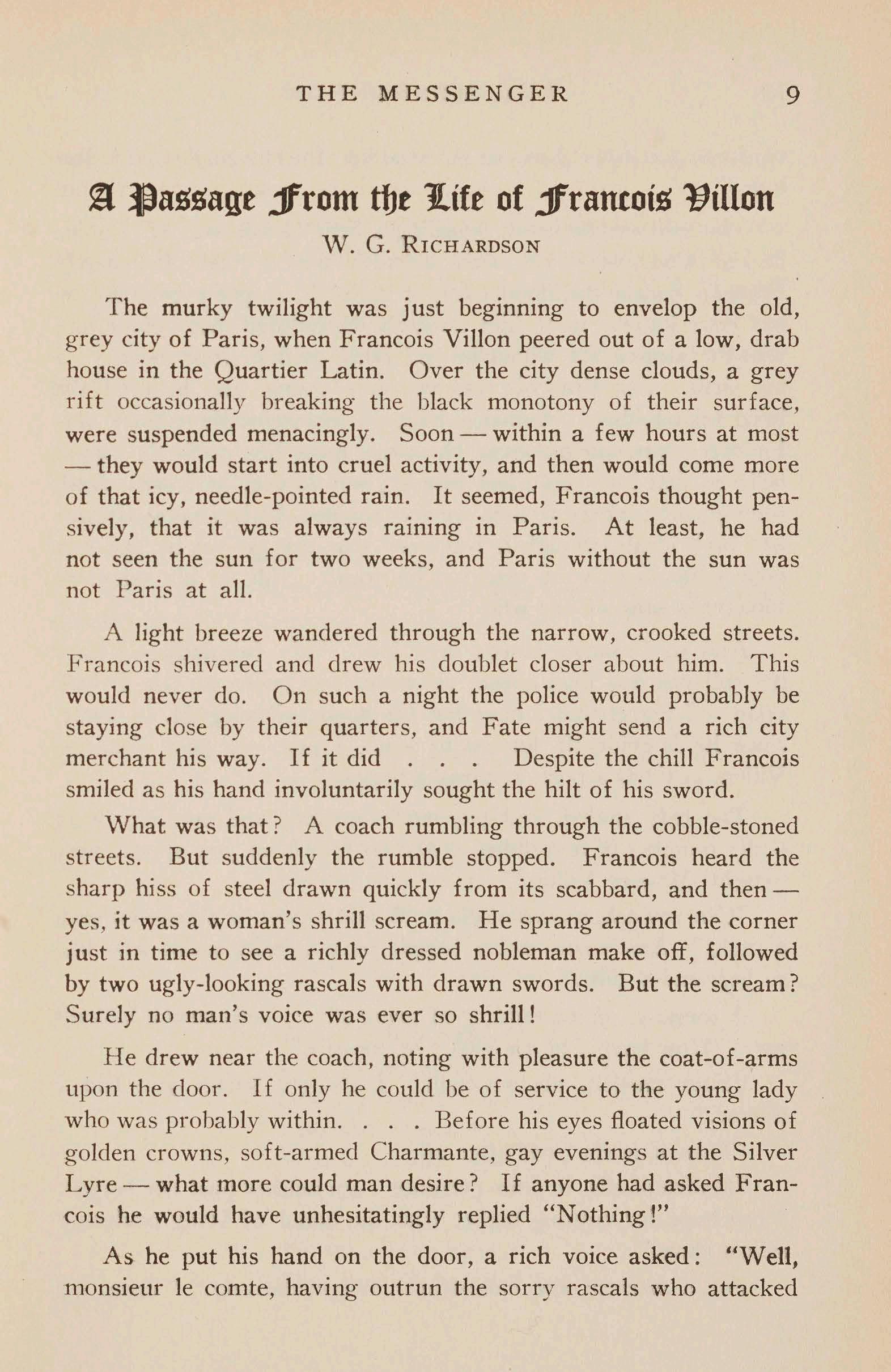
~assagt jfrom tbt JLiftof jfrancoisl'illon
w. G. RICHARDSON
The murky twilight was just beginning to envelop the old, grey city of Paris, when Francois Villon peered out of a low, drab house in the Quartier Latin. Over the city dense clouds, a grey rift occasionally breaking the black monotony of their surface, were suspended menacingly. Soon -within a few hours at most - they would start into cruel activity, and then would come more of that icy, needle-pointed rain. It seemed, Francois thought pensively, that it was always raining in Paris. At least, he had not seen the sun for two weeks, and Paris without the sun was not Paris at all.
A light breeze wandered through the narrow, crooked streets. Francois shivered and drew his doublet closer about him. This would never do. On such a night the police would probably be staying close by their quarters, and Fate might send a rich city merchant his way. If it did Despite the chill Francois smiled as his hand involuntarily sought the hilt of his sword.
What was that? A coach rumbling through the cobble-stoned streets. But suddenly the rumble stopped. Francois heard the sharp hiss of steel drawn quickly from its scabbard, and thenyes, it was a woman's shrill scream. He sprang around the corner just in time to see a richly dressed nobleman make off, followed by two ugly-looking rascals with drawn swords. But the scream? Surely no man's voice was ever so shrill!
He drew near the coach, noting with pleasure the coat-of-arms upon the door. If only he could be of service to the young lady who was probably within. . . . Before his eyes floated visions of golden crowns, so£t-armed Charmante, gay evenings at the Silver Lyre - what more could man desire? If anyone had asked Francois he would have unhesitatingly replied "Nothing !"
As he put his hand on the door, a rich voice asked : "Well, monsieur le comte, having outrun the sorry rascals who attacked
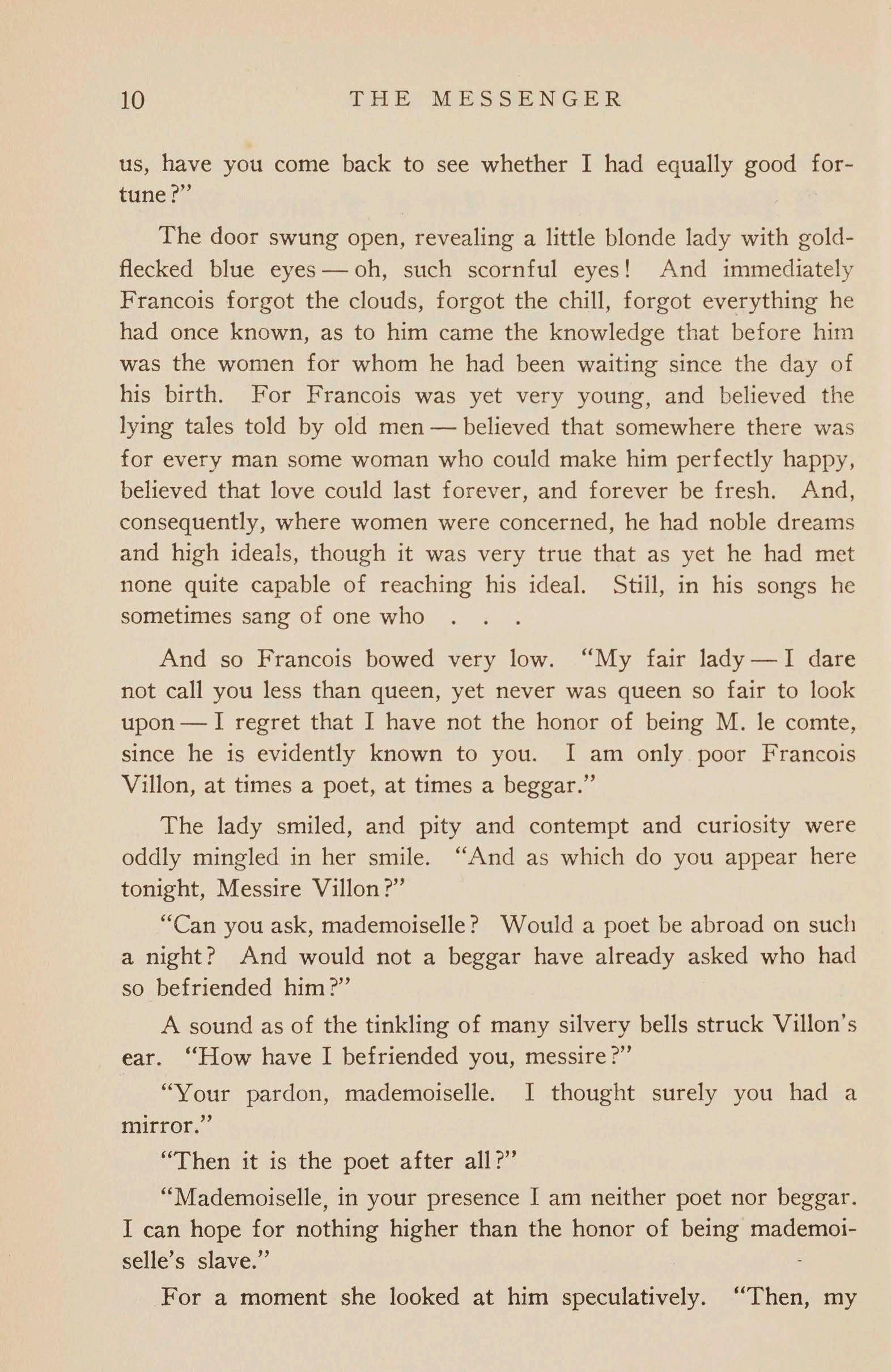
us, have you come back to see whether I had equally good fortune?"
The door swung open, revealing a little blonde lady with goldflecked blue eyes - oh, such scornful eyes! A nd immediatel y Francois forgot the clouds, forgot the chill, forgot everything h e had once known, as to him came the knowledge that before him was the women for whom he had been waiting since the day of his birth. For Francois was yet very young, and believed the lying tales told by old men - believed that somewhere there was for every man some woman who could make him perfectly happy, believed that love could last forever, and forever be fresh. And, consequently, where women were concerned, he had noble dreams and high ideals, though it was very true that as yet he had met none quite capable of reaching his ideal. Still, in his songs he sometimes sang of one who
And so Francois bowed very low. "My fair lady-I dare not call you less than queen, yet never was queen so fair to look upon-I regret that I have not the honor of being M. le comte, since he is evidently known to you. I am only poor Francois Villon, at times a poet, at times a beggar."
The lady smiled, and pity and contempt and curiosity were oddly mingled in her smile. "And as which do you appear here tonight, Messire Villon?"
"Can you ask, mademoiselle? Would a poet be abroad on such a night? And would not a beggar have already asked who had so befriended him?"
A sound as of the tinkling of many silvery bells struck Villon's ear. "How have I befriended you, messire ?"
"Your pardon, mademoiselle. I thought surely you had a mirror."
"Then it is the poet after all?"
"Mademoiselle, in your presence I am neither poet nor beggar. I can hope for nothing higher than the honor of being mademoiselle's slave."
For a moment she looked at him speculatively. "Then, my
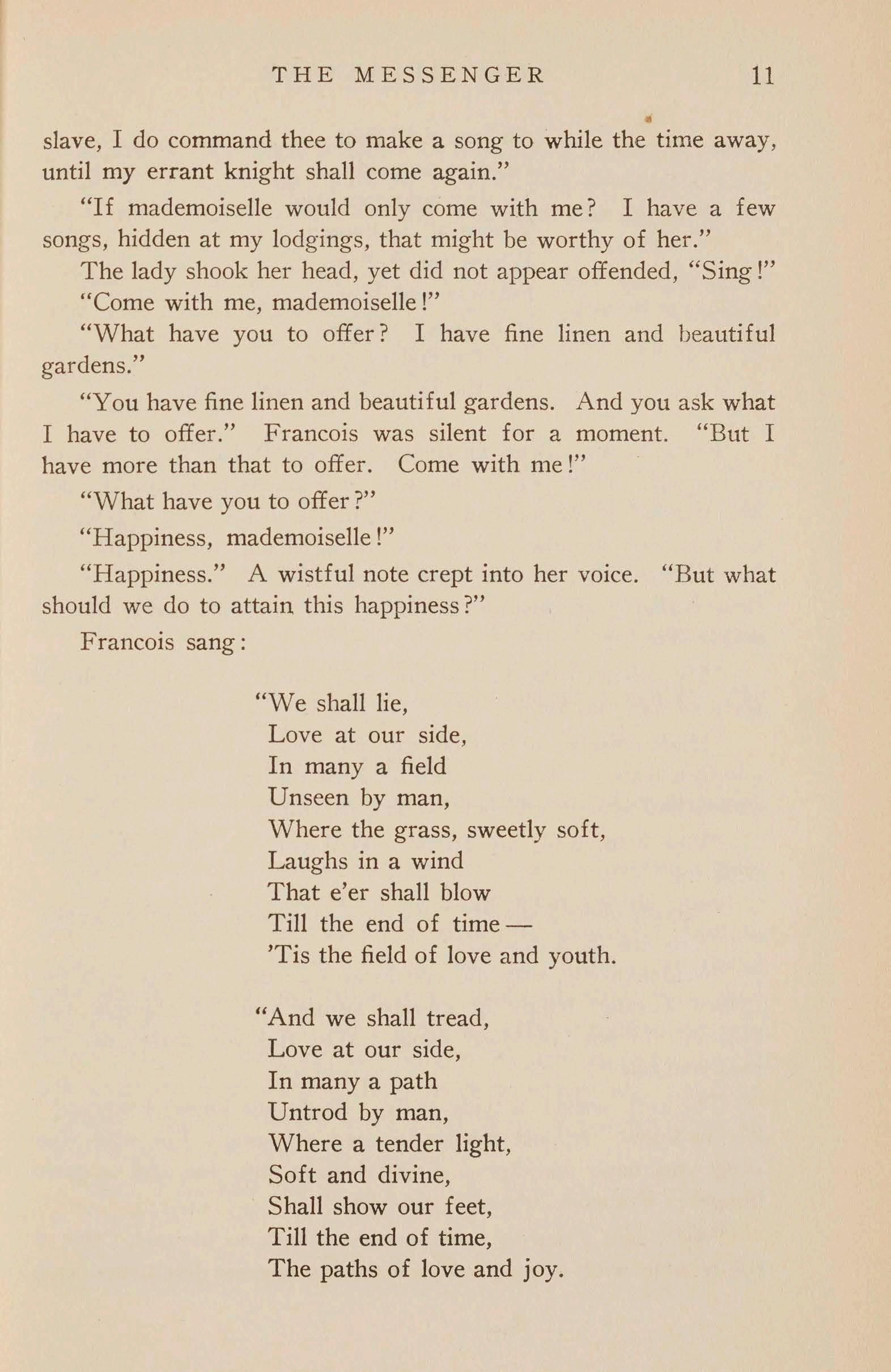
slave, I do command thee to make a song to while the time away, until my errant knight shall come again."
"If mademoiselle would only come with me? I have a few songs, hidden at my lodgings, that might be worthy of her."
The lady shook her head, yet did not appear offended, "Sing!"
"Come with me, mademoiselle!"
"What have you to offer? I have fine linen and beautiful gardens."
"You have fine linen and beautiful gardens. And you ask what I have to offer." Francois was silent for a moment. "But I have more than that to offer. Come with me!"
"What have you to offer?"
"Happiness, mademoiselle!"
"Happiness." A wistful note crept into her voice. "But what should we do to attain this happiness?"
Francois sang :
"We shall lie, Love at our side, In many a field
Unseen by man, Where the grass, sweetly soft, Laughs in a wind
That e'er shall blow Till the end of time'Tis the field of love and youth.
"And we shall tread, Love at our side, In many a path
Untrod by man, Where a tender light, So£t and divine, Shall show our feet, Till the end of time, The paths of love and joy.
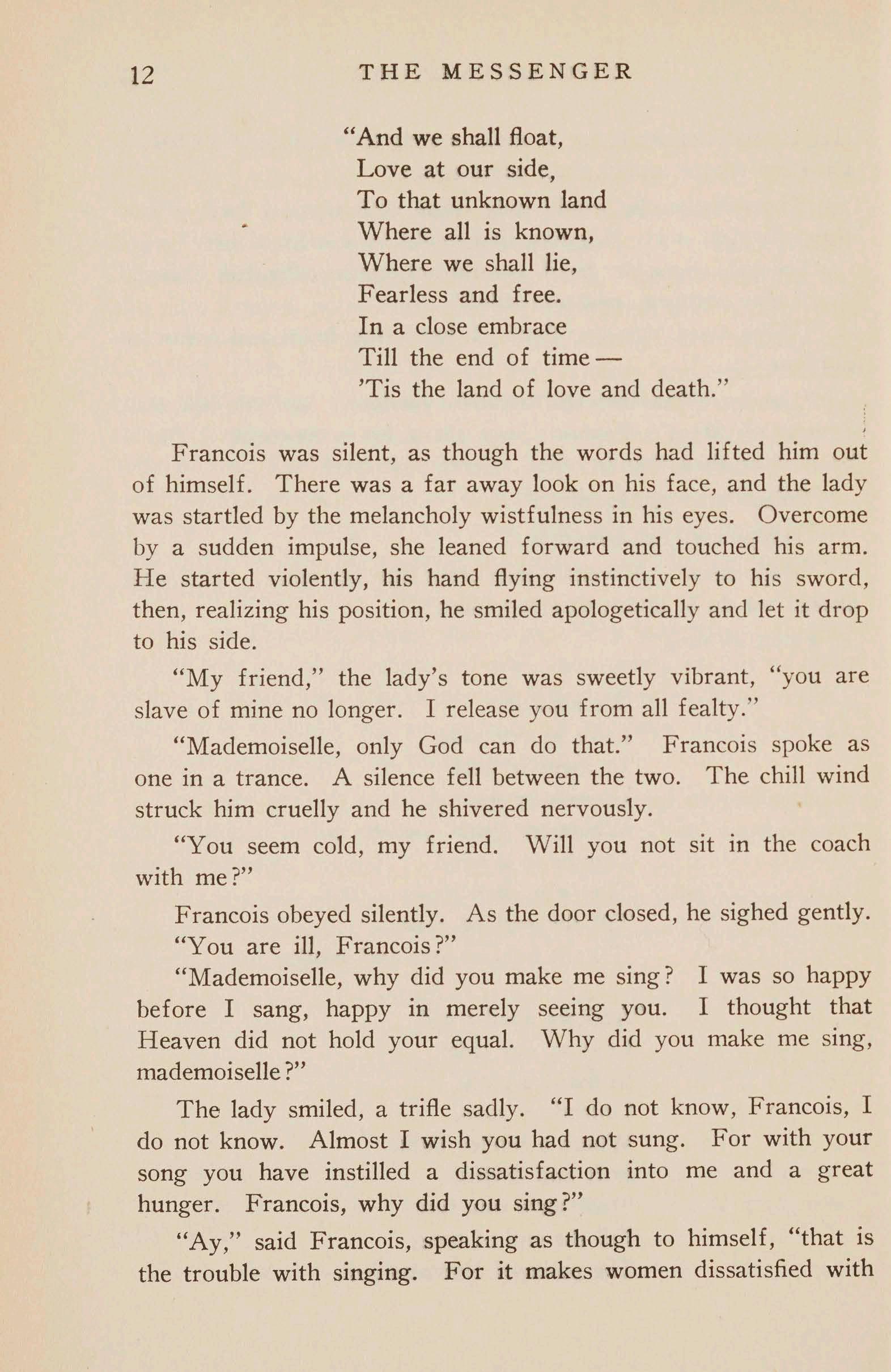
"And we shall float, Love at our side, To that unknown land Where all is known, Where we shall lie, Fearless and free. In a close embrace
Till the end of time' Tis the land of love and death. "
Francois was silent , as though the words had lifted him out o f him self. There was a far away look on his face , and the lady wa s startled by the melancholy wistfulness in hi s eyes. Overcome by a sudden impulse, she leaned forward and touched his arm. He started violently, his hand flying instinctively to hi s sword, then , realizing his po sition, he smiled apologeticall y and let it drop to his side.
"My friend," the lady's tone was sweetly vibrant, "you are slave of mine no longer. I release y ou from all fealty. "
"Mademoiselle, only God can do that." Francoi s spoke as one in a trance. A silence fell between the two. The chill wind struck him cruelly and he shivered nervously.
"You seem cold , my friend. Will you not sit in the coach with me?"
Francois obeyed silently. As the door closed , he sighed gently.
"You are ill, Francois?"
"Mademoiselle, why did you make me sing? I was so happy before I sang, happy in merely seeing you. I thought that Heaven did not hold your equal. Why did you make me sing , mademoiselle ?"
The lady smiled, a trifle sadly. "I do not know, Francois, I do not know. Almost I wish you had not sung. For with your song you have instilled a dissatisfaction into me and a great hunger. Francois, why did you sing?"
"Ay," said Francois, speaking as though to himself, "that is the trouble with singing. For it makes women dissatisfied with
mortal lovers, and disgusts man with woman. And that is a very sad thing. For man was made for woman, and woman for man. But if they become dissatisfied and disgusted the one with the other "
"Are you disgusted with me, Francois?" The women spoke softly and almost tenderly , and in her voice were all the semitones and all the cadences that make men tremble with the fear and the desire of they know not what.
"Mademoiselle -"
"Call me Angelique."
"Angelique, after I sing
"Yes, Francois, after you alluringly.
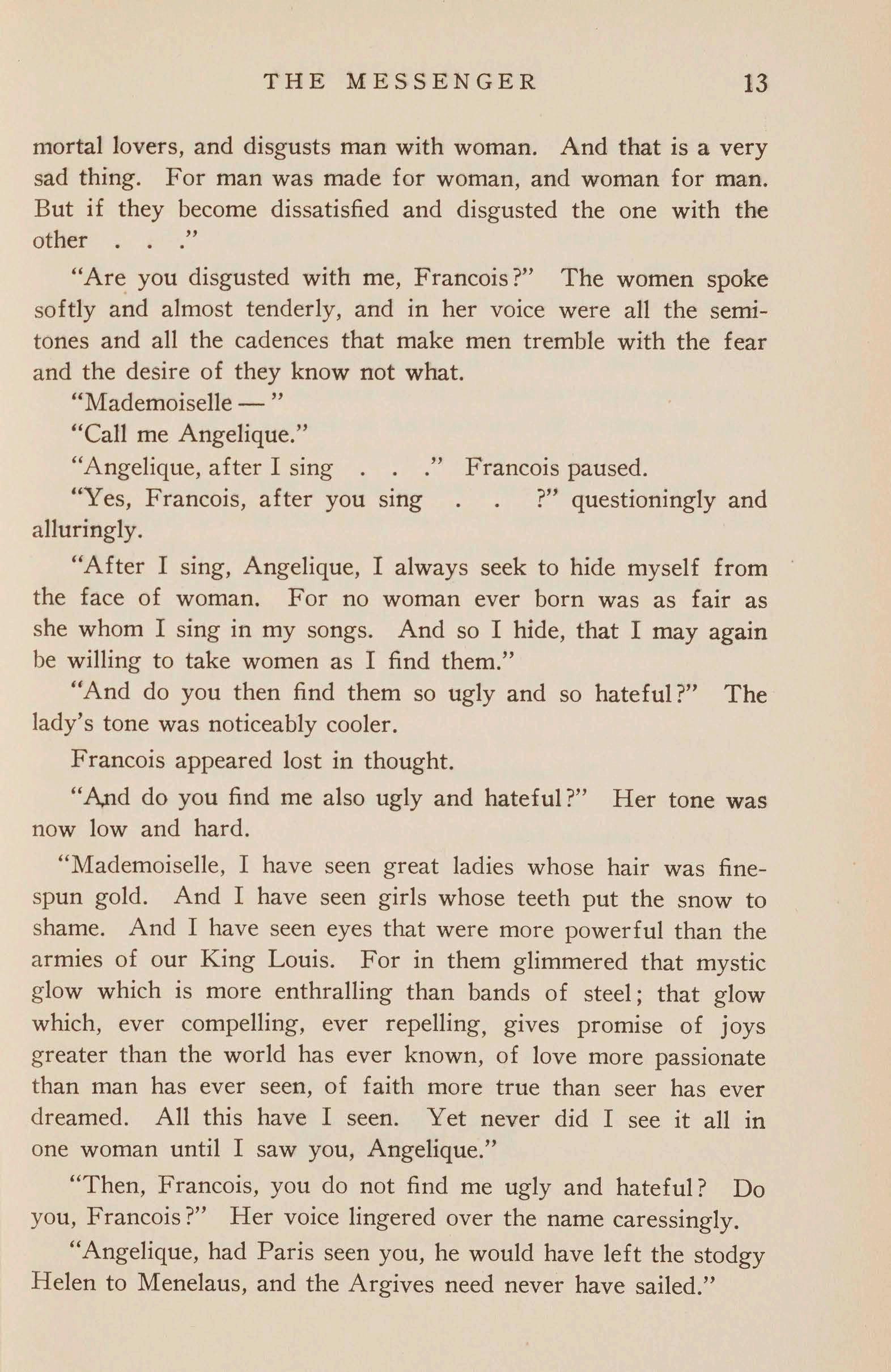
" Francois paused. smg ?" questioningly and
"After I sing, Angelique, I always seek to hide myself from the face of woman. For no woman ever born was as fair as she whom I sing in my songs. And so I hide, that I may again be willing to take women as I find them."
"And do you then find them so ugly and so hateful?" The lady's tone was noticeably cooler.
Francois appeared lost in thought.
"And do you find me also ugly and hateful?" Her tone was now low and hard.
"Mademoiselle, I have seen great ladies whose hair was finespun gold. And I have seen girls whose teeth put the snow to shame. And I have seen eyes that were more powerful than the armies of our King Louis. For in them glimmered that mystic glow which is more enthralling than bands of steel; that glow which, ever compelling, ever repelling, gives promise of joys g reater than the world has ever known, of love more passionate than man has ever seen, of faith more true than seer has ever dreamed. All this have I seen. Yet never did I see it all in one woman until I saw you, Angelique."
"Then, Francois, you do not find me ugly and hateful? Do y ou, Francois?" Her voice lingered over the name caressingly.
"Angelique, had Paris seen you, he would have left the stodgy Helen to Menelaus, and the Argives need never have sailed."
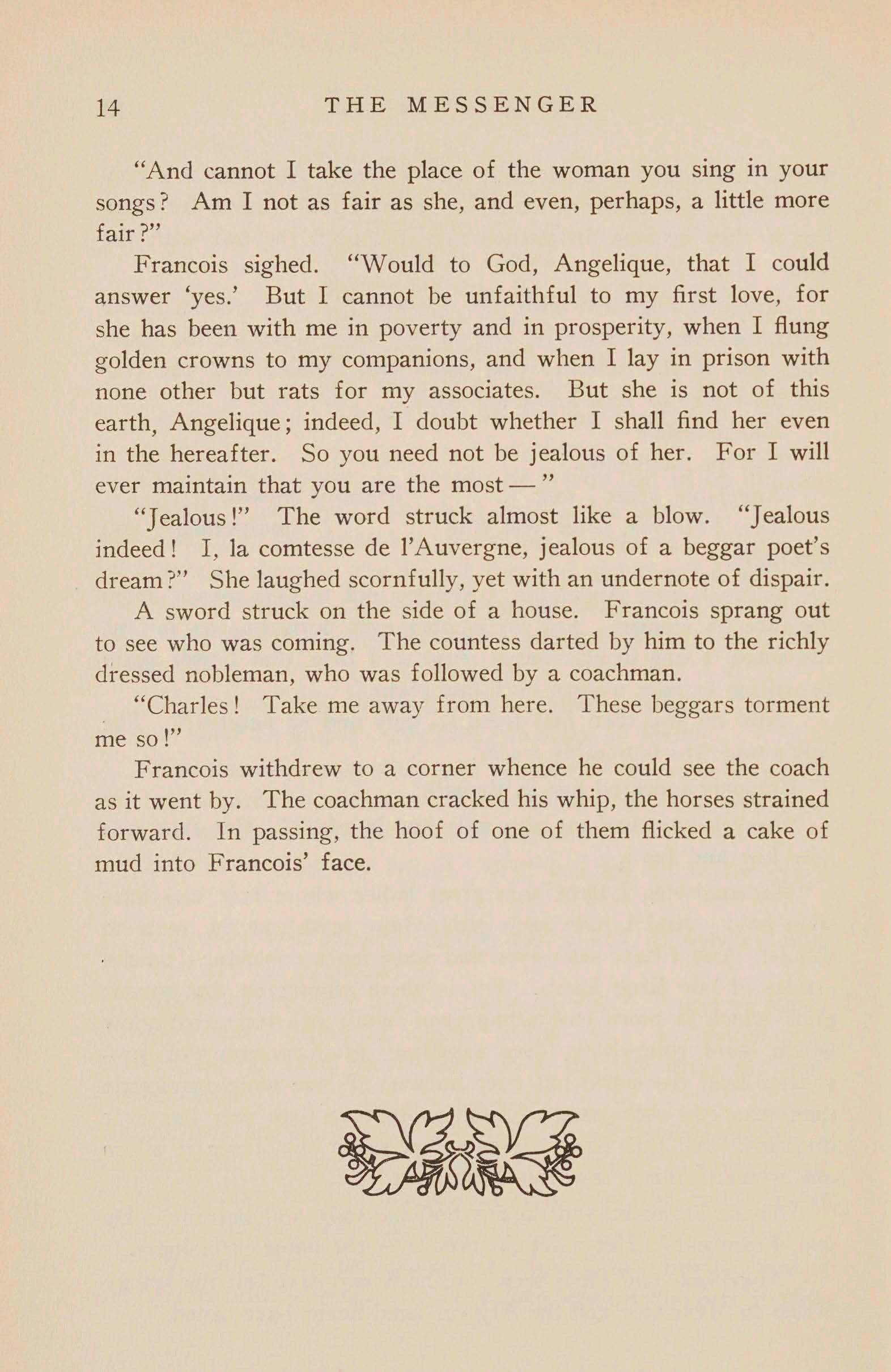
"And cannot I take the place of the woman you sing in your songs? Am I not as fair as she, and even, perhaps, a little more fair?"
Francois sighed. "Would to God, Angelique, that I could answer 'yes.' But I cannot be unfaithful to my first love, for she has been with me in poverty and in prosperity, when I flung golden crowns to my companions, and when I lay in prison with none other but rats for my associates. But she is not of this earth, Angelique; indeed, I doubt whether I shall find her even in the hereafter. So you need not be jealous of her. For I will ever maintain that you are the most - "
"Jealous !" The word struck almost like a blow. "Jealous indeed! I, la comtesse de l'Auvergne, jealous of a beggar poet's dream?" She laughed scornfully, yet with an undernote of dispair.
A sword struck on the side of a house. Francois sprang out to see who was coming. The countess darted by him to the richly dressed nobleman, who was followed by a coachman.
"Charles! Take me away from here. These beggars torment me so!"
Francois withdrew to a corner whence he could see the coach as it went by. The coachman cracked his whip, the horses strained forward. In passing, the hoof of one of them flicked a cake of mud into Francois' face.
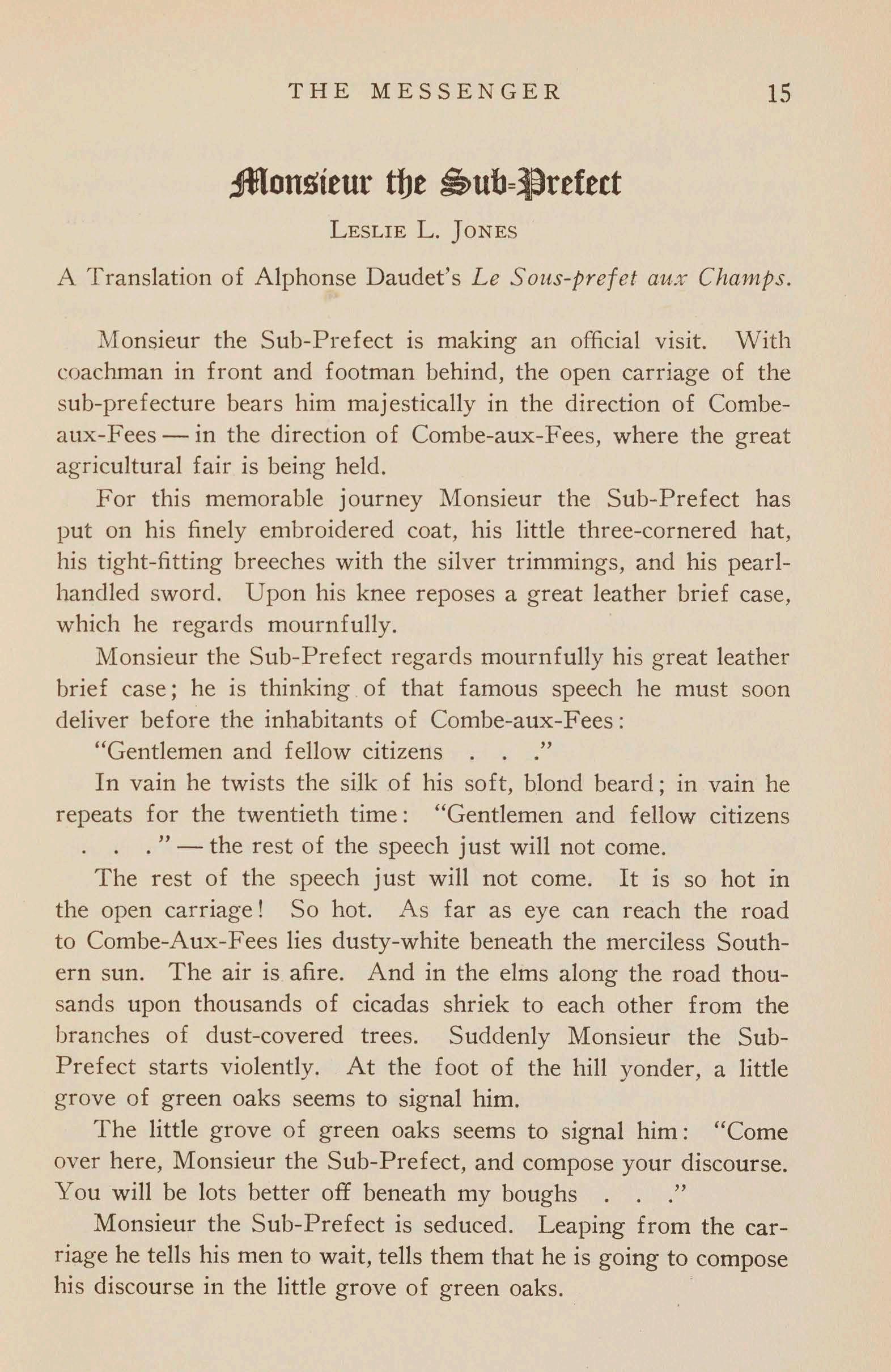
,fflont,ieurtfJe~ub=~rdect
LESLIE L. JONES
A Translation of Alphonse Daudet's Le Sous-prefet aux Champs.
Monsieur the Sub-Prefect is making an official visit. With coachman in front and footman behind, the open carriage of the sub-prefecture bears him majestically in the direction of Combeaux-Fees - in the direction of Combe-aux-Fees, where the great agricultural fair is being held.
For this memorable journey Monsieur the Sub-Prefect has put on his finely embroidered coat, his little three-cornered hat, his tight-fitting breeches with the silver trimmings, and his pearlhandled sword. Upon his knee reposes a great leather brief case, which he regards mournfully.
Monsieur the Sub-Prefect regards mournfully his great leather brief case; he is thinking of that famous speech he must soon deliver before the inhabitants of Combe-aux-Fees: "Gentlemen and fell ow citizens "
In vain he twists the silk of his soft, blond beard; in vain he repeats for the twentieth time : "Gentlemen and fell ow citizens . " - the rest of the speech just will not come.
The rest of the speech just will not come. It is so hot in the open carriage ! So hot. As far as eye can reach the road to Combe-Aux-Fees lies dusty-white beneath the merciless Southern sun. The air is afire. And in the elms along the road thousands upon thousands of cicadas shriek to each other from the branches of dust-covered trees. Suddenly Monsieur the SubPrefect starts violently. At the foot of the hill yonder, a little grove of green oaks seems to signal him.
The little grove of green oaks seems to signal him: "Come over here, Monsieur the Sub-Prefect, and compose your discourse. You will be lots better off beneath my boughs "
Monsieur the Sub-Prefect is seduced. Leaping from the carriage he tells his men to wait, tells them that he is going to compose his disco u rse in the little grove of green oaks.
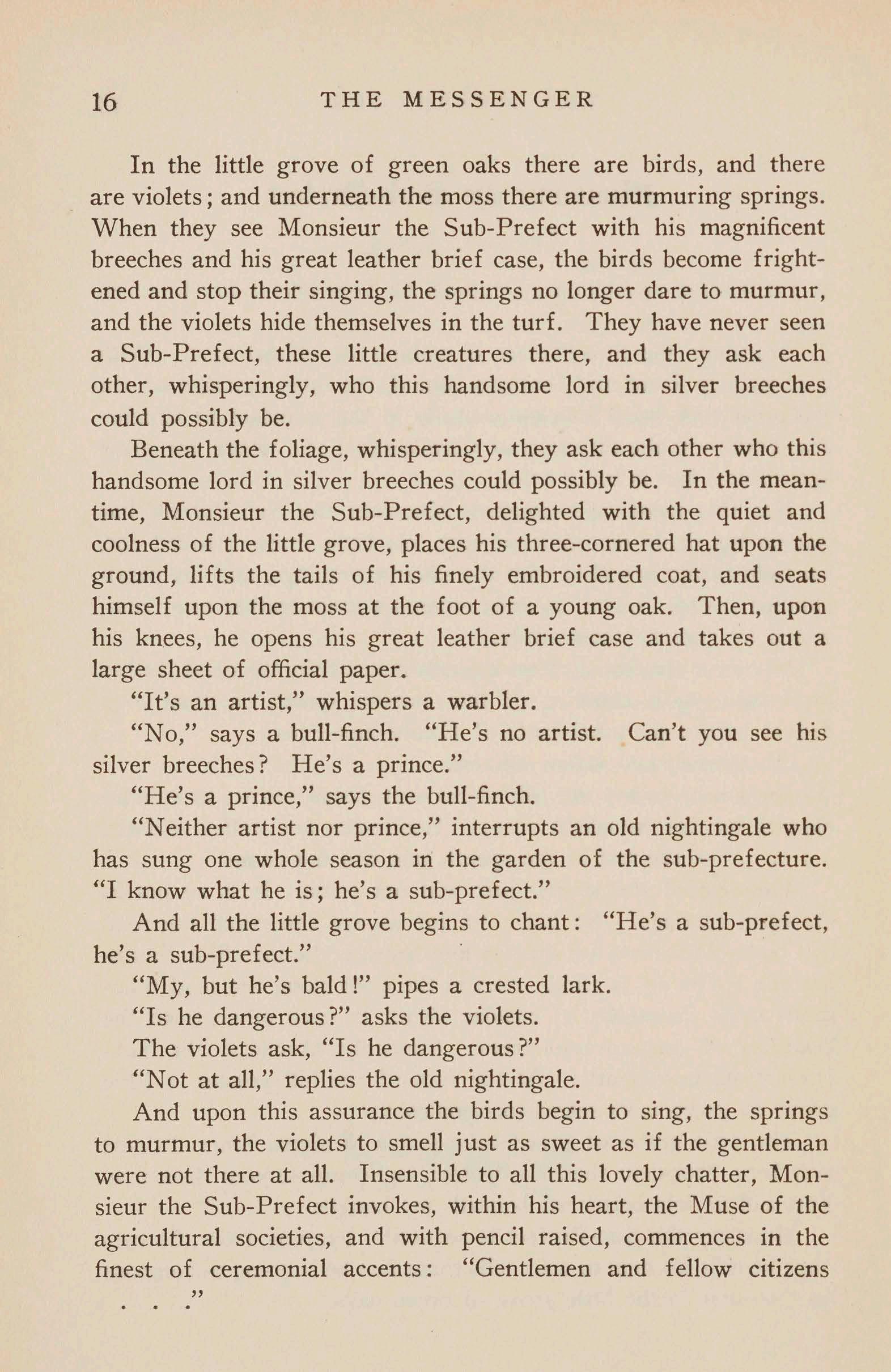
In the little grove of green oaks there are birds, and there are violets; and underneath the moss there are murmuring springs. When they see Monsieur the Sub-Prefect with his magnificent breeches and his great leather brief case, the birds become frightened and stop their singing, the springs no longer dare to murmur, and the violets hide themselves in the turf. They have never seen a Sub-Prefect, these little creatures there, and they ask each other, whisperingly, who this handsome lord in silver breeches could possibly be.
Beneath the foliage, whisperingly, they ask each other who this handsome lord in silver breeches could possibly be. In the meantime, Monsieur the Sub-Prefect, delighted with the quiet and coolness of the little grove, places his three-cornered hat upon the ground, lifts the tails of his finely embroidered coat, and seats himself upon the moss at the foot of a young oak. Then, upon his knees, he opens his great leather brief case and takes out a large sheet of official paper.
"It's an artist," whispers a warbler.
"No," says a bull-finch. "He's no artist. Can't you see his silver breeches? He's a prince."
"He's a prince," says the bull-finch.
"Neither artist nor prince," interrupts an old nightingale who has sung one whole season in the garden of the sub-prefecture. "I know what he is; he's a sub-prefect."
And all the little grove begins to chant: "He's a sub-prefect, he's a sub-prefect."
"My, but he's bald!" pipes a crested lark.
"Is he dangerous?" asks the violets.
The violets ask, "Is he dangerous ?"
"Not at all," replies the old nightingale.
And upon this assurance the birds begin to sing, the springs to murmur, the violets to smell just as sweet as if the gentleman were not there at all. Insensible to all this lovely chatter, Monsieur the Sub-Prefect invokes, within his heart, the Muse of the agricultural societies, and with pencil raised, commences in the finest of ceremonial accents : "Gentlemen and fell ow citizens "
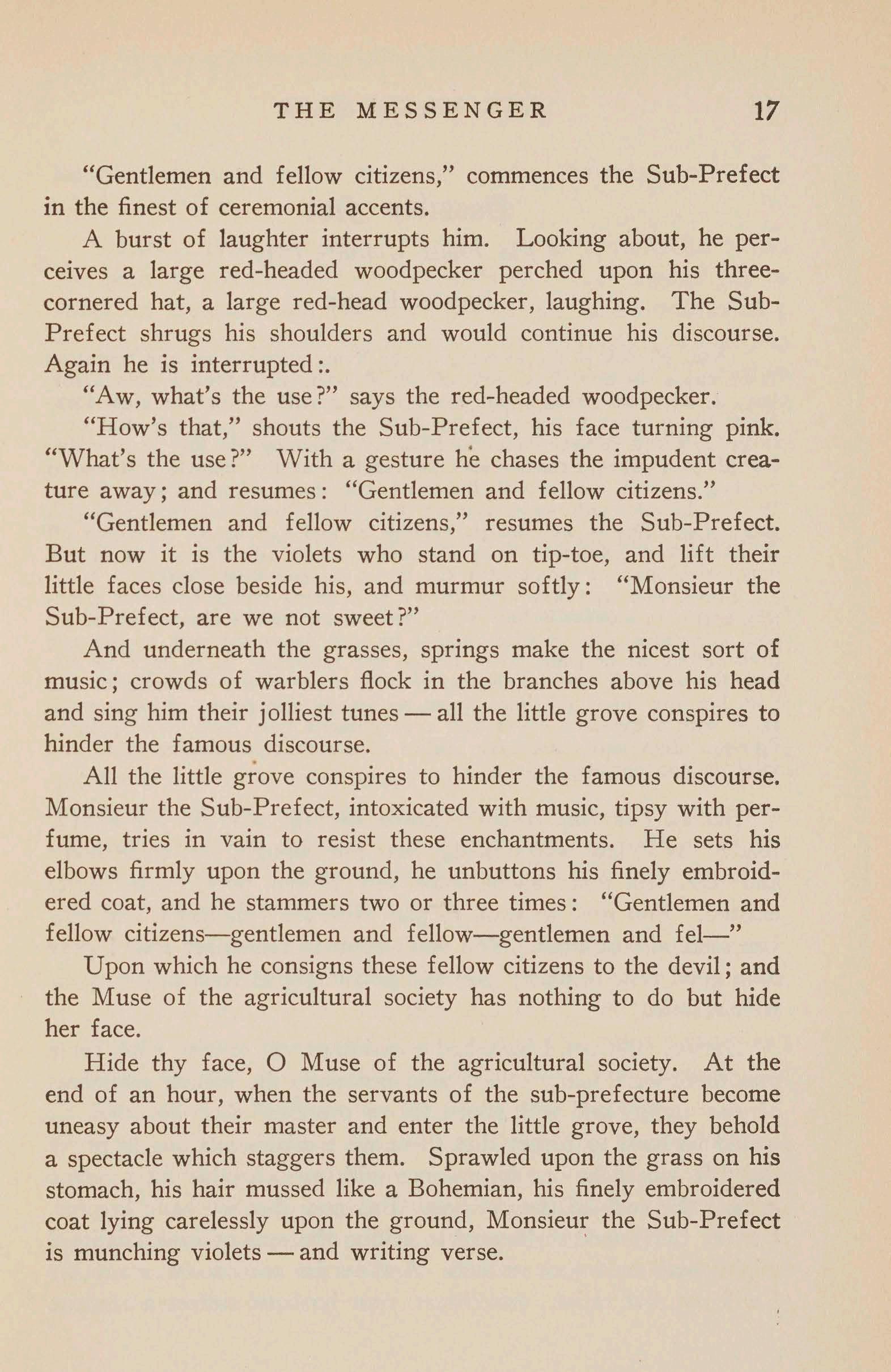
"Gentlemen and fell ow citizens," commences the Sub-Prefect in the finest of ceremonial accents.
A burst of laughter interrupts him. Looking about, he perceives a large red-headed woodpecker perched upon his threecornered hat, a large red-head woodpecker, laughing. The SubPrefect shrugs his shoulders and would continue his discourse. Again he is interrupted:.
"Aw, what's the use?" says the red-headed woodpecker.
"How's that," shouts the Sub-Prefect, his face turning pink. "What's the use?"
With a gesture he chases the impudent creature away; and resumes: "Gentlemen and fellow citizens."
"Gentlemen and fellow citizens," resumes the Sub-Prefect. But now it is the violets who stand on tip-toe, and lift their little faces close beside his, and murmur softly: "Monsieur the Sub-Prefect, are we not sweet?"
And underneath the grasses, springs make the nicest sort of music; crowds of warblers flock in the branches above his head and sing him their jolliest tunes -all the little grove conspires to hinder the famous discourse.
All the little grove conspires to hinder the famous discourse. Monsieur the Sub-Prefect, intoxicated with music, tipsy with perfume, tries in vain to resist these enchantments. He sets his elbows firmly upon the ground, he unbuttons his finely embroidered coat, and he stammers two or three times : "Gentlemen and fell ow citizens-gentlemen and fell ow-gentlemen and £el-"
Upon which he consigns these fellow citizens to the devil; and the Muse of the agricultural society has nothing to do but hide her face.
Hide thy face, 0 Muse of the agricultural society. At the end of an hour, when the servants of the sub-prefecture become uneasy about their master and enter the little grove, they behold a spectacle which staggers them. Sprawled upon the grass on his stomach, his hair mussed like a Bohemian, his finely embroidered coat lying carelessly upon the ground, Monsieu~ the Sub-Prefect is munching violets -and writing verse.
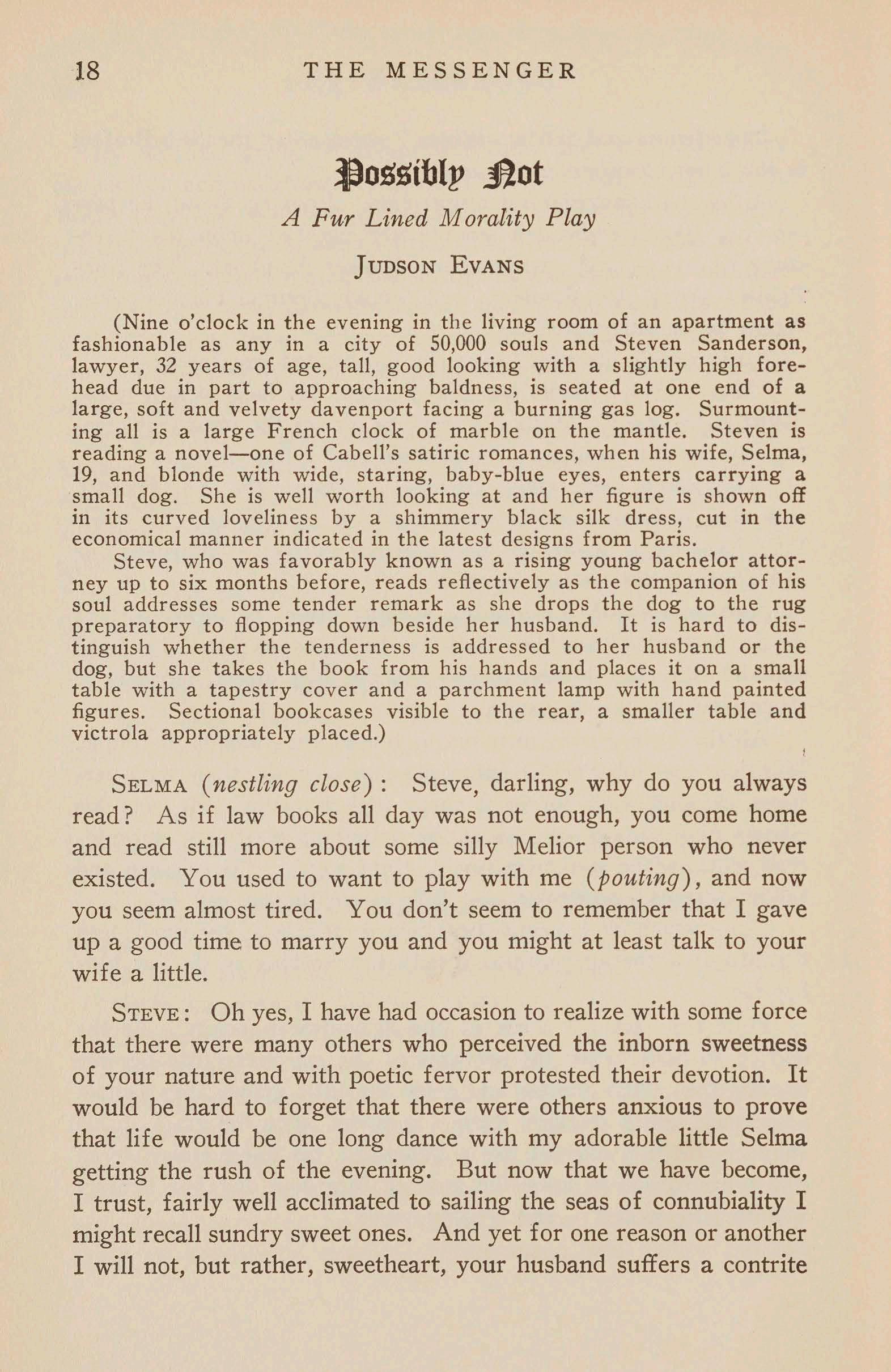
~o~~iblp J}ot
A Fur Lined Morality Play
JUDSON EVANS
(Nine o'clock in the evening in the living room of an apartment as fashionable as any in a city of 50,000 souls and Steven Sanderson, lawyer, 32 years of age, tall, good looking with a slightly high forehead due in part to approaching baldness, is seated at one end of a large, soft and velvety davenport facing a burning gas log. Surmounting all is a large French clock of marble on the mantle. Steven is reading a novel-one of Cabell's satiric romances, when his wife, Selma, 19, and blonde with wide, staring, baby-blue eyes, enters carrying a small dog. She is well worth looking at and her figure is shown off in its curved loveliness by a shimmery black silk dress, cut in the economical manner indicated in the latest designs from Paris . Steve , who was favorably known as a rising young bachelor attorney up to six months before, reads reflectively as the companion of his soul addresses some tender remark as she drops the dog to the rug preparatory to flopping down beside her husband. It is hard to distinguish whether the tenderness is addressed to her husband or the dog, but she takes the book from his hands and places it on a small table with a tapestry cover and a parchment lamp with hand painted figures. Sectional bookcases visible to the rear, a smaller table and victrola appropriately placed.)
SELMA ( nestling close) : Steve, darling, why do you always read? As if law books all day was not enough, you come home and read still more about some silly Melior person who never existed. You used to want to play with me (pouting), and now you seem almost tired. You don't seem to remember that I gave up a good time to marry you and you might at least talk to your wife a little.
STEVE: Oh yes, I have had occasion to realize with some force that there were many others who perceived the inborn sweetness of your nature and with poetic fervor protested their devotion. It would be hard to forget that there were others anxious to prove that life would be one long dance with my adorable little Selma getting the rush of the evening. But now that we have become, I trust, fairly well acclimated to sailing the seas of connubiality I might recall sundry sweet ones. And yet for one reason or another I will not, but rather, sweetheart, your husband suffers a contrite
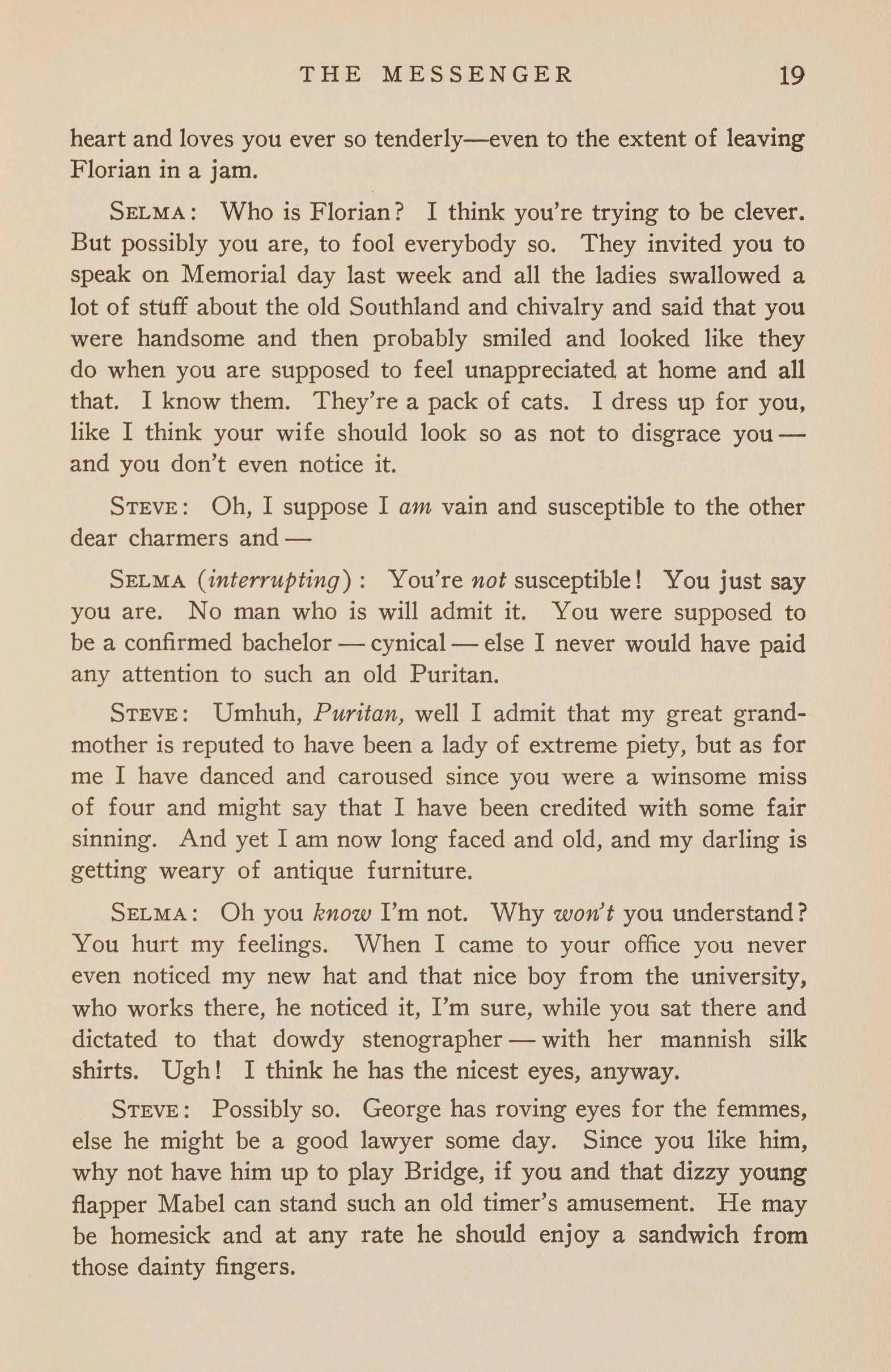
heart and loves you ever so tenderly-even to the extent of leaving Florian in a jam.
SELMA: Who is Florian? I think you're trying to be clever. But possibly you are, to fool everybody so. They invited you to speak on Memorial day last week and all the ladies swallowed a lot of stuff about the old Southland and chivalry and said that you were handsome and then probably smiled and looked like they do when you are supposed to feel unappreciated at home and all that. I know them. They're a pack of cats. I dress up for you, like I think your wife should look so as not to disgrace youand you don't even notice it.
STEVE: Oh, I suppose I am vain and susceptible to the other dear charmers and -
SELMA (interrupting) : You're not susceptible! You just say you are. No man who is will admit it. You were supposed to be a confirmed bachelor -cynical -else I never would have paid any attention to such an old Puritan.
STEVE: Umhuh, Puritan, well I admit that my great grandmother is reputed to have been a lady of extreme piety, but as for me I have danced and caroused since you were a winsome miss of four and might say that I have been credited with some fair sinning. And yet I am now long faced and old, and my darling is getting weary of antique furniture.
SELMA: Oh you know I'm not. Why won't you understand? You hurt my feelings. When I came to your office you never even noticed my new hat and that nice boy from the university, who works there, he noticed it, I'm sure, while you sat there and dictated to that dowdy stenographer -with her mannish silk shirts. Ugh! I think he has the nicest eyes, anyway.
STEVE: Possibly so. George has roving eyes for the femmes, else he might be a good lawyer some day. Since you like him, why not have him up to play Bridge, if you and that dizzy young flapper Mabel can stand such an old timer's amusement. He may be homesick and at any rate he should enjoy a sandwich from those dainty fingers.
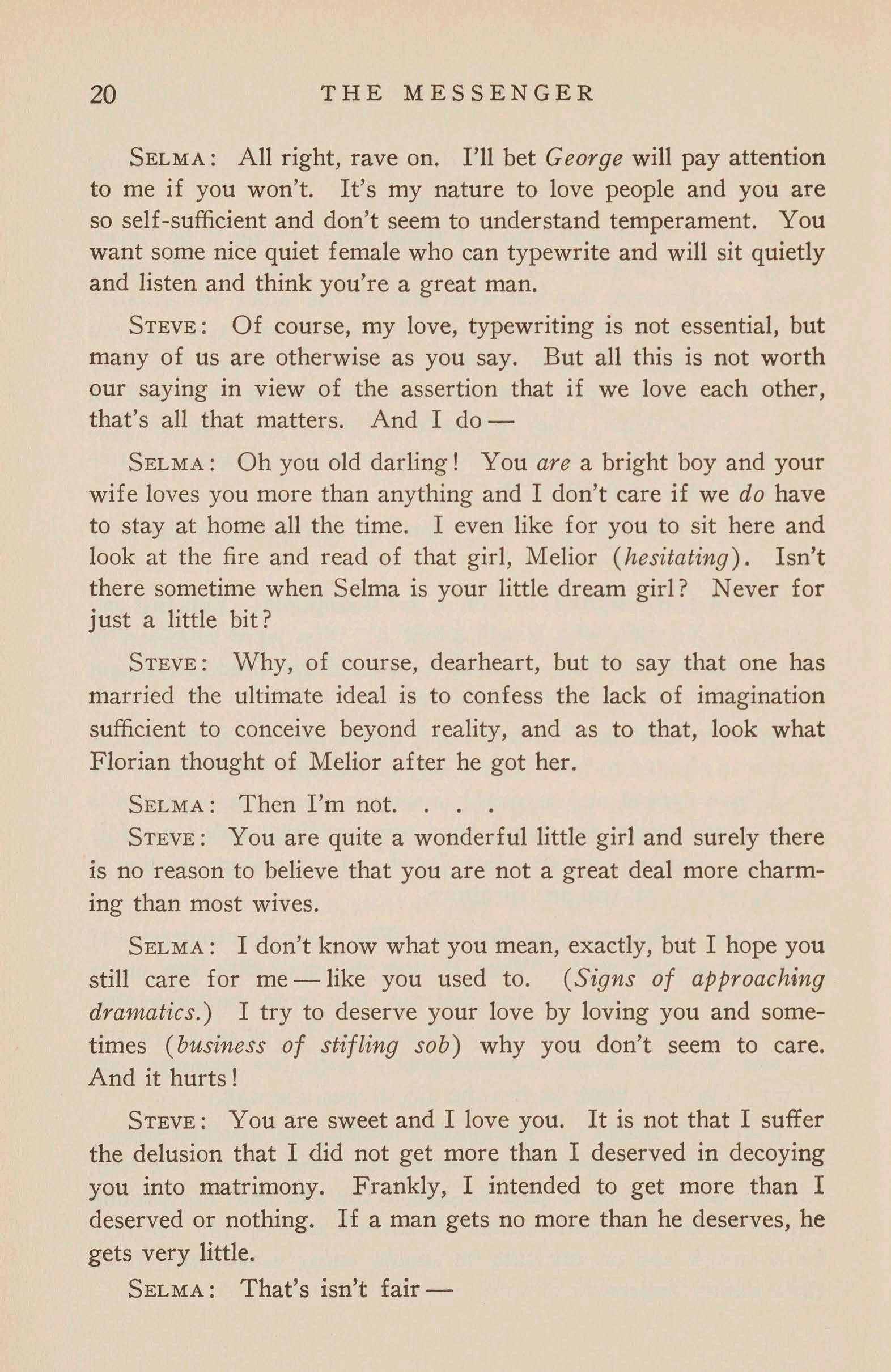
SELMA: All right, rave on. I'll bet George will pay attention to me if you won't. It's my nature to love people and you are so self-sufficient and don't seem to understand temperament. You want some nice quiet female who can typewrite and will sit quietly and listen and think you're a great man.
STEVE: Of course, my love, typewriting is not essential, but many of us are otherwise as you say. But all this is not worth our saying in view of the assertion that if we love each other, that's all that matters. And I do -
SELMA: Oh you old darling! You are a bright boy and your wife loves you more than anything and I don't care if we do have to stay at home all the time. I even like for you to sit here and look at the fire and read of that girl , Melior (hesitating). Isn't there sometime when Selma is your little dream girl? Never for just a little bit?
STEVE: Why , of course, dear heart, but to say that one has married the ultimate ideal is to confess the lack of imagination sufficient to conceive beyond reality, and as to that, look what Florian thought of Melior after he got her.
SELMA: Then I'm not.
STEVE: You are quite a wonderful little girl and surely there is no reason to believe that you are not a great deal more charming than most wives.
SELMA: I don't know what you mean, exactly, but I hope you still care for me-like you used to. (Signs of approaching dramatics.) I try to deserve your love by loving you and sometimes ( business of stifling sob) why you don't seem to care. And it hurts !
STEVE: You are sweet and I love you. It is not that I suffer the delusion that I did not get more than I deserved in decoying you into matrimony. Frankly, I intended to get more than I deserved or nothing. If a man gets no more than he deserves, he gets very little.
SELMA: That's isn't fair -
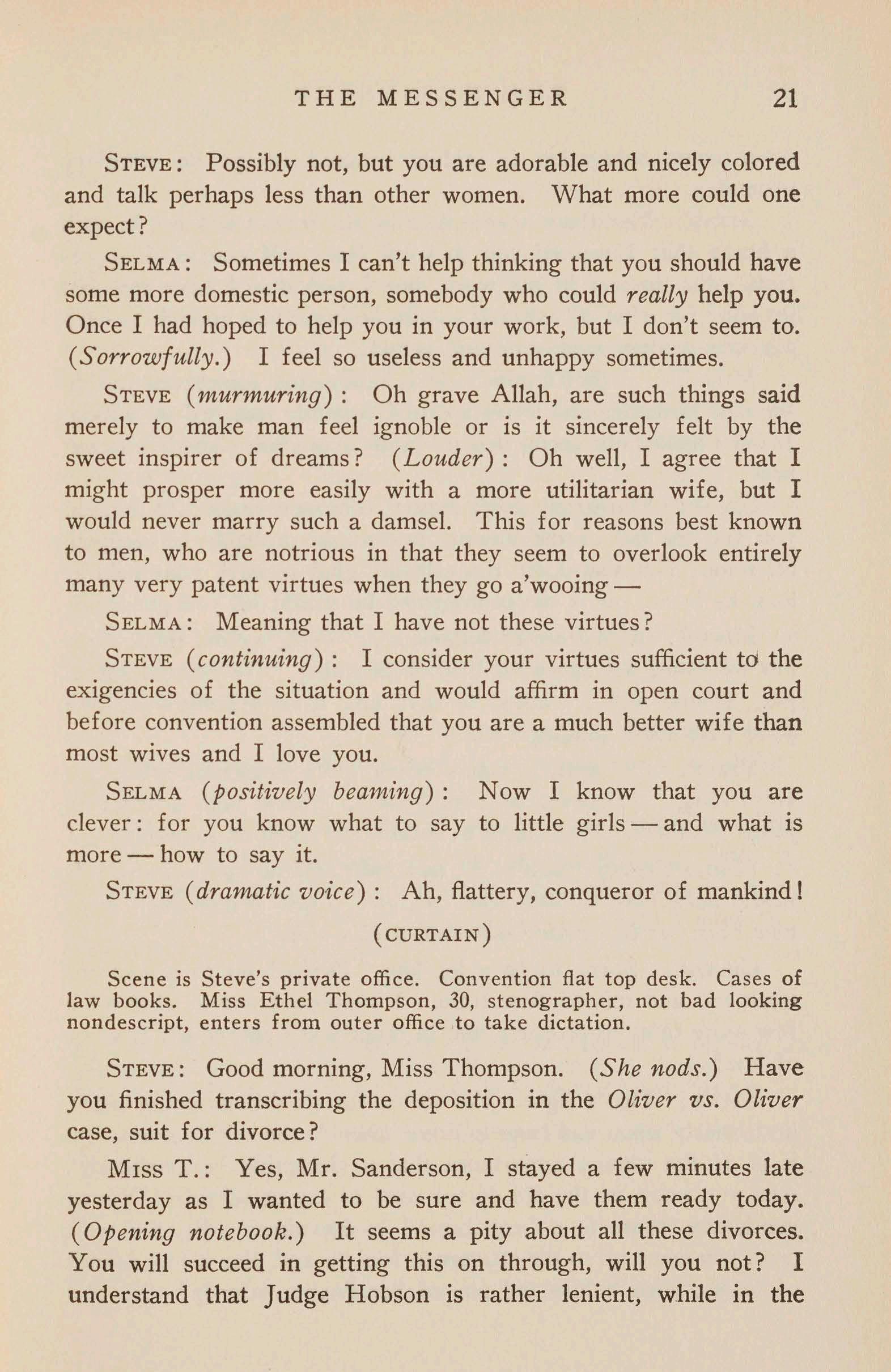
STEVE: Possibly not, but you are adorable and nicely colored and talk perhaps less than other women. What more could one expect?
SELMA: Sometimes I can't help thinking that you should have some more domestic person, somebody who could really help you. Once I had hoped to help you in your work, but I don't seem to. (Sorrowfully.) I feel so useless and unhappy sometimes.
STEVE (murmuring) : Oh grave Allah, are such things said merely to make man feel ignoble or is it sincerely felt by the sweet inspirer of dreams? (Louder) : Oh well, I agree that I might prosper more easily with a more utilitarian wife, but I would never marry such a damsel. This for reasons best known to men, who are notrious in that they seem to overlook entirely many very patent virtues when they go a'wooing-
SELMA: Meaning that I have not these virtues?
STEVE (continuing) : I consider your virtues sufficient td the exigencies of the situation and would affirm in open court and before convention assembled that you are a much better wife than most wives and I love you.
SELMA (positively beaming) : Now I know that you are clever: for you know what to say to little girls -and what is more -how to say it.
STEVE ( dramatic voice) : Ah, flattery, conqueror of mankind!
(CURTAIN)
Scene is Steve's private office. Convention flat top desk Cases of law books. Miss Ethel Thompson, 30, stenographer, not bad looking nondescript, enters from outer office to take dictation.
STEVE: Good morning, Miss Thompson. (She nods.) Have you finished transcribing the deposition in the Oliver vs. Oliver case, suit for divorce?
Mrss T.: Yes, Mr. Sanderson, I stayed a few minutes late yesterday as I wanted to be sure and have them ready today. ( Opening notebook.) It seems a pity about all these divorces. You will succeed in getting this on through, will you not? I understand that Judge Hobson is rather lenient, while in the
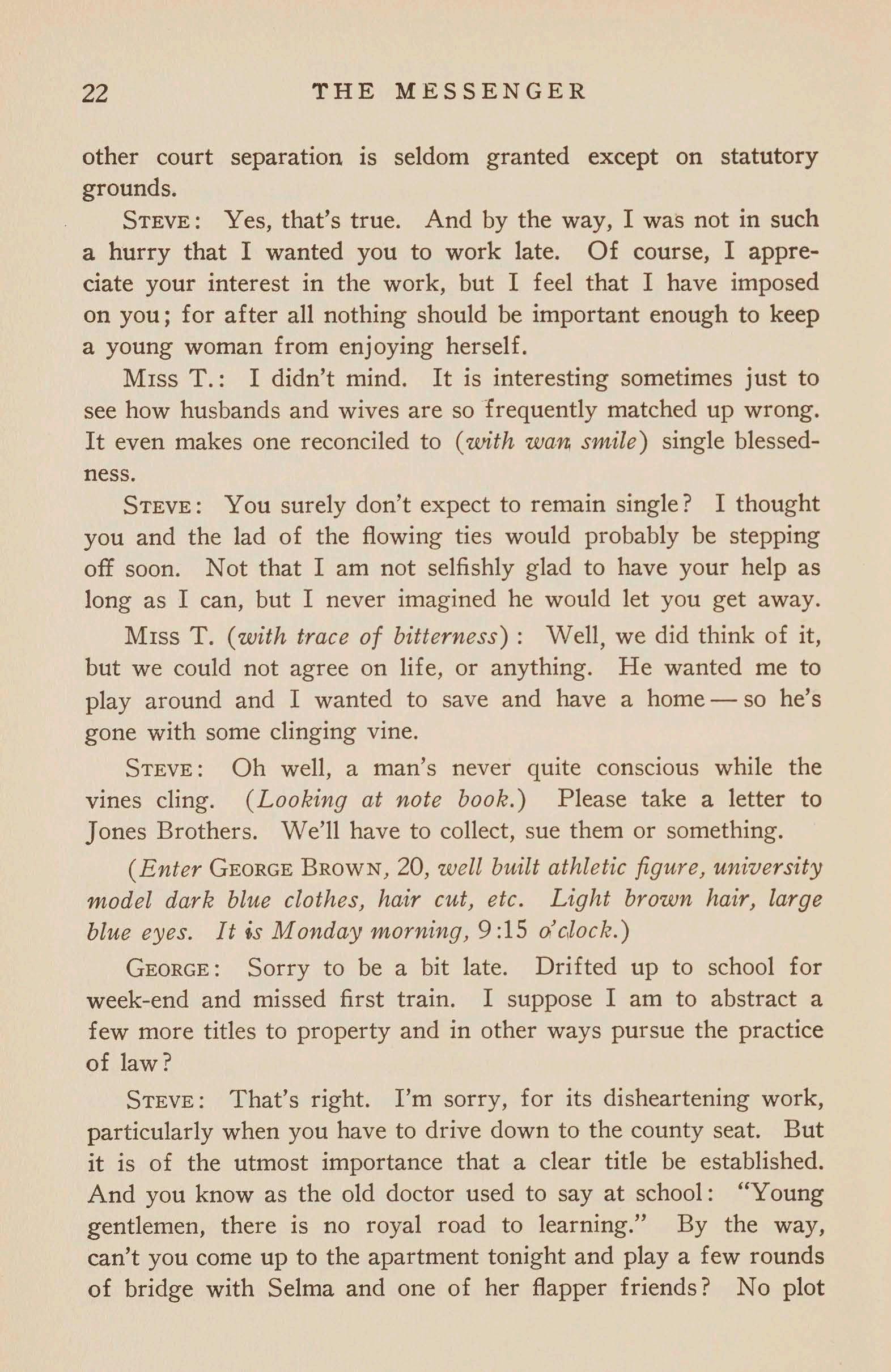
other court separation is seldom granted except on statutory grounds.
STEVE: Yes, that's true. And by the way, I was not in such a hurry that I wanted you to work late. Of course, I appreciate your interest in the work, but I feel that I have imposed on you; for after all nothing should be important enough to keep a young woman from enjoying herself.
MISS T.: I didn't mind. It is interesting sometimes just to see how hu sbands and wives are so frequently matched up wrong. It even makes one reconciled to ( with wan smile) single blessedness.
STEVE: You surely don't expect to remain single? I thought you and the lad of the flowing ties would probably be stepping off soon. Not that I am not selfishly glad to have your help as long as I can, but I never imagined he would let you get away.
MISS T. ( with trace of bittern ess) : Well, we did think of it, but we could not agree on life , or anything . He wanted me to play around and I wanted to save and have a home - so he's gone with some clinging vine .
STEVE: Oh well, a man's never quite conscious while the vines cling. (Looking at not e book.) Please take a letter to Jones Brothers. We'll have to collect, sue them or something.
(Ent er GEORGEBROWN , 20, w ell built athletic figure , university model dark blue clothes, hair cut, etc. Light brown hair, large blu e eyes. It is Monday morning , 9:15 o'c,lock.)
GEORGE: Sorry to be a bit late. Drifted up to school for week-end and missed first train. I suppose I am to abstract a few more titles to property and in other ways pursue the practice of law?
STEVE: That's right. I'm sorry, for its disheartening work, particularly when you have to drive down to the county seat. But it is of the utmost importance that a clear title be established. And you know as the old doctor used to say at school: "Young gentlemen, there is no royal road to learning." By the way, can't you come up to the apartment tonight and play a few rounds of bridge with Selma and one of her flapper friends? No plot
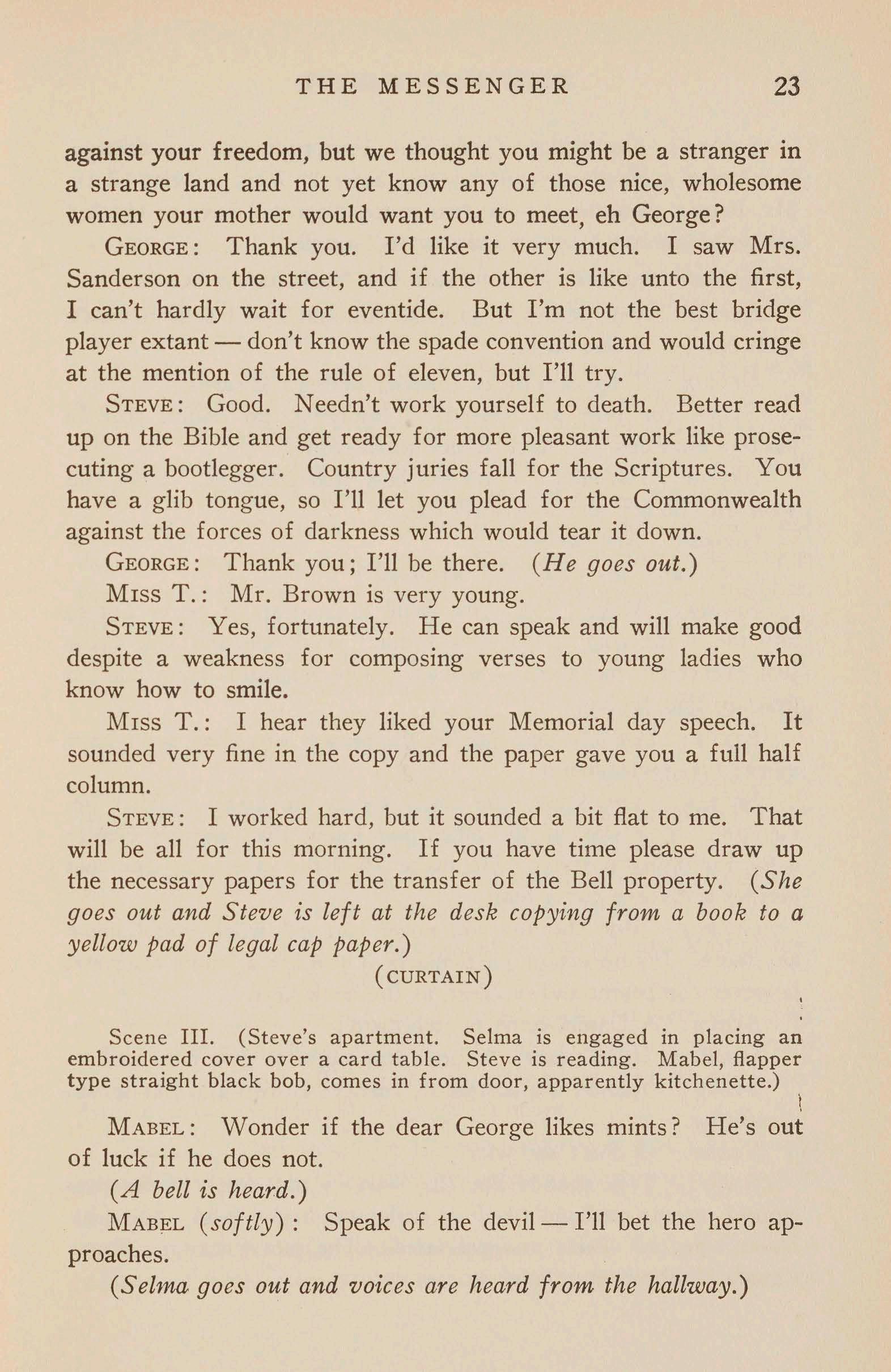
against your freedom, but we thought you might be a stranger in a strange land and not yet know any of those nice, wholesome women your mother would want you to meet, eh George?
GEORGE: Thank you. I'd like it very much. I saw Mrs. Sanderson on the street, and if the other is like unto the first, I can't hardly wait for eventide. But I'm not the best bridge player extant -don't know the spade convention and would cringe at the mention of the rule of eleven, but I'll try.
STEVE: Good. Needn't work yourself to death. Better read up on the Bible and get ready for more pleasant work like prosecuting a bootlegger. Country juries fall for the Scriptures. You have a glib tongue, so I'll let you plead for the Commonwealth against the forces of darkness which would tear it down.
GEORGE: Thank you; I'll be there. (He goes out.)
Mrss T.: Mr. Brown is very young.
STEVE: Yes, fortunately. He can speak and will make good despite a weakness for composing verses to young ladies who know how to smile.
Mrss T.: I hear they liked your Memorial day speech. It sounded very fine in the copy and the paper gave you a full half column.
STEVE: I worked hard, but it sounded a bit flat to me. That will be all for this morning. If you have time please draw up the necessary papers for the transfer of the Bell property. (She goes out and Steve is left at the desk copying from a book to a yellow pad of legal cap paper.)
(CURTAIN)
Scene III. (Steve's apartment. Selma is engaged in placing an embroidered cover over a card table. Steve is reading. Mabel, flapper type straight black bob, comes in from door, apparently kitchenette.) i
MABEL: Wonder if the dear George likes mints? He's out of luck if he does not.
(A bell is heard.)
MABEL (softly) : Speak of the devil -I'll bet the hero approaches.
(Selma goes out and voices are heard from the hallway.)
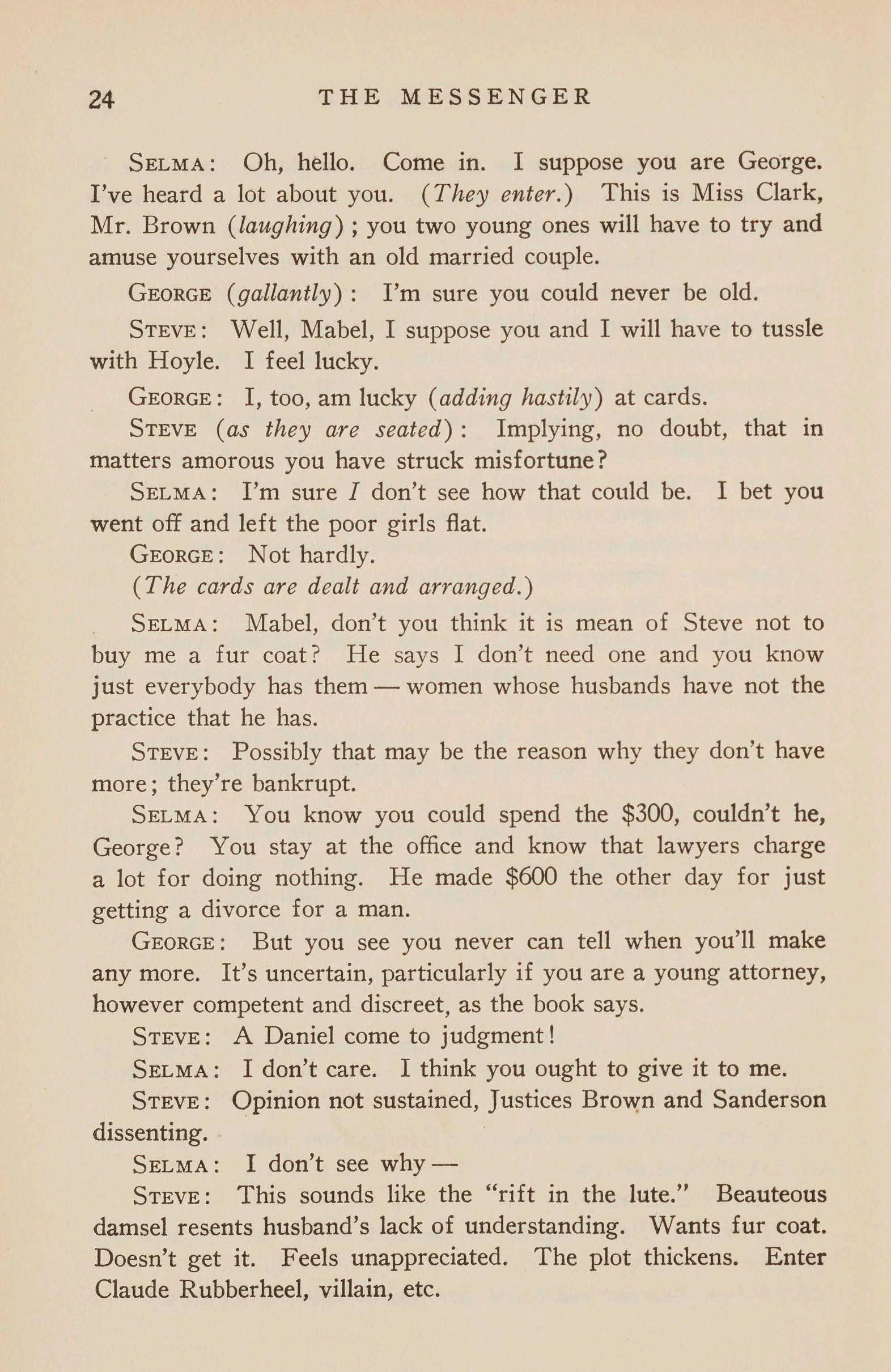
SELMA: Oh, hello. Come in. I suppose you are George. I've heard a lot about you. (They enter.) This is Miss Clark, Mr. Brown (laughing); you two young ones will have to try and amuse yourselves with an old married couple.
GEORGE(gallantly) : I'm sure you could never be old.
STEVE: Well, Mabel, I suppose you and I will have to tussle with Hoyle. I feel lucky.
GEORGE: I, too, am lucky ( adding hastily) at cards.
STEVE (as they are seated) : Implying, no doubt, that in matters amorous you have struck misfortune?
SELMA: I'm sure I don't see how that could be. I bet you went off and left the poor girls flat.
GEORGE : Not hardly.
( The cards are dealt and arranged.)
SELMA: Mabel, don't you think it is mean of Steve not to buy me a fur coat? He says I don't need one and you know just everybody has them -women whose husbands have not the practice that he has.
STEVE: Possibly that may be the reason why they don't have more; they're bankrupt.
SELMA: You know you could spend the $300, couldn't he, George? You stay at the office and know that lawyers charge a lot for doing nothing. He made $600 the other day for just getting a divorce for a man.
GEORGE : But you see you never can tell when you'll make any more. It's uncertain, particularly if you are a young attorney, however competent and discreet, as the book says.
STEVE: A Daniel come to judgment!
SELMA: I don't care. I think you ought to give it to me.
STEVE: Opinion not sustained, Justices Bro\\'.n and Sanderson dissenting.
SELMA: I don't see why -
STEVE: This sounds like the "rift in the lute." Beauteous damsel resents husband's lack of understanding. Wants fur coat. Doesn't get it. Feels unappreciated. The plot thickens. Enter Claude Rubberheel, villain, etc.

SELMA: There you go -making fun of me.
MABEL: Let ' s stop playing bridge and dance. (Ready assent.)
SELMA: All right. ( George puts waltz on the victrola which mourns "Just a Kiss in the Dark." He asks Selma to dance. They kick back the rug and both couples start whirling. Steve and Mabel dance out into the adjoining room . )
GEORGE : Selma, have you forgotten that date at our dance at the university? You were so thrilling and thrilled, too, you said. I recognized you the other day in the office, even though you are better looking and younger than ever. I was pepped to a million , but you spurned my glances and I was crushed.
SELMA: Of course , I place you -not Addison Sims, but the nicest boy who parked me on the steps of the Delta Kappa house and told me a sad tale of woman's perfidy. I remember, you had a most terrible line. You recited poetry and I had on a blue dress with hoops and you said you liked it.
GEORGE: Idyllic memories!
SELMA: And possibly I might have - er sympathized. But we can't , of course, be that way now.
GEORGE:It makes me jealous to think of Mr . Sanderson having a sweet young thing to buy a fur coat for and me with nothing to do with $425 I luckily made, due to his kindness.
SELMA ( s1niling impishly) : You ought to be able to qualify as consoler of the lonely wives of traveling men.
GEORGE:No, hardly-and besides - I'm not that kind of boy.
SELMA: Possibly not, but probably?
GEORGE: No, I'm not, but I almost wish you were the lonely frau of some knight of the grip . I'd get you that coat. I know which one it was. It's in the show window and its gray, and blonde girls look adorable in gray fur coats.
SELMA: That would be all very sweet, but just what would friend husband say if he saw his pride and joy stepping out in t he glad raiment?
GEORGE: Nothing could be simpler : Hear the wisdom of a competent and discreet attorney at law, guardian ad !item for
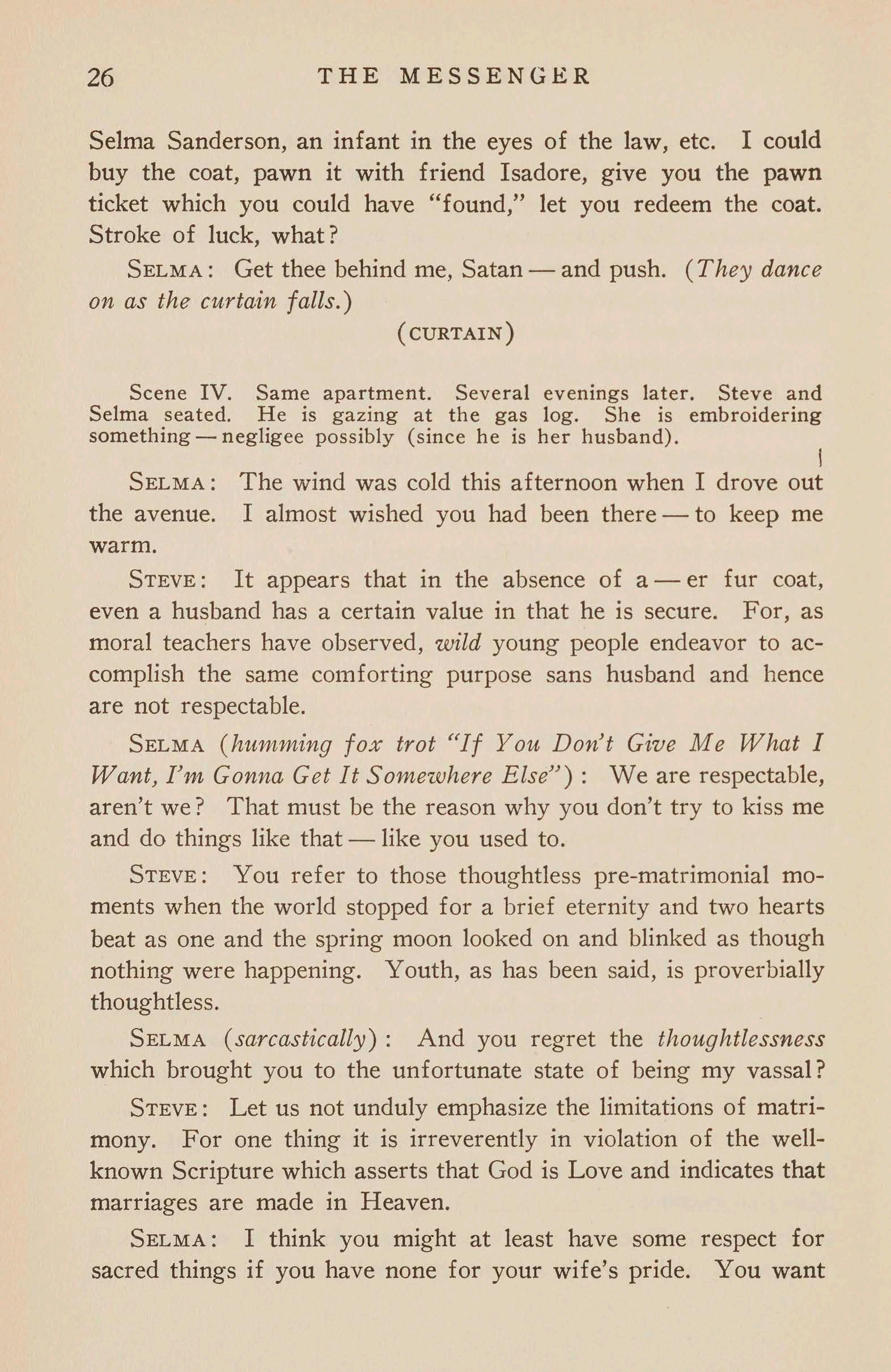
Selma Sanderson, an infant in the eyes of the law, etc. I could buy the coat, pawn it with friend Isadore, give you the pawn ticket which you could have "found," let you redeem the coat. Stroke of luck, what?
SELMA: Get thee behind me, Satan-and push. (They dance on as the curtain falls.)
(CURTAIN)
Scene IV. Same apartment. Several evenings later. Steve and Selma seated . He is gazing at the gas log. She is embroidering something-negligee possibly (since he is her husband).
SELMA: The wind was cold this afternoon when I drove out the avenue. I almost wished you had been there -to keep me warm.
STEVE: It appears that in the absence of a -er fur coat, even a husband has a certain value in that he is secure. For, as moral teachers have observed, wild young people endeavor to accomplish the same comforting purpose sans husband and hence are not respectable.
SELMA (humming fox trot "If You Don't Give Me What I Want, I'm Gonna Get It Somewhere Else"): We are respectable, aren't we? That must be the reason why you don't try to kiss me and do things like that -like you used to.
STEVE: You ref er to those thoughtless pre-matrimonial moments when the world stopped for a brief eternity and two hearts beat as one and the spring moon looked on and blinked as though nothing were happening. Youth, as has been said, is proverbially thoughtless.
SELMA (sarcastically) : And you regret the thoughtlessness which brought you to the unfortunate state of being my vassal?
STEVE: Let us not unduly emphasize the limitations of matrimony. For one thing it is irreverently in violation of the wellknown Scripture which asserts that God is Love and indicates that marriages are made in Heaven.
SELMA: I think you might at least have some respect for sacred things if you have none for your wife's pride. You want
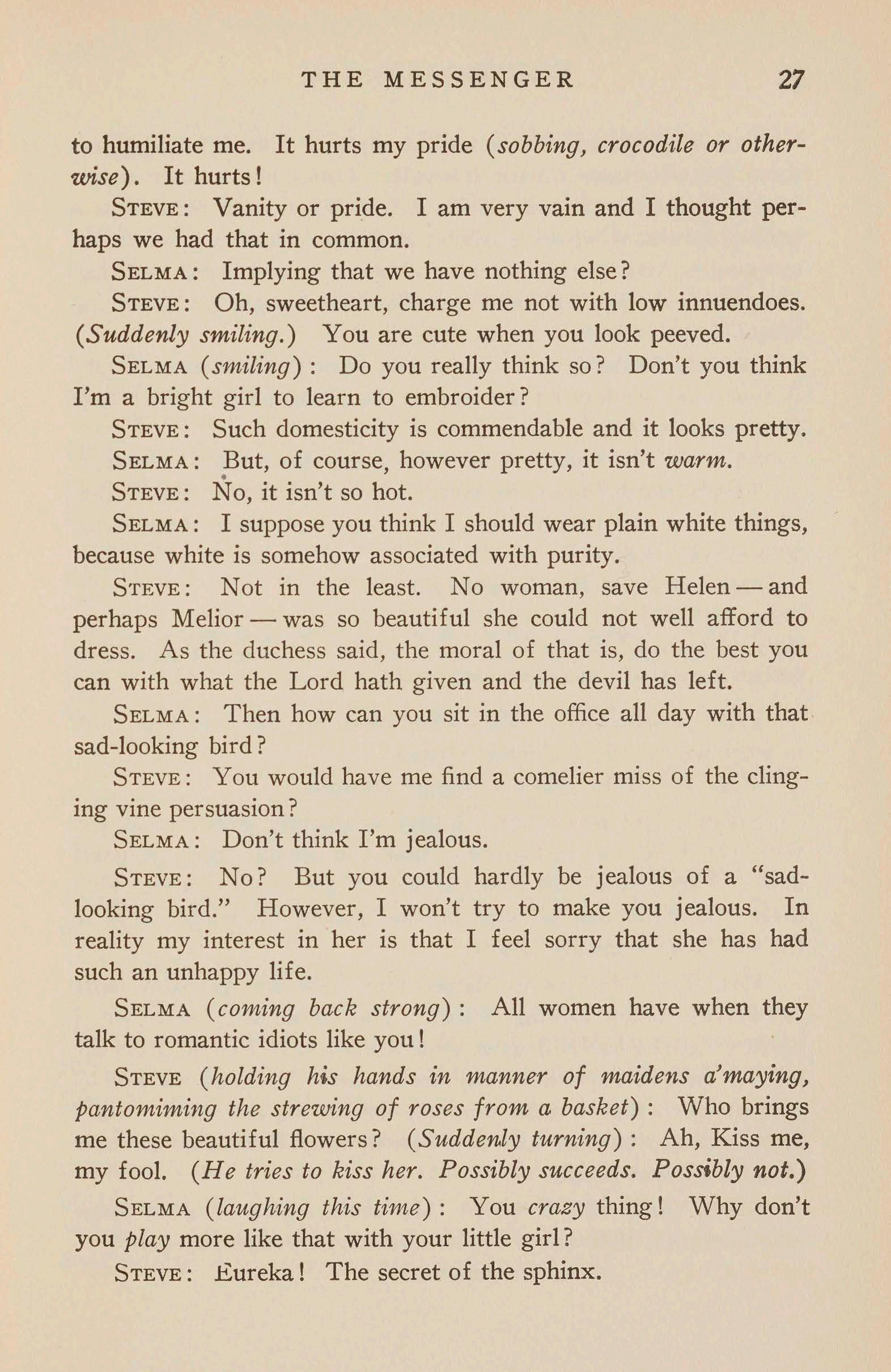
to humiliate me. It hurts my pride (sobbing, crocodile or otherwise). It hurts!
STEVE: Vanity or pride. I am very vain and I thought perhaps we had that in common.
SELMA: Implying that we have nothing else?
STEVE: Oh, sweetheart, charge me not with low innuendoes. (Suddenly smiling.) You are cute when you look peeved.
SELMA (smiling) : Do you really think so? Don't you think I'm a bright girl to learn to embroider?
STEVE: Such domesticity is commendable and it looks pretty.
SELMA: But, of course, however pretty, it isn't warm.
STEVE: No, it isn't so hot.
SELMA: I suppose you think I should wear plain white things, because white is somehow associated with purity.
STEVE: Not in the least. No woman, save Helen - and perhaps Melior - was so beautiful she could not well afford to dress. As the duchess said, the moral of that is, do the best you can with what the Lord hath given and the devil has left.
SELMA: Then how can you sit in the office all day with that sad-looking bird?
STEVE: You would have me find a comelier miss of the clinging vine persuasion?
SELMA: Don't think I'm jealous.
STEVE: No? But you could hardly be jealous of a "sadlooking bird." However, I won't try to make you jealous. In reality my interest in her is that I feel sorry that she has had such an unhappy life.
SELMA (coming back strong): All women have when they talk to romantic idiots like you!
STEVE ( holding his hands in manner of maidens a'maying, pantomiming the strewing of roses from a basket) : Who brings me these beautiful flowers? (Suddenly turning): Ah, Kiss me, my fool. (He tries to kiss her. Possibly succeeds. P os.stbly not.)
SELMA ( laughing this time) : You crazy thing! Why don't you play more like that with your little girl?
STEVE : £ureka ! The secret of the sphinx.
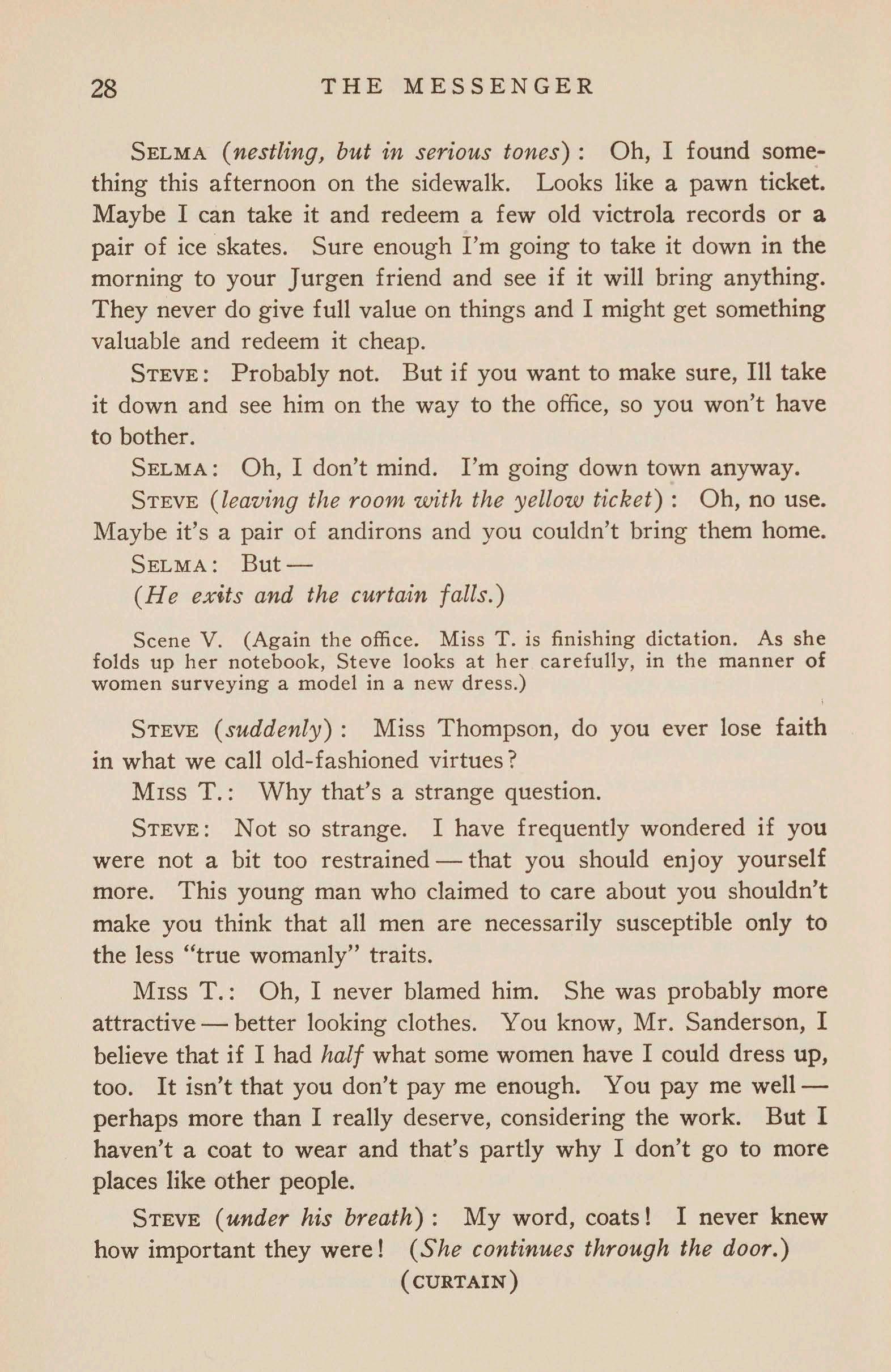
SELMA (nestling, but in serious tones): Oh, I found something this afternoon on the sidewalk. Looks like a pawn ticket. Maybe I can take it and redeem a few old victrola records or a pair of ice skates. Sure enough I'm going to take it down in the morning to your Jurgen friend and see if it will bring anything. They never do give full value on things and I might get something valuable and redeem it cheap.
STEVE: Probably not. But if you want to make sure, Ill take it down and see him on the way to the office, so you won't have to bother.
SELMA: Oh, I don't mind. I'm going down town anyway.
STEVE(leaving the room with the yellow ticket): Oh, no use. Maybe it's a pair of andirons and you couldn't bring them home.
SELMA: But(He exits and the curtain falls.)
Scene V (Again the office. Miss T. is finishing dictation. As she folds up her notebook, Steve looks at her carefully, in the manner of women surveying a model in a new dress.)
STEVE (suddenly) : Miss Thompson, do you ever lose faith in what we call old-fashioned virtues?
Miss T.: Why that's a strange question.
STEVE: Not so strange. I have frequently wondered if you were not a bit too restrained -that you should enjoy yourself more. This young man who claimed to care about you shouldn't make you think that all men are necessarily susceptible only to the less "true womanly" traits.
Miss T.: Oh, I never blamed him. She was probably more attractive -better looking clothes. You know, Mr. Sanderson, I believe that if I had half what some women have I could dress up, too. It isn't that you don't pay me enough. You pay me wellperhaps more than I really deserve, considering the work. But I haven't a coat to wear and that's partly why I don't go to more places like other people.
STEVE ( under his breath) : My word, coats! I never knew how important they were! (She continues through the door.)
( CURTAIN)
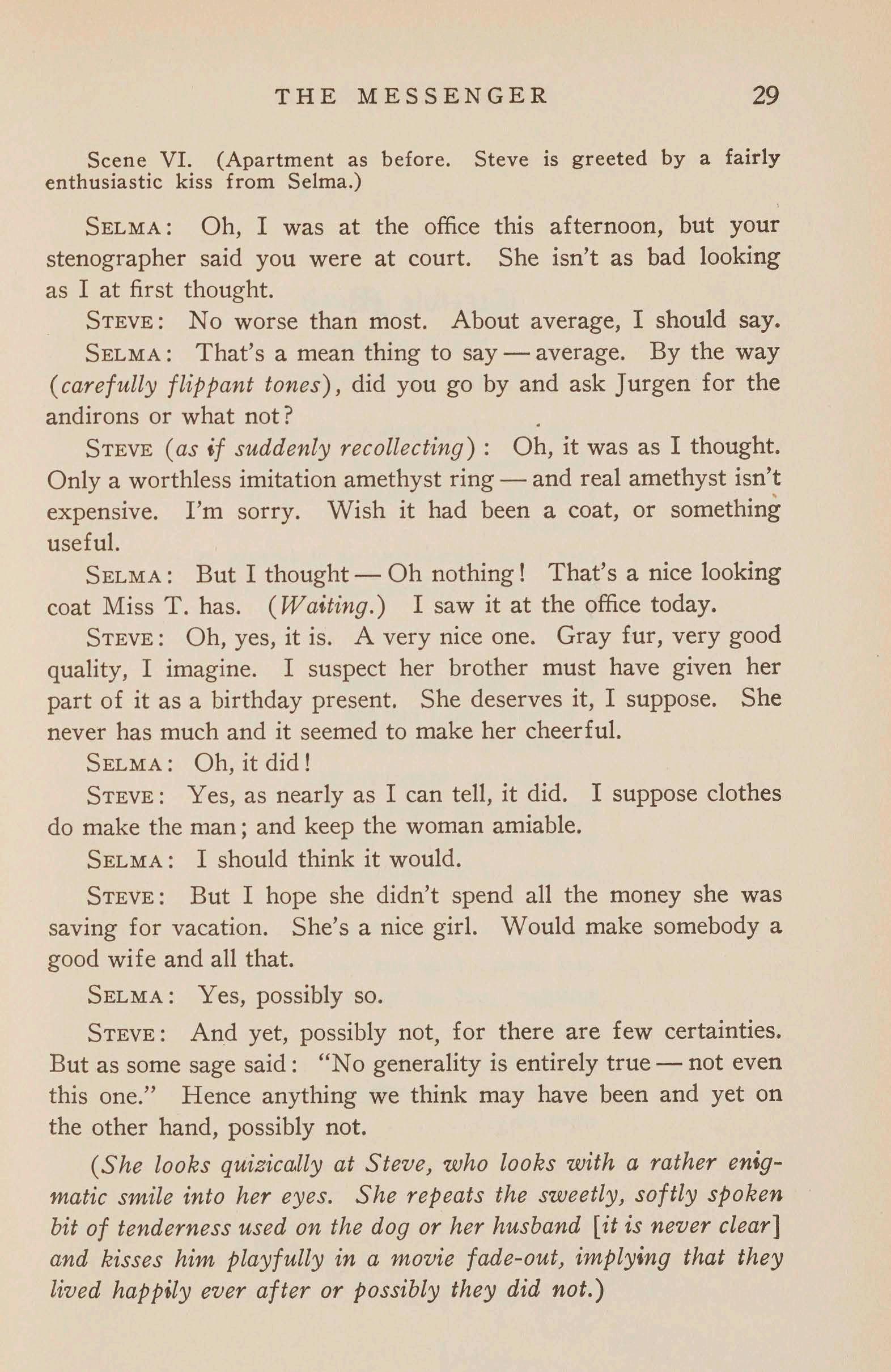
Scene VI. (Apartment as before. Steve is greeted by a fairly enthusiastic kiss from Selma.)
SELMA: Oh, I was at the office this afternoon, but your stenographer said you were at court. She isn't as bad looking as I at first thought.
STEVE: No worse than most. About average, I should say.
SELMA: That's a mean thing to say-average. By the way ( carefully flippant tones), did you go by and ask Jurgen for the andirons or what not?
STEVE( as if suddenly recollecting) : Oh, it was as I thought. Only a worthless imitation amethyst ring -and real amethyst isn't expensive. I'm sorry. Wish it had been a coat, or something useful.
SELMA: But I thought-Oh nothing! That's a nice looking coat Miss T. has. (Waiting.) I saw it at the office today.
STEVE: Oh, yes, it is . A very nice one . Gray fur, very good quality, I imagine. I suspect her brother must have given her part of it as a birthday present. She deserves it, I suppose. She never has much and it seemed to make her cheerful.
SELMA: Oh, it did!
STEVE: Yes, as nearly as I can tell, it did. I suppose clothes do make the man ; and keep the woman amiable.
SELMA: I should think it would.
STEVE: But I hope she didn't spend all the money she was saving for vacation. She's a nice girl. Would make somebody a good wife and all that.
SELMA: Yes, possibly so.
STEVE: And yet, possibly not, for there are few certainties. But as some sage said : "No generality is entirely true -not even this one." Hence anything we think may have been and yet on the other hand, possibly not.
(She looks quizically at Steve, who looks with a rather enigmatic smile into her eyes. She repeats the sweetly, softly spoken bit of tenderness used on the dog or her husband [it is never clear] and kisses him playfully in a movie fade-out, implying that they lived happily ever after or possibly they did not.)
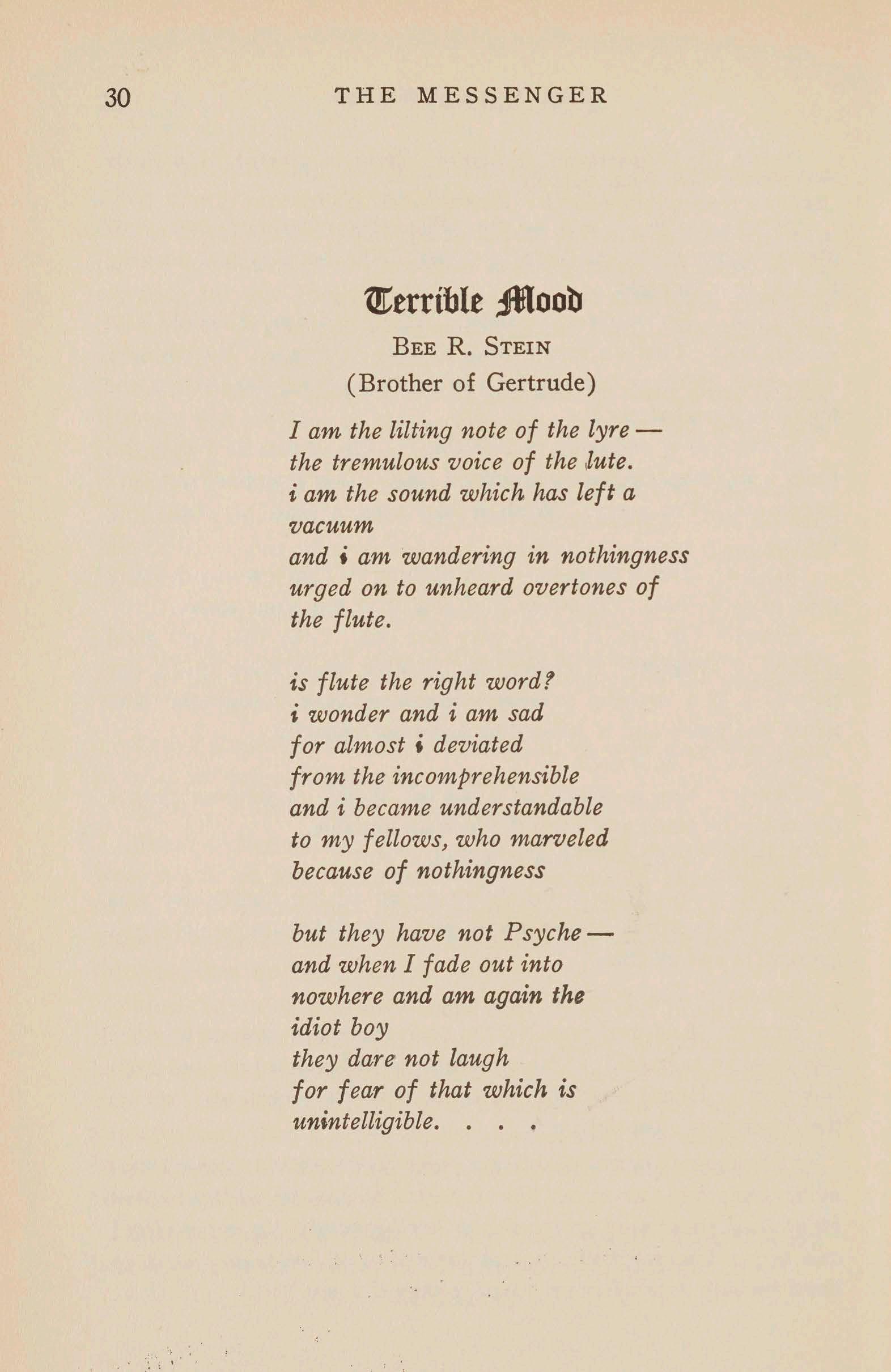
~trriblt ;§!loob
BEER. STEIN
(Brother of Gertrude)
I am the lilting note of the lyrethe tremulous voice of the ,lute. i am the sound which has left a vacuum and • am wandering in nothingness urged on to unheard overtones of the flute.
is flute the right word! i wonder and i am sad for almost • deviated from the incomprehensible and i became understandable to my fellows, who marveled because of nothingness but they have not Psycheand when I fade out into nowhere and am again the idiot boy they dare not laugh for fear of that which is unintelligible. . . .
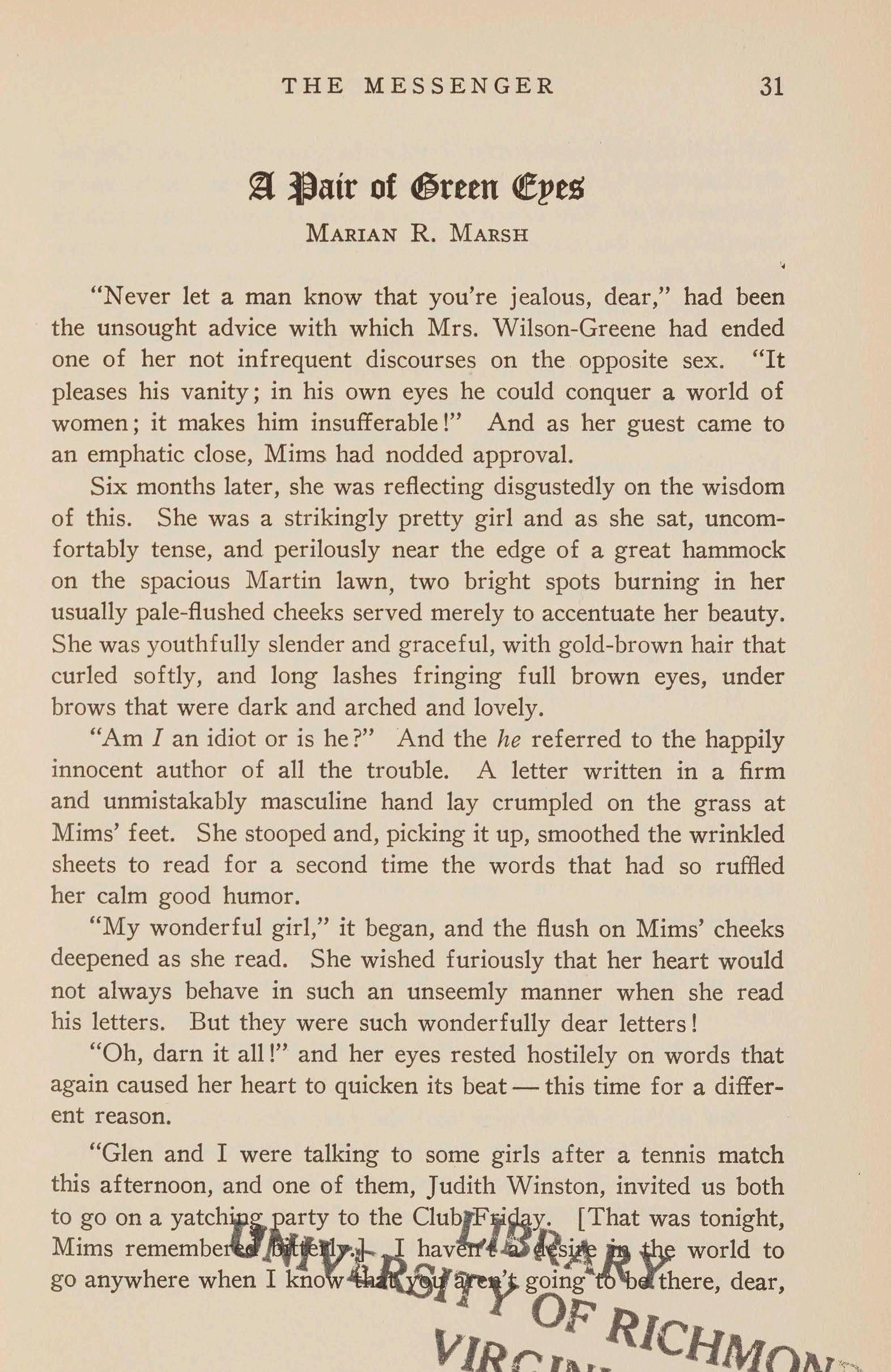
~air of ~rttn Qfpt~
MARIAN R. MARSH
"Never let a man know that you're jealous, dear," had been the unsought advice with which Mrs. Wilson-Greene had ended one of her not infrequent discourses on the opposite sex. "It pleases his vanity; in his own eyes he could conquer a world of women; it makes him insufferable !" And as her guest came to an emphatic close, Mims had nodded approval.
Six months later, she was reflecting disgustedly on the wisdom of this. She was a strikingly pretty girl and as she sat, uncomfortably tense, and perilously near the edge of a great hammock on the spacious Martin lawn, two bright spots burning in her usually pale-flushed cheeks served merely to accentuate her beauty. She was youthfully slender and graceful, with gold-brown hair that curled softly, and long lashes fringing full brown eyes, under brows that were dark and arched and lovely.
"Am I an idiot or is he?" And the he ref erred to the happily innocent author of all the trouble. A letter written in a firm and unmistakably masculine hand lay crumpled on the grass at Mims' feet. She stooped and, picking it up, smoothed the wrinkled sheets to read for a second time the words that had so ruffled her calm good humor.
"My wonderful girl," it began, and the flush on Mims' cheeks deepened as she read. She wished furiously that her heart would not always behave in such an unseemly manner when she read his letters. But they were such wonderfully dear letters !
"Oh, darn it all !" and her eyes rested hostilely on words that again caused her heart to quicken its beat - this time for a different reason.
"Glen and I were talking to some girls after a tennis match this afternoon, and one of them, Judith Winston, invited us both to _goon a yatchif._.r!rty to the ClubJF;i~Y.- . [T~at was tonight, Mims remembeiV.lf¥fllT:~~~avtrf~..Uijsjl'f D world to go anywhere when I kno~~v~r going t'fi'hlthere,dear,
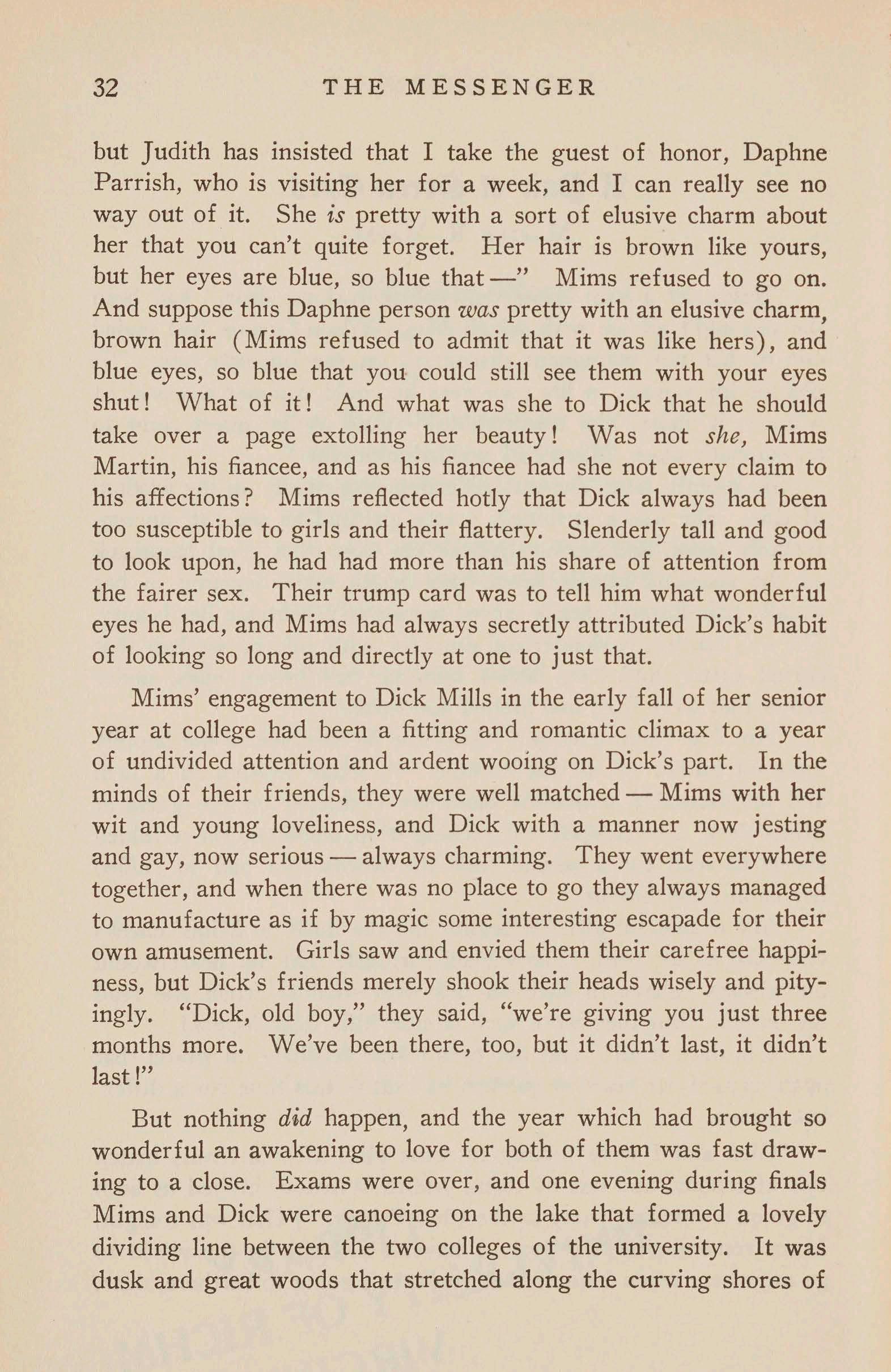
but Judith has insisted that I take the guest of honor, Daphne Parrish, who is visiting her for a week, and I can really see no way out of it. She is pretty with a sort of elusive charm about her that you can't quite forget. Her hair is brown like yours, but her eyes are blue, so blue that-" Mims refused to go on. And suppose this Daphne person was pretty with an elusive charm, brown hair ( Mims refused to admit that it was like hers), and blue eyes, so blue that you could still see them with your eyes shut! What of it! And what was she to Dick that he should take over a page extolling her beauty! Was not she, Mims Martin, his fiancee, and as his fiancee had she not every claim to his affections? Mims reflected hotly that Dick always had been too susceptible to girls and their flattery. Slenderly tall and good to look upon, he had had more than his share of attention from the fairer sex. Their trump card was to tell him what wonderful eyes he had, and Mims had always secretly attributed Dick's habit of looking so long and directly at one to just that.
Mims' engagement to Dick Mills in the early fall of her senior year at college had been a fitting and romantic climax to a year of undivided attention and ardent wooing on Dick's part. In the minds of their friends, they were well matched -Mims with her wit and young loveliness, and Dick with a manner now jesting and gay, now serious -always charming. They went everywhere together, and when there was no place to go they always managed to manufacture as if by magic some interesting escapade for their own amusement. Girls saw and envied them their carefree happiness, but Dick's friends merely shook their heads wisely and pityingly. "Dick, old boy," they said, "we're giving you just three months more. We've been there, too, but it didn't last, it didn't last!"
But nothing did happen, and the year which had brought so wonderful an awakening to love for both of them was fast drawing to a close. Exams were over, and one evening during finals Mims and Dick were canoeing on the lake that formed a lovely dividing line between the two colleges of the university. It was dusk and great woods that stretched along the curving shores of
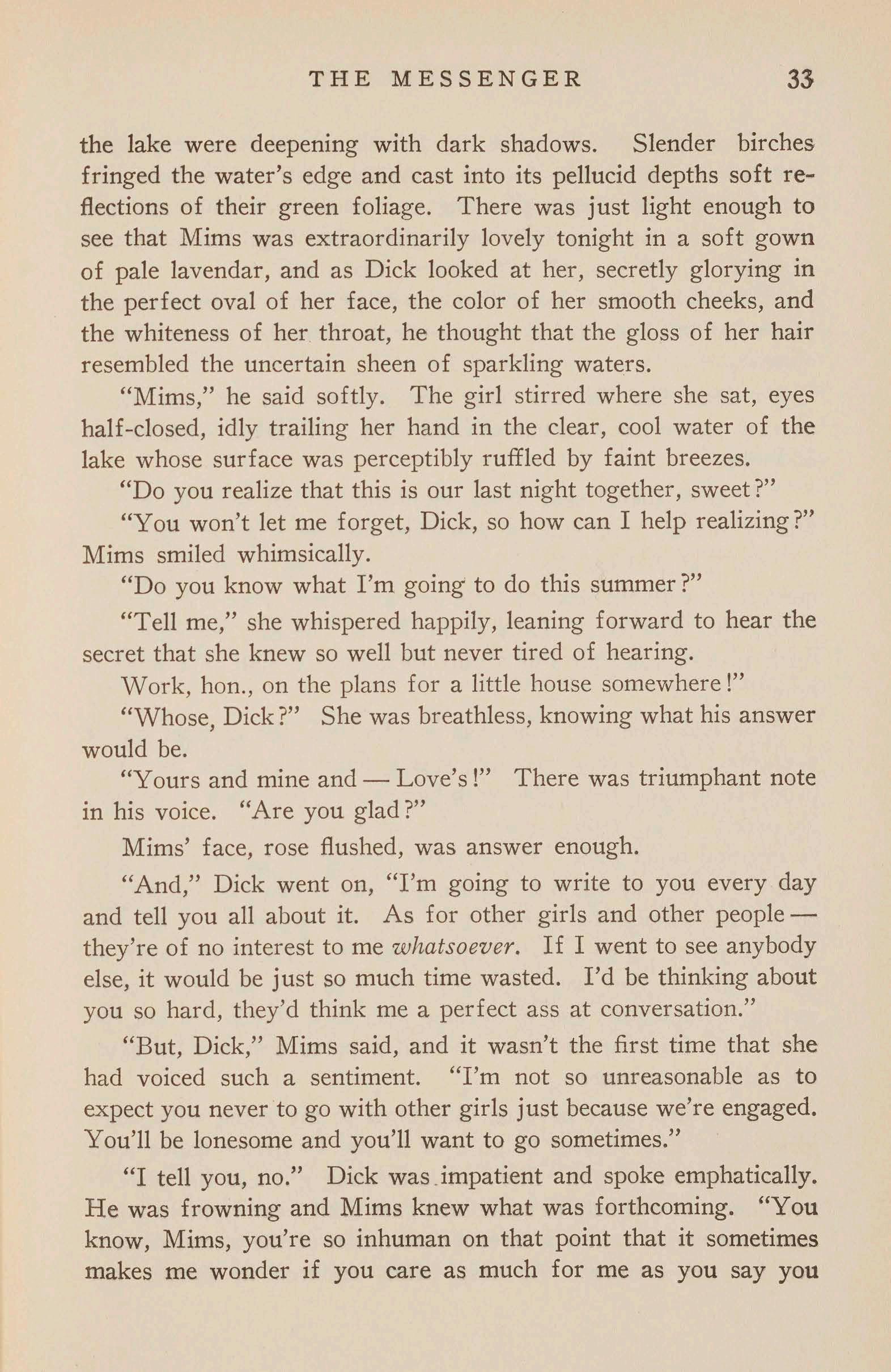
the lake were deepening with dark shadows. Slender birches fringed the water's edge and cast into its pellucid depths soft reflections of their green foliage. There was just light enough to see that Mims was extraordinarily lovely tonight in a soft gown of pale lavendar, and as Dick looked at her, secretly glorying in the perfect oval of her face, the color of her smooth cheeks, and the whiteness of her throat, he thought that the gloss of her hair resembled the uncertain sheen of sparkling waters.
"Mims," he said softly. The girl stirred where she sat, eyes half-closed, idly trailing her hand in the clear, cool water of the lake whose surface was perceptibly ruffled by faint breezes.
"Do you realize that this is our last night together, sweet?"
"You won't let me forget, Dick, so how can I help realizing?"
Mims smiled whimsically.
"Do you know what I'm going to do this summer?"
"Tell me," she whispered happily, leaning forward to hear the secret that she knew so well but never tired of hearing. Work, hon., on the plans for a little house somewhere!"
"Whose, Dick?" She was breathless, knowing what his answer would be.
"Yours and mine and-Love's!" There was triumphant note in his voice. "Are you glad?"
Mims' face, rose flushed, was answer enough.
"And," Dick went on, "I'm going to write to you every day and tell you all about it. As for other girls and other peoplethey're of no interest to me whatsoever. If I went to see anybody else, it would be just so much time wasted. I'd be thinking about you so hard, they'd think me a perfect ass at conversation."
"But, Dick," Mims said, and it wasn't the first time that she had voiced such a sentiment. "I'm not so unreasonable as to expect you never to go with other girls just because we're engaged. You'll be lonesome and you'll want to go sometimes."
"I tell you, no." Dick was .impatient and spoke emphatically. He was frowning and Mims knew what was forthcoming. "You know, Mims, you're so inhuman on that point that it sometimes makes me wonder if you care as much for me as you say you
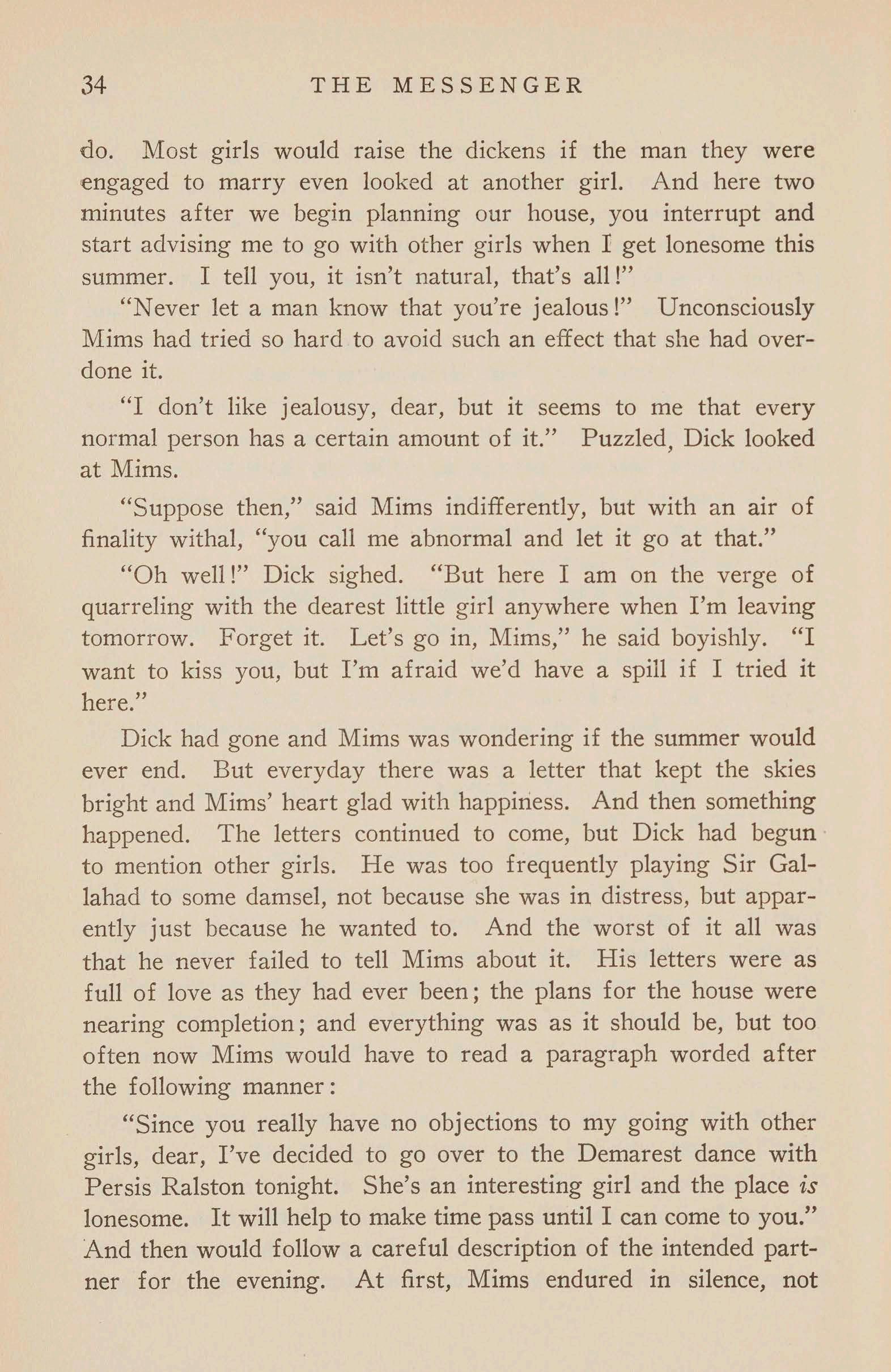
do. Most girls would raise the dickens if the man they were ,engaged to marry even looked at another girl. And here two minutes after we begin planning our house, you interrupt and start advising me to go with other girls when I get lonesome this summer. I tell you, it isn't natural, that's all!"
"Never let a man know that you're jealous!" Unconsciously Mims had tried so hard to avoid such an effect that she had overdone it.
"I don't like jealousy, dear, but it seems to me that every normal person has a certain amount of it." Puzzled, Dick looked at Mims.
"Suppose then," said Mims indifferently, but with an air of finality withal, "you call me abnormal and let it go at that."
"Oh well!" Dick sighed. "But here I am on the verge of quarreling with the dearest little girl anywhere when I'm leaving tomorrow. Forget it. Let's go in, Mims," he said boyishly. "I want to kiss you, but I'm afraid we'd have a spill if I tried it here."
Dick had gone and Mims was wondering if the summer would ever end. But everyday there was a letter that kept the skies bright and Mims' heart glad with happiriess. And then something happened. The letters continued to come, but Dick had begun to mention other girls. He was too frequently playing Sir Gallahad to some damsel, not because she was in distress, but apparently just because he wanted to. And the worst of it all was that he never failed to tell Mims about it. His letters were as full of love as they had ever been; the plans for the house were nearing completion; and everything was as it should be, but too often now Mims would have to read a paragraph worded after the following manner :
"Since you really have no objections to my going with other girls, dear, I've decided to go over to the Demarest dance with Persis Ralston tonight. She's an interesting girl and the place is lonesome. It will help to make time pass until I can come to you." And then would follow a careful description of the intended partner for the evening. At first, Mims endured in silence, not
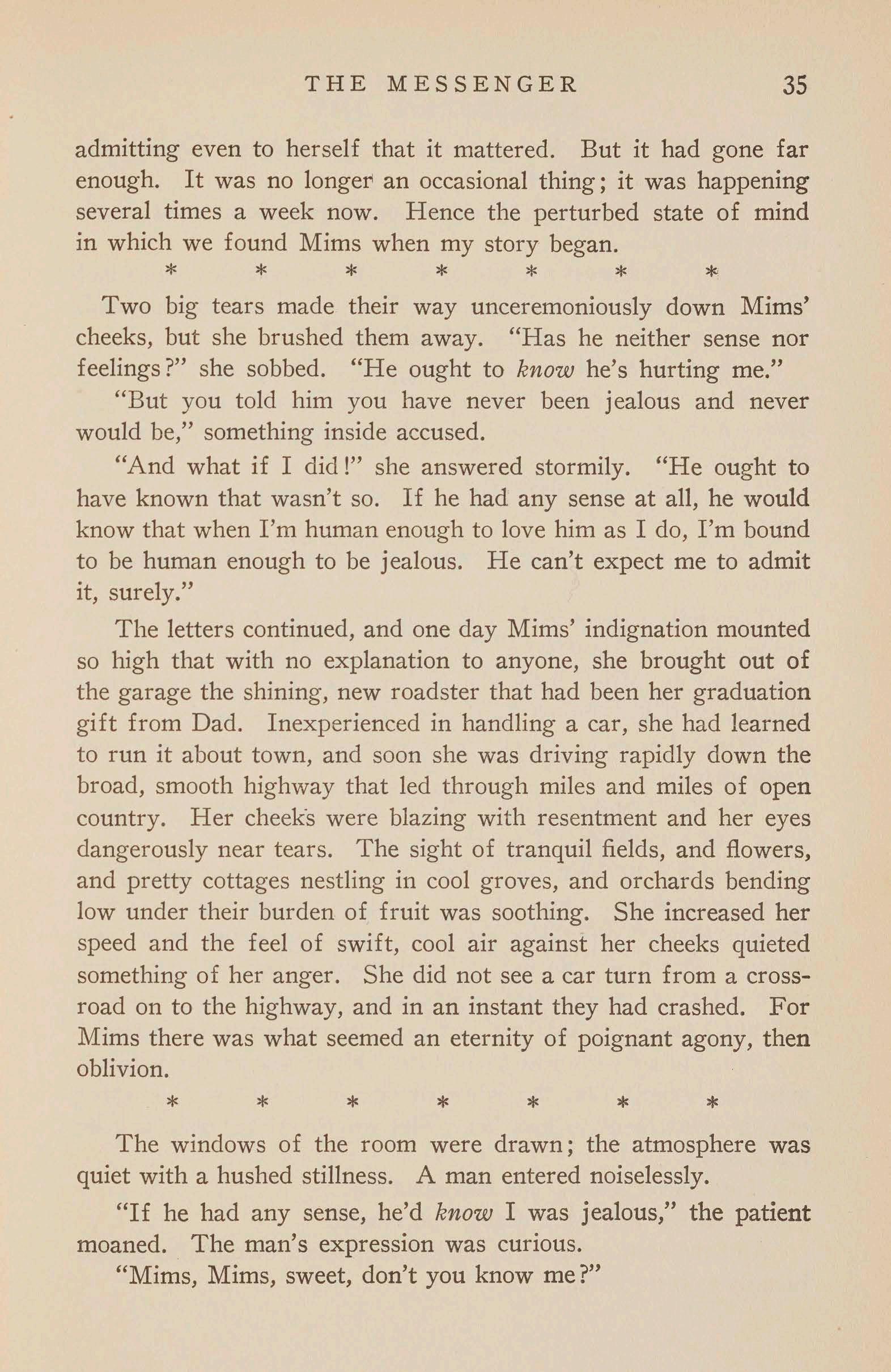
admitting even to herself that it mattered. But it had gone far enough. It was no longer an occasional thing; it was happening several times a week now. Hence the perturbed state of mind in which we found Mims when my story began.
Two big tears made their way unceremoniously down Mims' cheeks, but she brushed them away. "Has he neither sense nor feelings?" she sobbed. "He ought to know he's hurting me."
"But you told him you have never been jealous and never would be," something inside accused.
"And what if I did!" she answered stormily. "He ought to have known that wasn't so. If he had any sense at all, he would know that when I'm human enough to love him as I do, I'm bound to be human enough to be jealous. He can't expect me to admit it, surely."
The letters continued, and one day Mims' indignation mounted so high that with no explanation to anyone, she brought out of the garage the shining, new roadster that had been her graduation gift from Dad. Inexperienced in handling a car, she had learned to run it about town, and soon she was driving rapidly down the broad, smooth highway that led through miles and miles of open country. Her cheeks were blazing with resentment and her eyes dangerously near tears. The sight of tranquil fields, and flowers, and pretty cottages nestling in cool groves, and orchards bending low under their burden of fruit was soothing. She increased her speed and the feel of swift, cool air against her cheeks quieted something of her anger. She did not see a car turn from a crossroad on to the highway, and in an instant they had crashed. For Mims there was what seemed an eternity of poignant agony, then oblivion.
The windows of the room were drawn; the atmosphere was quiet with a hushed stillness. A man entered noiselessly.
"If he had any sense, he'd know I was jealous," the patient moaned. The man's expression was curious. "Mims, Mims, sweet, don't you know me?"
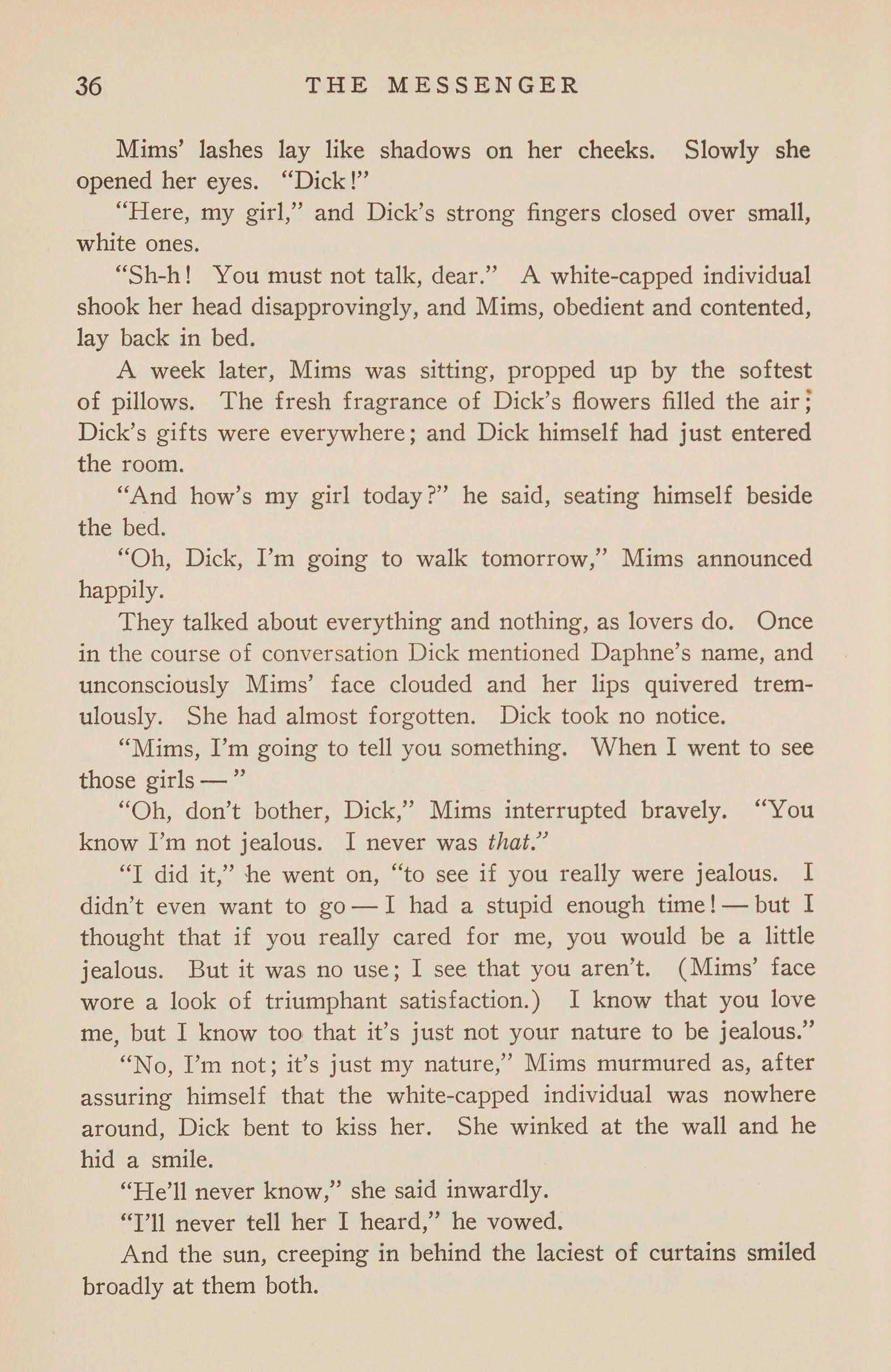
Mims' lashes lay like shadows on her cheeks. Slowly she opened her eyes. "Dick !"
"Here, my girl," and Dick's strong fingers closed over small, white ones.
"Sh-h ! You must not talk, dear." A white-capped individual shook her head disapprovingly, and Mims, obedient and contented, lay back in bed.
A week later, Mims was sitting, propped up by the softest of pillows. The fresh fragrance of Dick's flowers filled the air; Dick's gifts were everywhere; and Dick himself had just entered the room.
"And how's my girl today?" he said, seating himself beside the bed.
"Oh, Dick, I'm going to walk tomorrow," Mims announced happily.
They talked about everything and nothing, as lovers do. Once in the course of conver sation Dick mention ed Daphne's name, and unconsciously Mims' face clouded and her lips quivered tremulously . She had almost forgotten. Dick took no notice.
"Mims, I'm going to tell you something. When I went to see those girls -"
"Oh, don't bother, Dick," Mims interrupted bravely. "You know I'm not jealous. I never was that."
"I did it," he went on, "to see if you really were jealous. I didn't even want to go - I had a stupid enough time! -but I thought that if you really cared for me, you would be a little jealous. But it was no use; I see that you aren't. (Mims' face wore a look of triumphant satisfaction.) I know that you love me, but I know too that it's just not your nature to be jealous."
"No, I'm not; it's just my nature," Mims murmured as, after assuring himself that the white-capped individual was nowhere around, Dick bent to kiss her. She winked at the wall and he hid a smile.
"He'll never know," she said inwardly.
"I'll never tell her I heard," he vowed. And the sun, creeping in behind the laciest of curtains smiled broadly at them both.
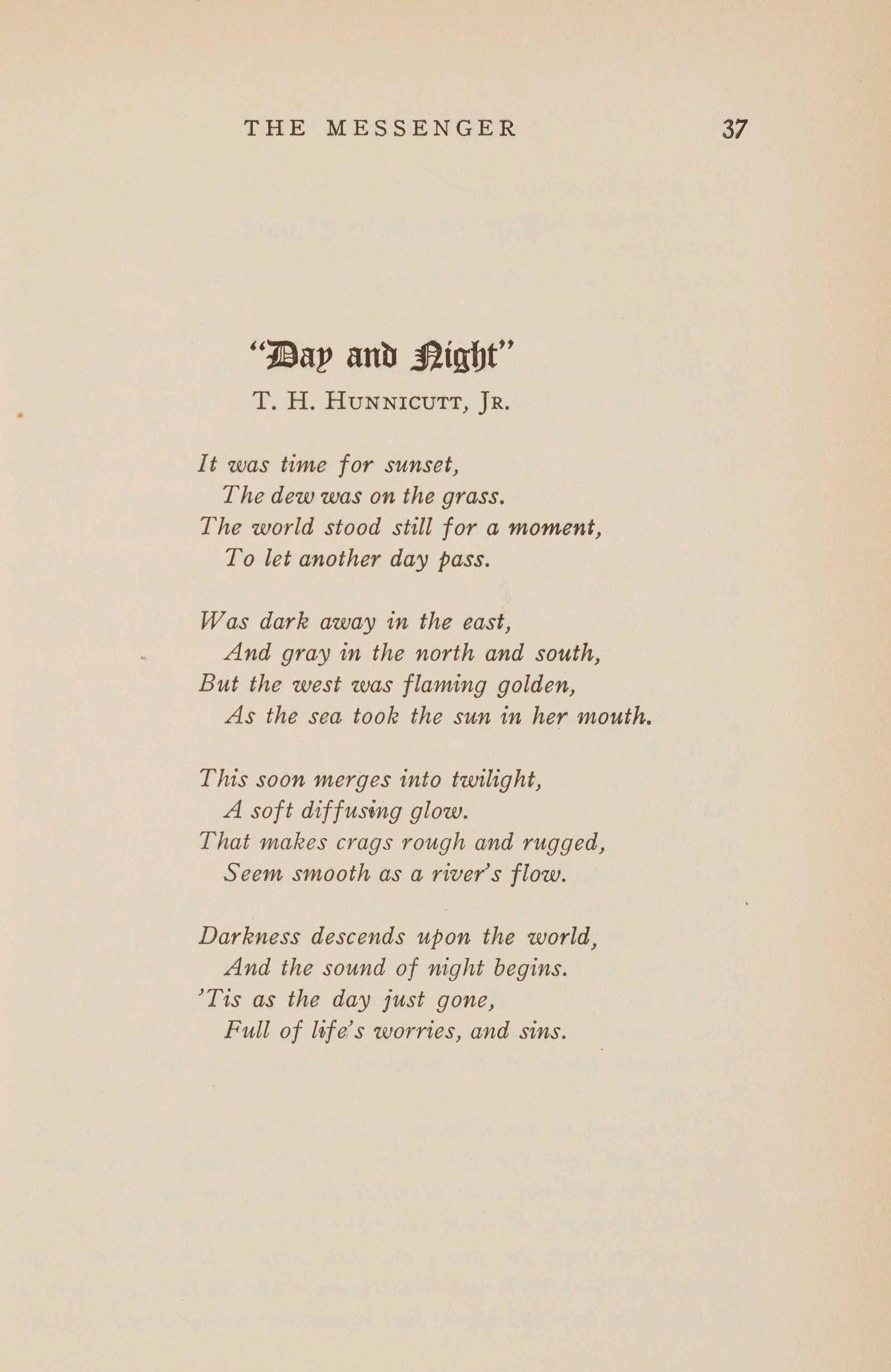
"U\apanb~igbt"
T. H. HUNNICUTT, JR.
It was time for sunset, The dew was on the grass. The world stood still for a moment, To let another day pass.
Was dark away in the east, And gray in the north and south, But the west was flaming golden, As the sea took the sun in her mouth.
This soon merges into twilight, A soft diffusing glow. That makes crags rough and rugged, Seem smooth as a river's flow.
Darkness descends upon the world, And the sound of night begins. 'Tis as the day just gone, Full of life ' s worries, and sins.
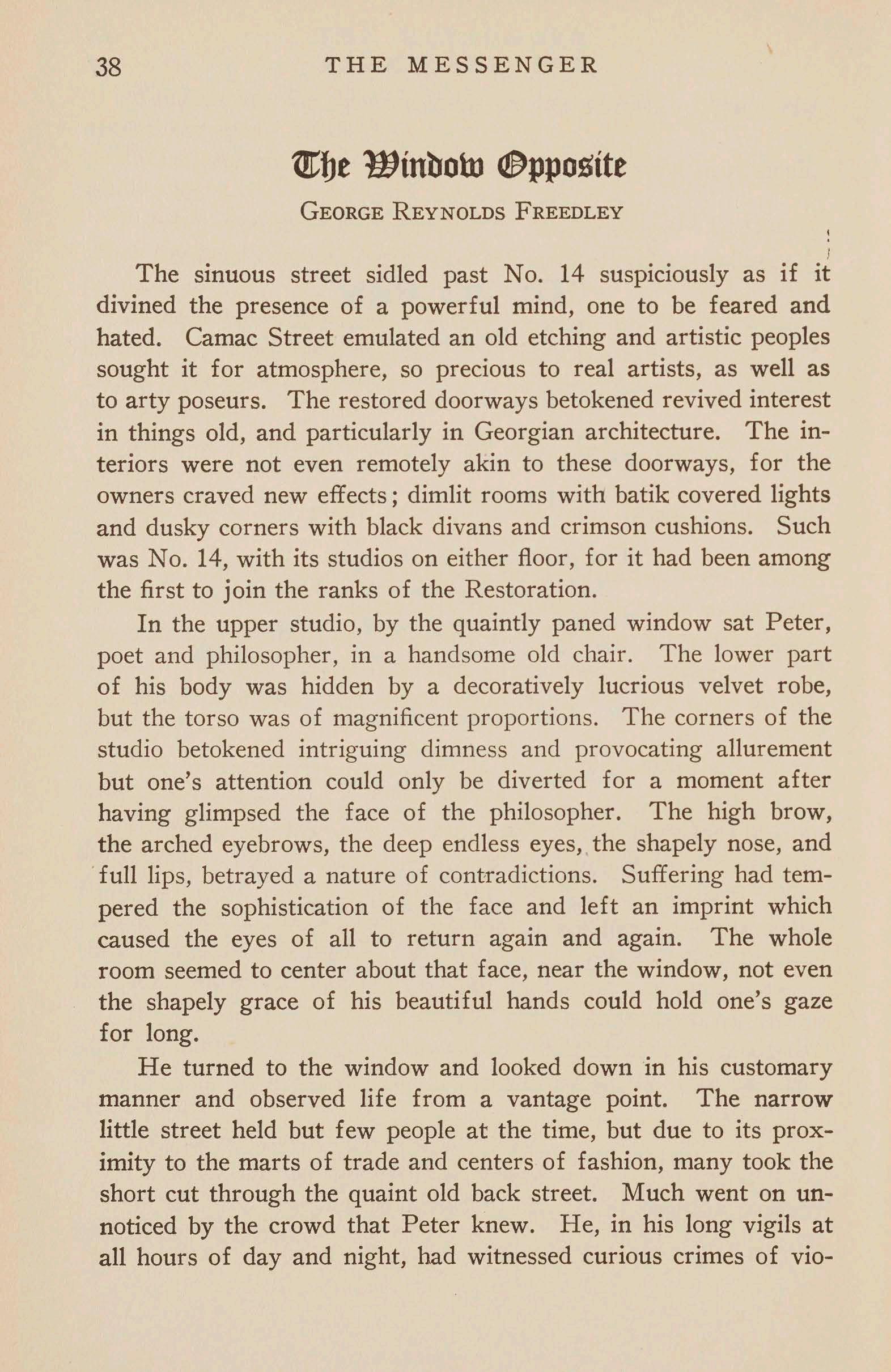
~bt Winboltl@ppo~itt
GEORGE REYNOLDS FREEDLEY
The sinuous street sidled past No. 14 suspiciously as if it divined the presence of a powerful mind, one to be feared and hated. Camac Street emulated an old etching and artistic peoples sought it for atmosphere, so precious to real artists, as well as to arty poseurs. The restored doorways betokened revived interest in things old, and particularly in Georgian architecture. The interiors were not even remotely akin to these doorways, for the owners craved new effects; dimlit rooms with batik covered lights and dusky corners with black divans and crimson cushions. Such was No. 14, with its studios on either floor, for it had been among the first to join the ranks of the Restoration.
In the upper studio, by the quaintly paned window sat Peter, poet and philosopher, in a handsome old chair. The lower part of his body was hidden by a decoratively lucrious velvet robe, but the torso was of magnificent proportions. The corners of the studio betokened intriguing dimness and provocating allurement but one's attention could only be diverted for a moment after having glimpsed the face of the philosopher. The high brow, the arched eyebrows, the deep endless eyes, the shapely nose, and full lips, betrayed a nature of contradictions. Suffering had tempered the sophistication of the face and left an imprint which caused the eyes of all to return again and again. The whole room seemed to center about that face, near the window, not even the shapely grace of his beautiful hands could hold one's gaze for long.
He turned to the window and looked down in his customary manner and observed life from a vantage point. The narrow little street held but few people at the time, but due to its proximity to the marts of trade and centers of fashion, many took the short cut through the quaint old back street. Much went on unnoticed by the crowd that Peter knew. He, in his long vigils at all hours of day and night, had witnessed curious crimes of vio-
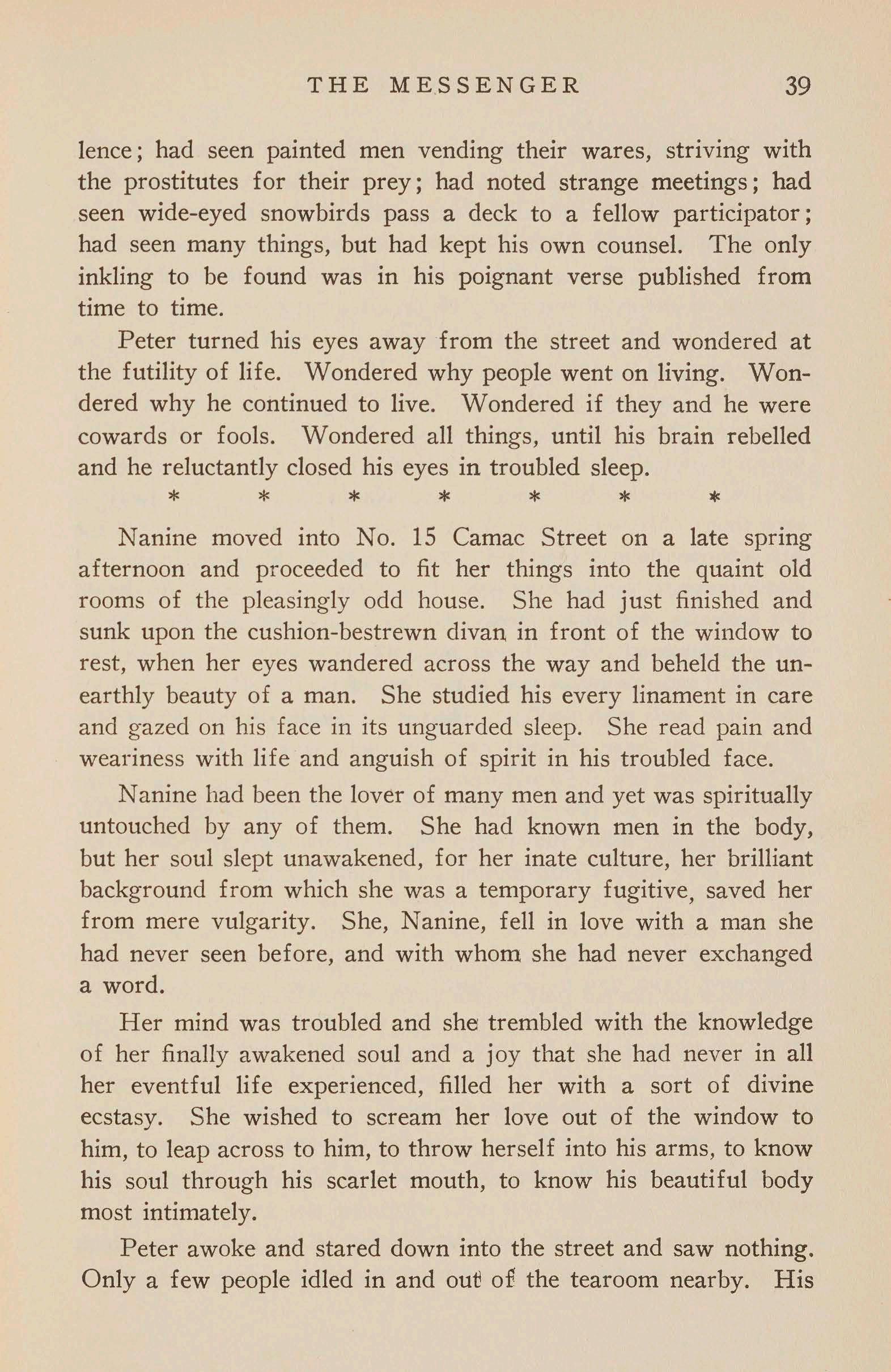
lence; had seen painted men vending their wares, striving with the prostitutes for their prey; had noted strange meetings ; had seen wide-eyed snowbirds pass a deck to a fell ow participator; had seen many things, but had kept his own counsel. The only inkling to be found was in his poignant verse published from time to time.
Peter turned his eyes away from the street and wondered at the futility of life. Wondered why people went on living. Wondered why he continued to live. Wondered if they and he were cowards or fools. Wondered all things, until his brain rebelled and he reluctantly closed his eyes in troubled sleep.
Nanine moved into No. 15 Camac Street on a late spring afternoon and proceeded to fit her things into the quaint old rooms of the pleasingly odd house. She had just finished and sunk upon the cushion-bestrewn divan in front of the window to rest, when her eyes wandered across the way and beheld the unearthly beauty of a man. She studied his every linament in care and g azed on his face in its unguarded sleep. She read pain and weariness with life and anguish of spirit in his troubled face.
Nanine had been the lover of many men and yet was spiritually untouched by any of them. She had known men in the body, but her soul slept unawakened, for her inate culture, her brilliant background from which she was a temporary fugitive, saved her from mere vulgarity. She, Nanine, fell in love with a man she had never seen before, and with whom she had never exchanged a word.
Her mind was troubled and sh~ trembled with the knowledge of her finally awakened soul and a joy that she had never in all her eventful life experienced, filled her with a sort of divine ecstasy. She wished to scream her love out of the window to him, to leap across to him, to throw herself into his arms, to know his soul through his scarlet mouth, to know his beautiful body most intimately.
Peter awoke and stared down into the street and saw nothing. Only a few people idled in and out or the tearoom nearby. His

eyes wandered as was their wont to the windows of nearby houses. He looked straight across and saw a beautiful woman with face contorted with strange joy. He gazed on her and realized that, though at one time he had known many women most intimately, none had been so exquisite as she. He, usually so cold of late because of enforced restraint, felt an answering fire swirl through his veins which had been so sluggish, and melt his bones in its white heat, and set his brain afire. He knew that he had never wanted a woman as much as he desired the woman in the window opposite. None of this was apparent in his face, for he had schooled himself to mask his pain and only his eyes, like cathedral shadows, revealed his thoughts and Nanine was too far away to read them. His seeming cold stare caused her to shiver and all the joy left her face. Her body, so straight with desire, crumpled and a greyness settled over her. Then she realized that she should not hope for immediate answer to this strange passion that she so little understood. Her haunting smile returned and she unconsciously began to make use of the coqueteries which long practice had made well nigh perfect. Had she thought of this perfection, it would not have shamed her, for there was no false modesty in her. Peter saw it all and desired her, but his reason commanded silence, though his heart implored one exclamation of joy and love. Cold judgment made him realize that he must wait and see if this love of hers were so uncommon as to understand.
The byplay on her part and the statuelike stillness on him continued from day to day, until she had used every allurement in her power and still he sat silent and stony-faced. Her soul in its agony was torn by stubborn pride and fierce love ; and the conflict between a desire to go immediately and one that counseled trying the one expedient left, jealousy, continued until the latter won at the expense of her spirit. Convulsed with desire and struggling with pride, she determined on this last desperate expedient.
A brief note brought an insistant lover to her side, from which he had been kept from ignorance of her whereabouts. She drew
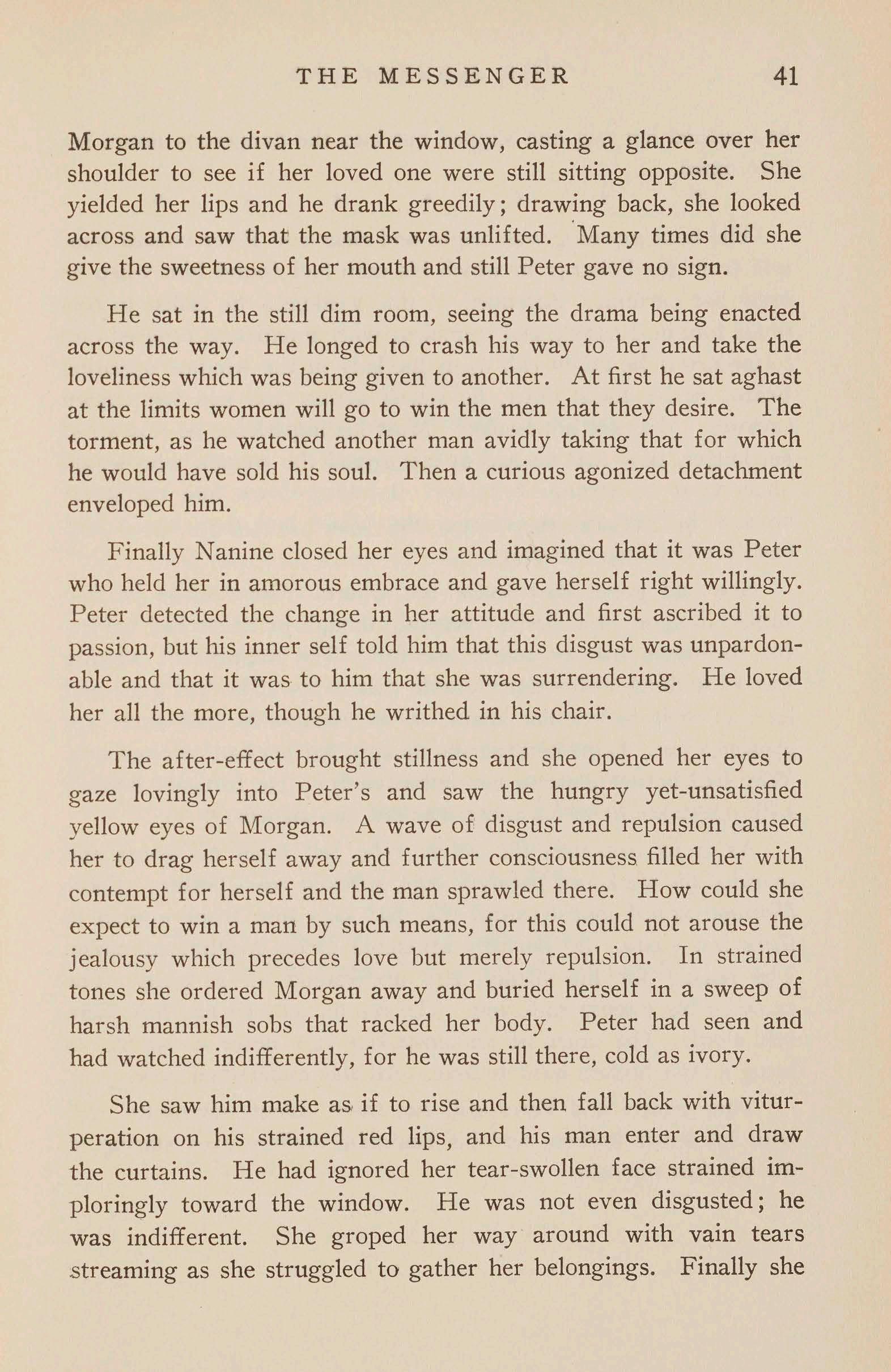
Morgan to the divan near the window, casting a glance over her shoulder to see if her loved one were still sitting opposite. She yielded her lips and he drank greedily; drawing back, she looked across and saw that the mask was unlifted. ·Many times did she give the sweetness of her mouth and still Peter gave no sign.
He sat in the still dim room, seeing the drama being enacted across the way. He longed to crash his way to her and take the loveliness which was being given to another. At first he sat aghast at the limits women will go to win the men that they desire. The torment, as he watched another man avidly taking that for which he would have sold his soul. Then a curious agonized detachment enveloped him.
Finally Nanine closed her eyes and imagined that it was Peter who held her in amorous embrace and gave herself right willingly. Peter detected the change in her attitude and first ascribed it to passion, but his inner self told him that this disgust was unpardonable and that it was to him that she was surrendering. He loved her all the more, though he writhed in his chair.
The after-effect brought stillness and she opened her eyes to gaze lovingly into Peter's and saw the hungry yet-unsatisfied yellow eyes of Morgan. A wave of disgust and repulsion caused her to drag herself away and further consciousness filled her with contempt for herself and the man sprawled there. How could she expect to win a man by such means, for this could not arouse the jealousy which precedes love but merely repulsion. In strained tones she ordered Morgan away and buried herself in a sweep of harsh mannish sobs that racked her body. Peter had seen and had watched indifferently, for he was still there, cold as ivory.
She saw him make as if to rise and then fall back with viturperation on his strained red lips, and his man enter and draw the curtains. He had ignored her tear-swollen face strained imploringly toward the window. He was not even disgusted; he was indifferent. She groped her way around with vain tears streaming as she struggled to gather her belongings. Finally she
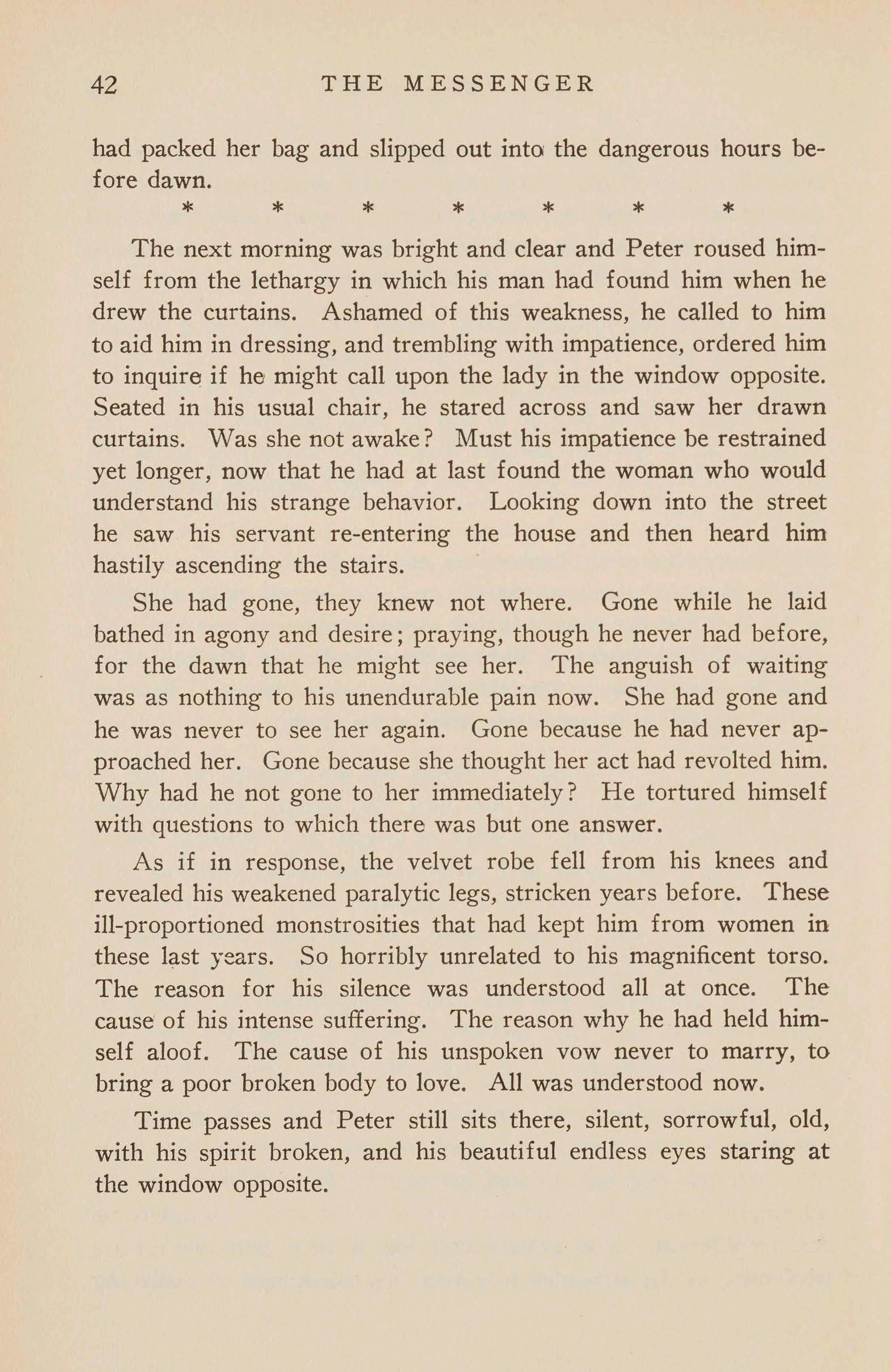
had packed her bag and slipped out into the dangerous hours before dawn.
The next morning was bright and clear and Peter roused himself from the lethargy in which his man had found him when he drew the curtains. Ashamed of this weakness, he called to him to aid him in dressing, and trembling with impatience, ordered him to inquire if he might call upon the lady in the window opposite. Seated in his usual chair, he stared across and saw her drawn curtains. Was she not awake? Must his impatience be restrained yet longer, now that he had at last found the woman who would understand his strange behavior. Looking down into the street he saw his servant re-entering the house and then heard him hastily ascending the stairs.
She had gone, they knew not where. Gone while he laid bathed in agony and desire; praying, though he never had before, for the dawn that he might see her. The anguish of waiting was as nothing to his unendurable pain now. She had gone and he was never to see her again. Gone because he had never approached her. Gone because she thought her act had revolted him. Why had he not gone to her immediately? He tortured himself with questions to which there was but one answer.
As if in response, the velvet robe fell from his knees and revealed his weakened paralytic legs, stricken years before. These ill-proportioned monstrosities that had kept him from women in these last years. So horribly unrelated to his magnificent torso. The reason for his silence was understood all at once. The cause of his intense suffering. The reason why he had held himself aloof. The cause of his unspoken vow never to marry, to bring a poor broken body to love. All was understood now.
Time passes and Peter still sits there, silent, sorrowful, old, with his spirit broken, and his beautiful endless eyes staring at the window opposite.
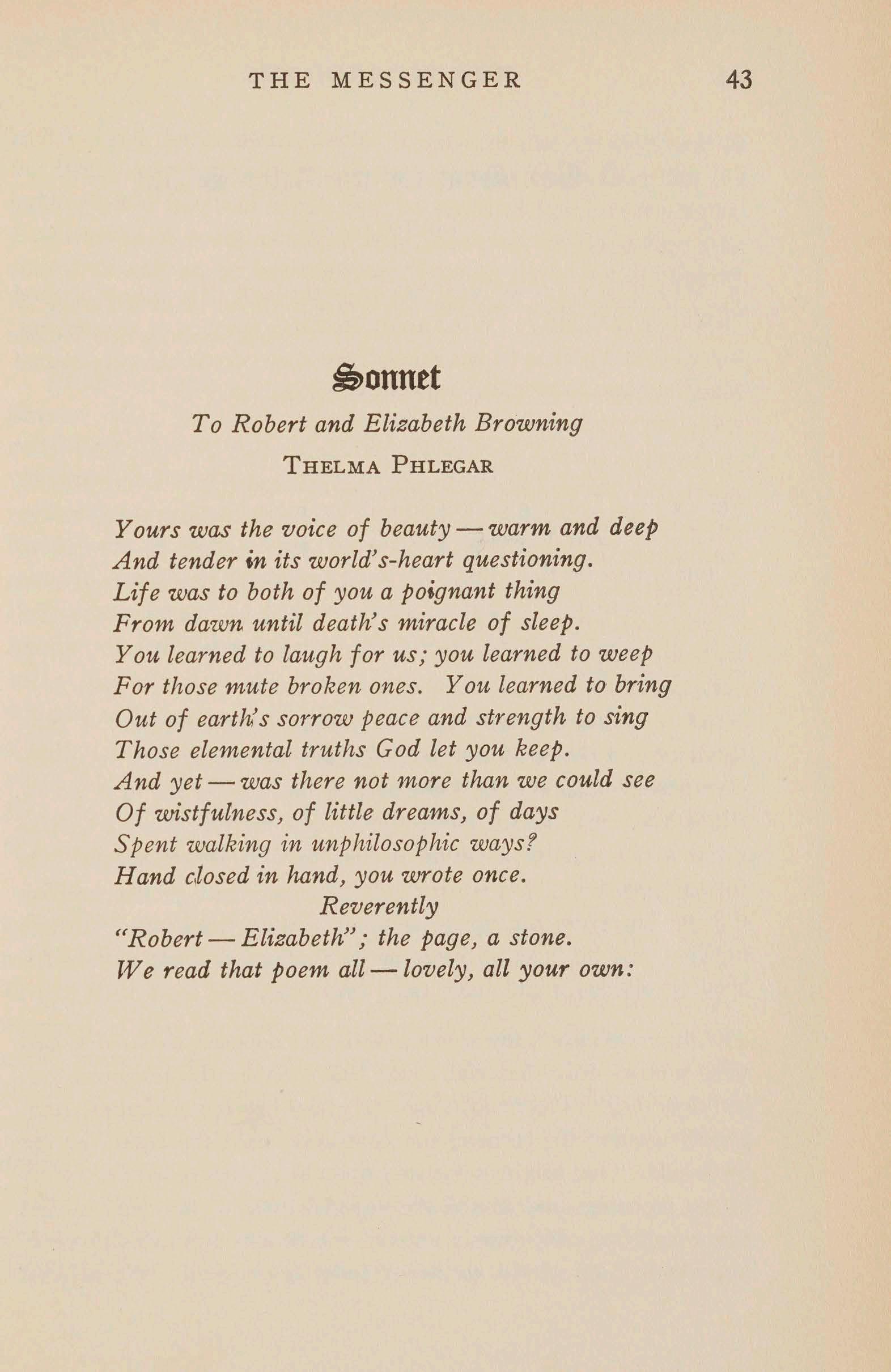
~onntt
To Robert and Elizabeth Browning
THELMA PHLEGAR
Yours was the voice of beauty -warm and deep And tender tn its world's-heart questioning. Life was to both of you a poignant thing From dawn until death's miracle of sleep. You learned to laugh for us; you learned to weep For those mute broken ones. You learned to bring Out of earth:s sorrow peace and strength to sing Those elemental truths God let you keep. And yet - was there not more than we could see Of wistfulness, of little dreams, of days Spent walking in unphilosophic ways ? Hand dosed in hand, you wrote once.
Reverently "Robert-Elizabeth"; the page, a stone. We read that poem all - lovely, all your own:
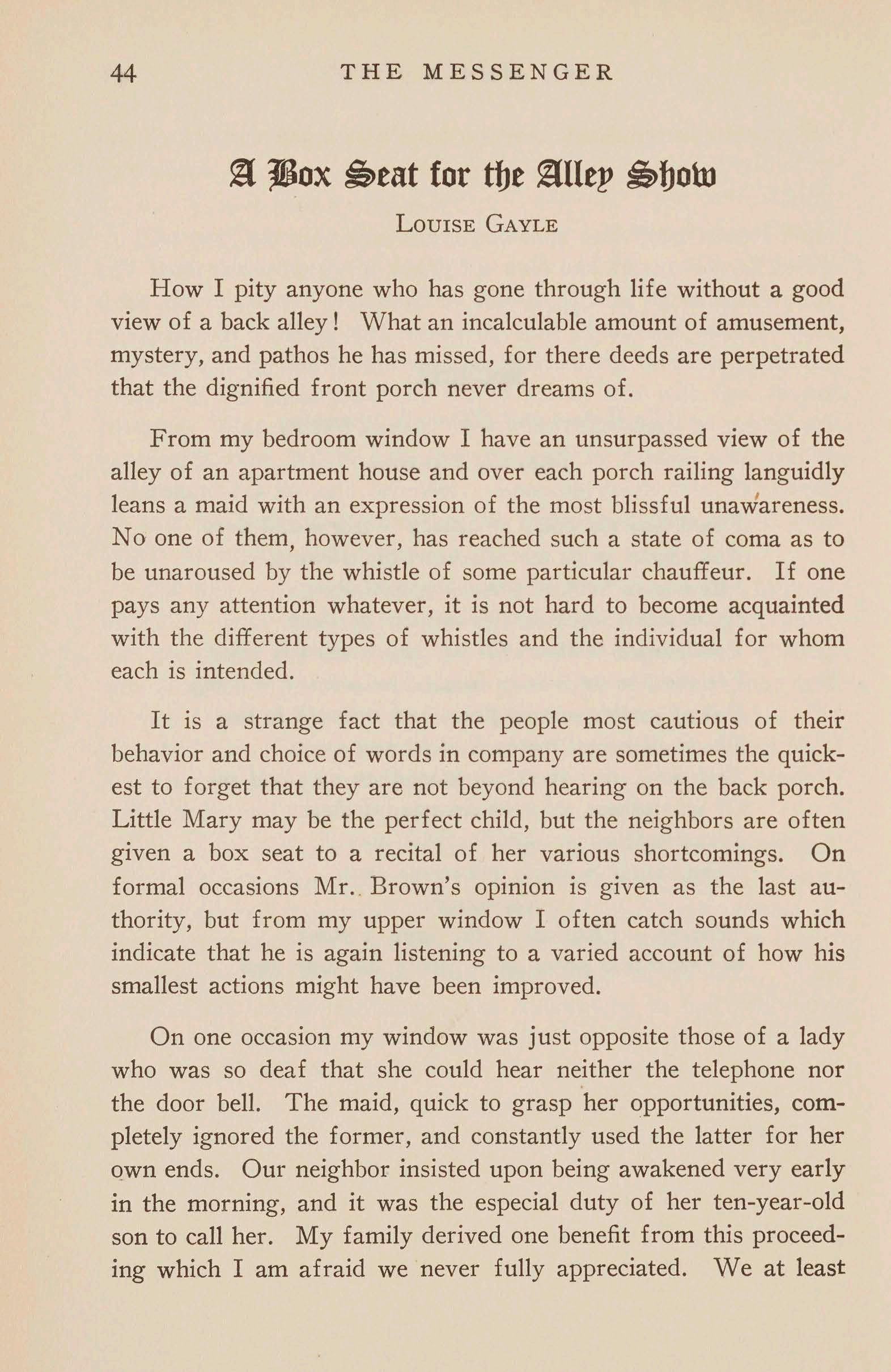
JSox~cat for tbc~lltp ~bow
LOUISE GAYLE
How I pity anyone who has gone through Ii£e without a good view of a back alley! What an incalculable amount of amusement, mystery, and pathos he has missed, for there deeds are perpetrated that the dignified front porch never dreams of.
From my bedroom window I have an unsurpassed view of the alley of an apartment house and over each porch railing languidly leans a maid with an expression of the most blissful unawareness. No one of them, however, has reached such a state of coma as to be unaroused by the whistle of some particular chauffeur. If one pays any attention whatever, it is not hard to become acquainted with the different types of whistles and the individual for whom each is intended.
It is a strange fact that the people most cautious of their behavior and choice of words in company are sometimes the quickest to forget that they are not beyond hearing on the back porch. Little Mary may be the perfect child, but the neighbors are often given a box seat to a recital of her various shortcomings. On formal occasions Mr . . Brown's opinion is given as the last authority, but from my upper window I often catch sounds which indicate that he is again listening to a varied account of how his smallest actions might have been improved.
On one occasion my window was just opposite those of a lady who was so deaf that she could hear neither the telephone nor the door bell. The maid, quick to grasp her opportunities, completely ignored the former, and constantly used the latter for her qwn ends. Our neighbor insisted upon being awakened very early in the morning, and it was the especial duty of her ten-year-old son to call her. My family derived one benefit from this proceeding which I am afraid we never fully appreciated. We at least
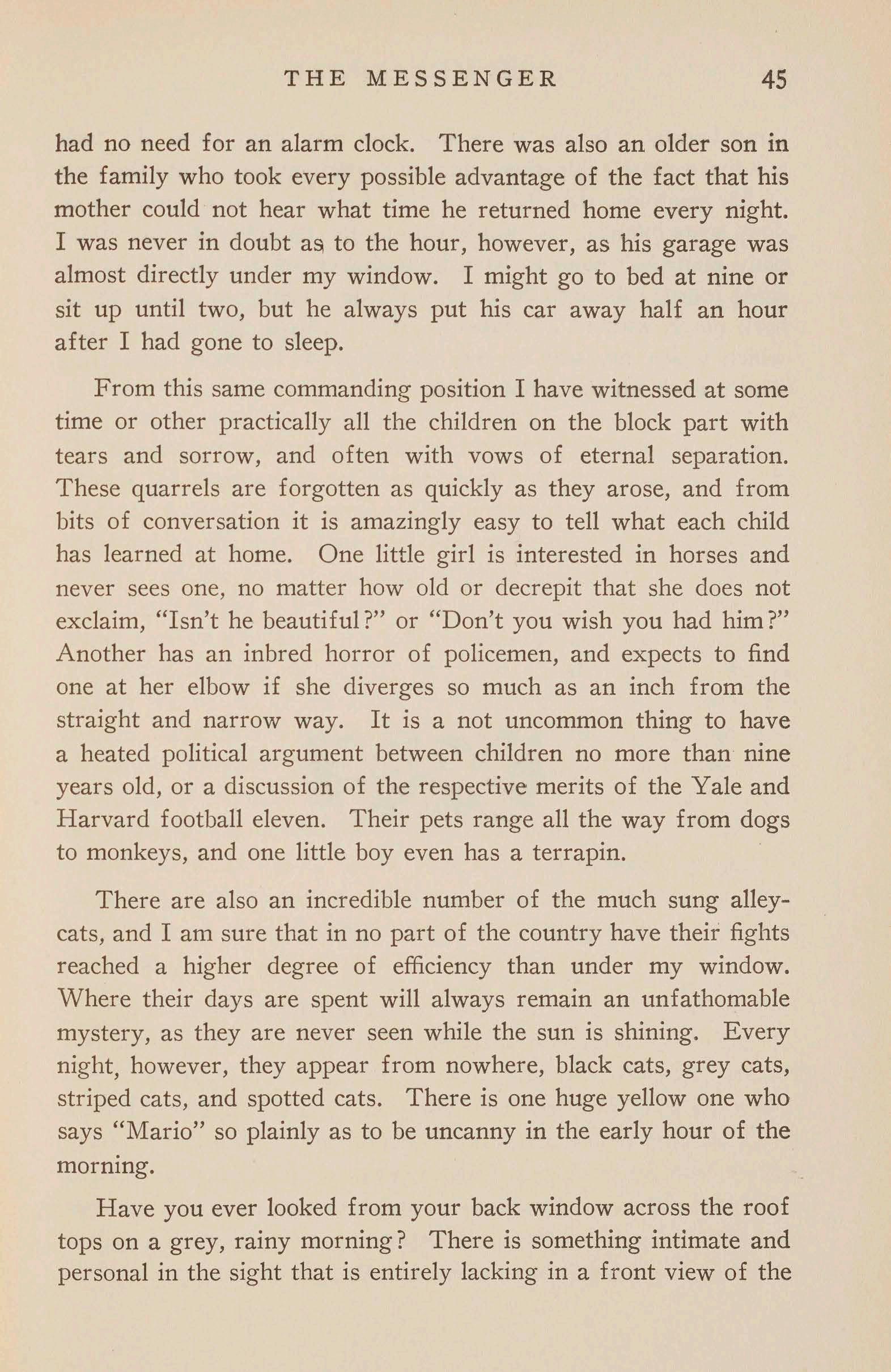
had no need for an alarm clock. There was also an older son in the family who took every possible advantage of the fact that his mother could not hear what time he returned home every night. I was never in doubt a~ to the hour, however, as his garage was almost directly under my window. I might go to bed at nine or sit up until two, but he always put his car away half an hour after I had gone to sleep.
From this same commanding position I have witnessed at some time or other practically all the children on the block part with tears and sorrow, and often with vows of eternal separation. These quarrels are forgotten as quickly as they arose, and from bits of conversation it is amazingly easy to tell what each child has learned at home. One little girl is interested in horses and never sees on e, no matter how old or decrepit that she does not exclaim, "Isn't he beautiful?" or "Don't you wish you had him?" Another has an inbred horror of policemen, and expects to find one at her elbow if she diverges so much as an inch from the straight and narrow way. It is a not uncommon thing to have a heated political argument between children no more than nine years old, or a discussion of the respective merits of the Yale and Harvard football eleven. Their pets range all the way from dogs to monkeys, and one little boy even has a terrapin.
There are also an incredible number of the much sung alleycats, and I am sure that in no part of the country have their fights reached a higher degree of efficiency than under my window. Where their days are spent will always remain an unfathomable mystery, as they are never seen while the sun is shining. Every night, however, they appear from nowhere, black cats, grey cats, striped cats, and spotted cats. There is one huge yellow one who says "Mario" so plainly as to be uncanny in the early hour of the morning.
Have you ever looked from your back window across the roof tops on a grey, rainy morning? There is something intimate and personal in the sight that is entirely lacking in a front view of the
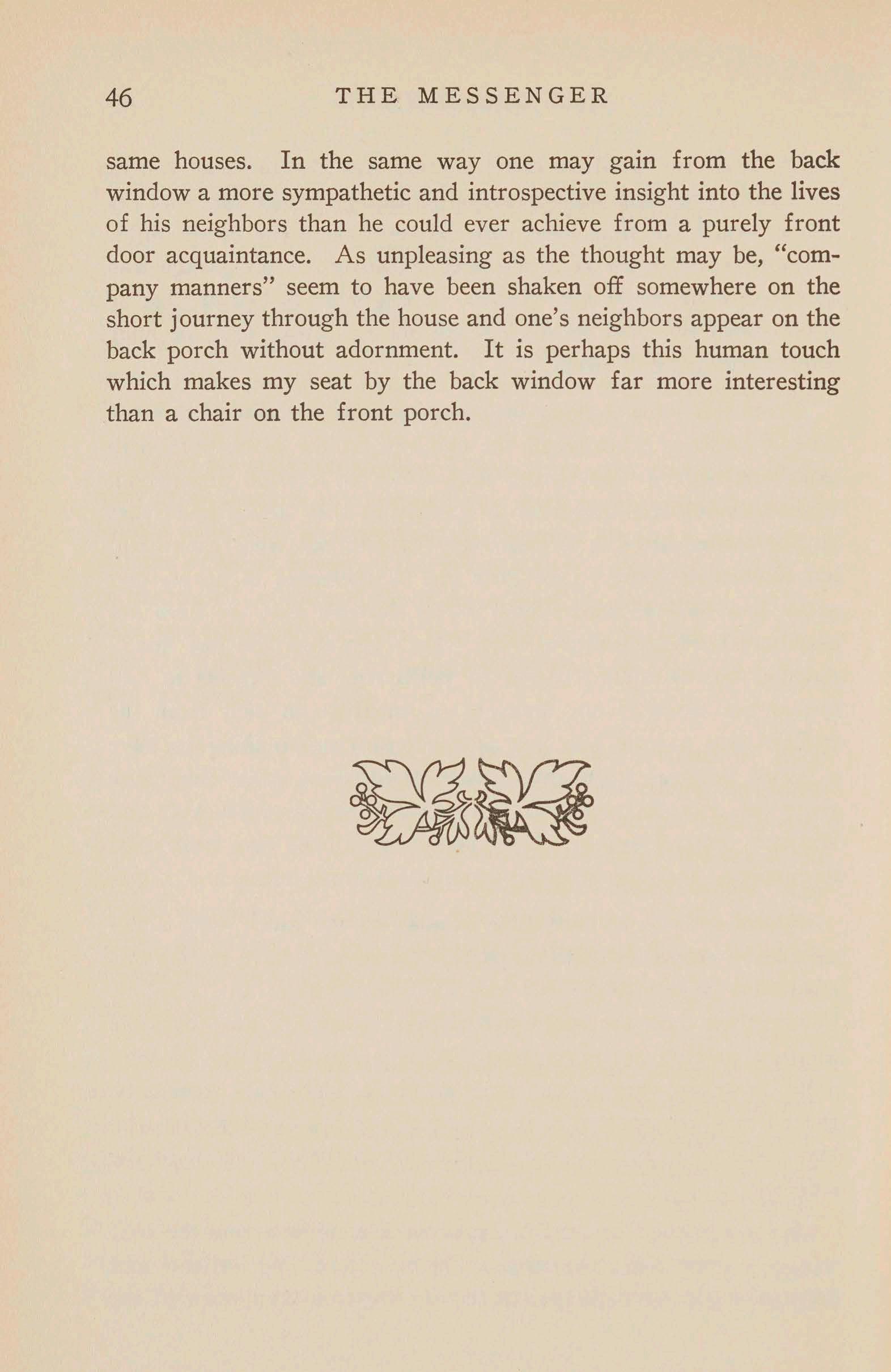
same houses. In the same way one may gain from the back window a more sympathetic and introspective insight into the lives of his neighbors than he could ever achieve from a purely front door acquaintance. As unpleasing as the thought may be, "company manners" seem to have been shaken off somewhere on the short journey through the house and one's neighbors appear on the back porch without adornment. It is perhaps this human touch which makes my seat by the back window far more interesting than a chair on the front porch.
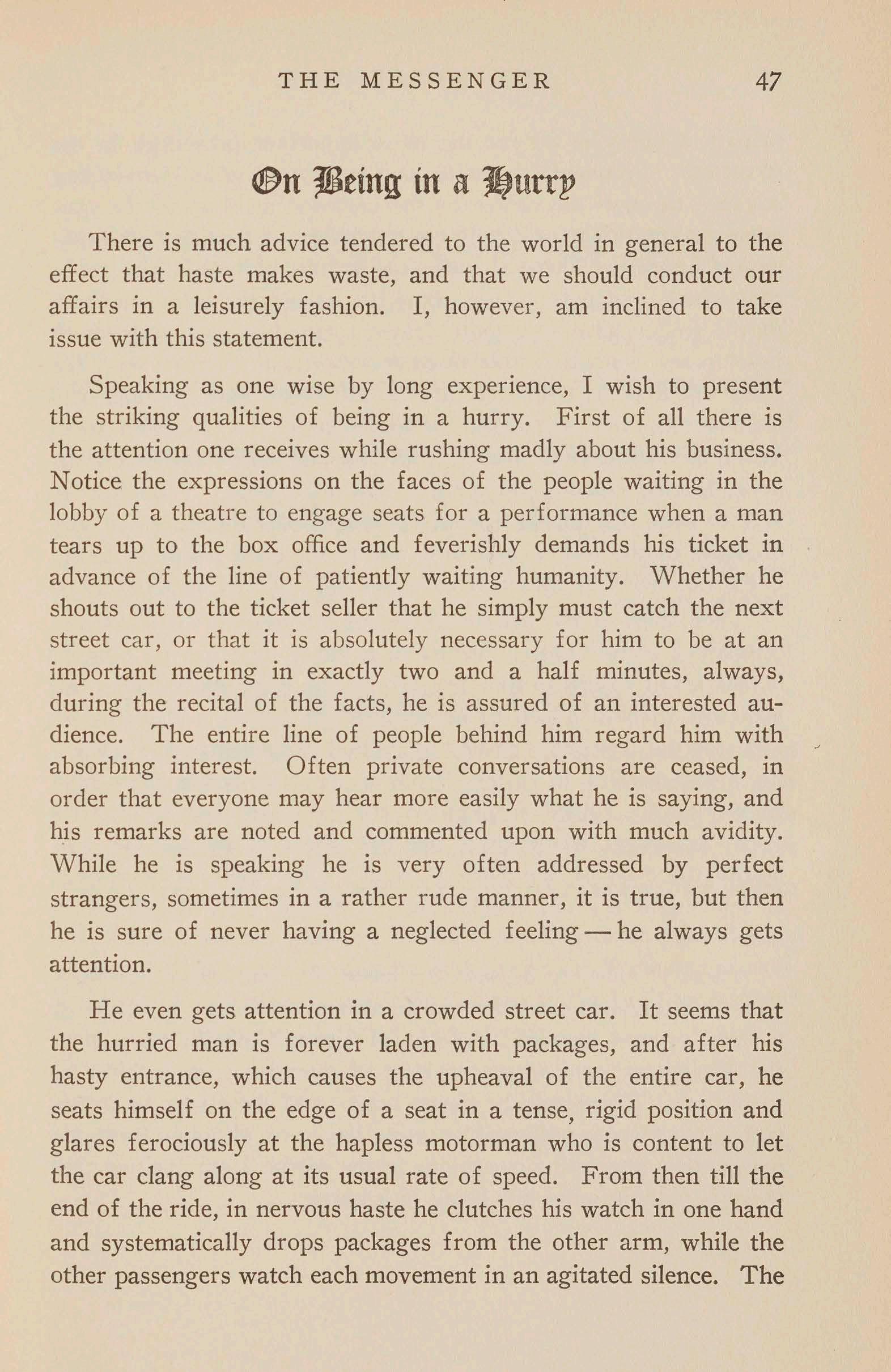
<!&n,Sting in a l}urrp
There is much advice tendered to the world in general to the effect that haste makes waste, and that we should conduct our affairs in a leisurely fashion. I, however, am inclined to take issue with this statement.
Speaking as one wise by long experience, I wish to present the striking qualities of being in a hurry. First of all there is the attention one receives while rushing madly about his business. Notice the expressions on the faces of the people waiting in the lobby of a theatre to engage seats for a performance when a man tears up to the box office and feverishly demands his ticket in advance of the line of patiently waiting humanity. Whether he shouts out to the ticket seller that he simply must catch the next street car, or that it is absolutely necessary for him to be at an important meeting in exactly two and a half minutes, always, during the recital of the facts, he is assured of an interested audience. The entire line of people behind him regard him with absorbing interest. Often private conversations are ceased, in order that everyone may hear more easily what he is saying, and his remarks are noted and commented upon with much avidity. While he is speaking he is very often addressed by perfect strangers, sometimes in a rather rude manner, it is true, but then he is sure of never having a neglected feeling -he always gets attention.
He even gets attention in a crowded street car. It seems that the hurried man is forever laden with packages, and after his hasty entrance, which causes the upheaval of the entire car, he seats himself on the edge of a seat in a tense, rigid position and glares ferociously at the hapless motorman who is content to let the car clang along at its usual rate of speed. From then till the end of the ride, in nervous haste he clutches his watch in one hand and systematically drops packages from the other arm, while the other passengers watch each movement in an agitated silence. The
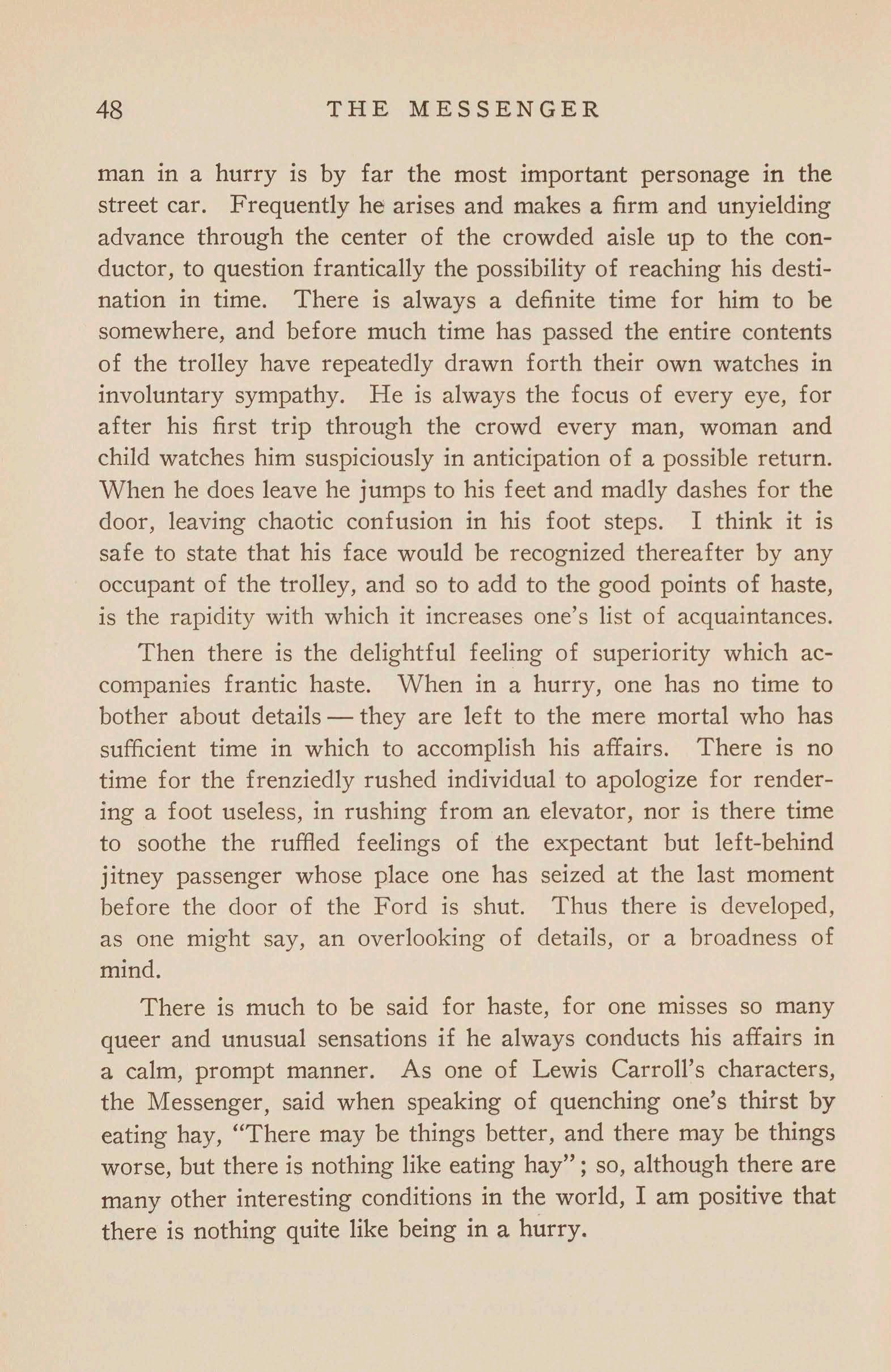
man in a hurry is by far the most important personage in the street car. Frequently he arises and makes a firm and unyielding advance through the center of the crowded aisle up to the conductor, to question frantically the possibility of reaching his destination in time. There is always a definite time for him to be somewhere, and before much time has passed the entire contents of the trolley have repeatedly drawn forth their own watches in involuntary sympathy. He is always the focus of every eye, for after his first trip through the crowd every man, woman and child watches him suspiciously in anticipation of a possible return. When he does leave he jumps to his feet and madly dashes for the door, leaving chaotic confusion in his foot steps. I think it is safe to state that his face would be recognized thereafter by any occupant of the trolley, and so to add to the good points of haste, is the rapidity with which it increa ses one's list of acquaintances. Then there is the delightful feeling of superiority which accompanies frantic haste. When in a hurry, one has no time to bother about details -they are left to the mere mortal who has sufficient time in which to accomplish his affairs. There is no time for the frenziedly rushed individual to apologize for rendering a foot useless, in rushing from an elevator, nor is there time to soothe the ruffled feelings of the expectant but left-behind jitney passenger whose place one has seized at the last moment before the door of the Ford is shut. Thus there is d ev eloped, as one might say, an overlooking of details, or a broadness of mind.
There is much to be said for haste, for one misses so many queer and unusual sensations if he always conducts his affairs in a calm, prompt manner. As one of Lewis Carroll's characters, the Messenger, said when speaking of quenching one's thirst by eating hay, "There may be things better, and there may be things worse, but there is nothing like eating hay"; so, although there are many other interesting conditions in the world, I am positive that there is nothing quite like being in a hurry.
